
Research Topics & Ideas: Education
170+ Research Ideas To Fast-Track Your Project

If you’re just starting out exploring education-related topics for your dissertation, thesis or research project, you’ve come to the right place. In this post, we’ll help kickstart your research topic ideation process by providing a hearty list of research topics and ideas , including examples from actual dissertations and theses..
PS – This is just the start…
We know it’s exciting to run through a list of research topics, but please keep in mind that this list is just a starting point . To develop a suitable education-related research topic, you’ll need to identify a clear and convincing research gap , and a viable plan of action to fill that gap.
If this sounds foreign to you, check out our free research topic webinar that explores how to find and refine a high-quality research topic, from scratch. Alternatively, if you’d like hands-on help, consider our 1-on-1 coaching service .
Overview: Education Research Topics
- How to find a research topic (video)
- List of 50+ education-related research topics/ideas
- List of 120+ level-specific research topics
- Examples of actual dissertation topics in education
- Tips to fast-track your topic ideation (video)
- Free Webinar : Topic Ideation 101
- Where to get extra help
Education-Related Research Topics & Ideas
Below you’ll find a list of education-related research topics and idea kickstarters. These are fairly broad and flexible to various contexts, so keep in mind that you will need to refine them a little. Nevertheless, they should inspire some ideas for your project.
- The impact of school funding on student achievement
- The effects of social and emotional learning on student well-being
- The effects of parental involvement on student behaviour
- The impact of teacher training on student learning
- The impact of classroom design on student learning
- The impact of poverty on education
- The use of student data to inform instruction
- The role of parental involvement in education
- The effects of mindfulness practices in the classroom
- The use of technology in the classroom
- The role of critical thinking in education
- The use of formative and summative assessments in the classroom
- The use of differentiated instruction in the classroom
- The use of gamification in education
- The effects of teacher burnout on student learning
- The impact of school leadership on student achievement
- The effects of teacher diversity on student outcomes
- The role of teacher collaboration in improving student outcomes
- The implementation of blended and online learning
- The effects of teacher accountability on student achievement
- The effects of standardized testing on student learning
- The effects of classroom management on student behaviour
- The effects of school culture on student achievement
- The use of student-centred learning in the classroom
- The impact of teacher-student relationships on student outcomes
- The achievement gap in minority and low-income students
- The use of culturally responsive teaching in the classroom
- The impact of teacher professional development on student learning
- The use of project-based learning in the classroom
- The effects of teacher expectations on student achievement
- The use of adaptive learning technology in the classroom
- The impact of teacher turnover on student learning
- The effects of teacher recruitment and retention on student learning
- The impact of early childhood education on later academic success
- The impact of parental involvement on student engagement
- The use of positive reinforcement in education
- The impact of school climate on student engagement
- The role of STEM education in preparing students for the workforce
- The effects of school choice on student achievement
- The use of technology in the form of online tutoring
Level-Specific Research Topics
Looking for research topics for a specific level of education? We’ve got you covered. Below you can find research topic ideas for primary, secondary and tertiary-level education contexts. Click the relevant level to view the respective list.
Research Topics: Pick An Education Level
Primary education.
- Investigating the effects of peer tutoring on academic achievement in primary school
- Exploring the benefits of mindfulness practices in primary school classrooms
- Examining the effects of different teaching strategies on primary school students’ problem-solving skills
- The use of storytelling as a teaching strategy in primary school literacy instruction
- The role of cultural diversity in promoting tolerance and understanding in primary schools
- The impact of character education programs on moral development in primary school students
- Investigating the use of technology in enhancing primary school mathematics education
- The impact of inclusive curriculum on promoting equity and diversity in primary schools
- The impact of outdoor education programs on environmental awareness in primary school students
- The influence of school climate on student motivation and engagement in primary schools
- Investigating the effects of early literacy interventions on reading comprehension in primary school students
- The impact of parental involvement in school decision-making processes on student achievement in primary schools
- Exploring the benefits of inclusive education for students with special needs in primary schools
- Investigating the effects of teacher-student feedback on academic motivation in primary schools
- The role of technology in developing digital literacy skills in primary school students
- Effective strategies for fostering a growth mindset in primary school students
- Investigating the role of parental support in reducing academic stress in primary school children
- The role of arts education in fostering creativity and self-expression in primary school students
- Examining the effects of early childhood education programs on primary school readiness
- Examining the effects of homework on primary school students’ academic performance
- The role of formative assessment in improving learning outcomes in primary school classrooms
- The impact of teacher-student relationships on academic outcomes in primary school
- Investigating the effects of classroom environment on student behavior and learning outcomes in primary schools
- Investigating the role of creativity and imagination in primary school curriculum
- The impact of nutrition and healthy eating programs on academic performance in primary schools
- The impact of social-emotional learning programs on primary school students’ well-being and academic performance
- The role of parental involvement in academic achievement of primary school children
- Examining the effects of classroom management strategies on student behavior in primary school
- The role of school leadership in creating a positive school climate Exploring the benefits of bilingual education in primary schools
- The effectiveness of project-based learning in developing critical thinking skills in primary school students
- The role of inquiry-based learning in fostering curiosity and critical thinking in primary school students
- The effects of class size on student engagement and achievement in primary schools
- Investigating the effects of recess and physical activity breaks on attention and learning in primary school
- Exploring the benefits of outdoor play in developing gross motor skills in primary school children
- The effects of educational field trips on knowledge retention in primary school students
- Examining the effects of inclusive classroom practices on students’ attitudes towards diversity in primary schools
- The impact of parental involvement in homework on primary school students’ academic achievement
- Investigating the effectiveness of different assessment methods in primary school classrooms
- The influence of physical activity and exercise on cognitive development in primary school children
- Exploring the benefits of cooperative learning in promoting social skills in primary school students
Secondary Education
- Investigating the effects of school discipline policies on student behavior and academic success in secondary education
- The role of social media in enhancing communication and collaboration among secondary school students
- The impact of school leadership on teacher effectiveness and student outcomes in secondary schools
- Investigating the effects of technology integration on teaching and learning in secondary education
- Exploring the benefits of interdisciplinary instruction in promoting critical thinking skills in secondary schools
- The impact of arts education on creativity and self-expression in secondary school students
- The effectiveness of flipped classrooms in promoting student learning in secondary education
- The role of career guidance programs in preparing secondary school students for future employment
- Investigating the effects of student-centered learning approaches on student autonomy and academic success in secondary schools
- The impact of socio-economic factors on educational attainment in secondary education
- Investigating the impact of project-based learning on student engagement and academic achievement in secondary schools
- Investigating the effects of multicultural education on cultural understanding and tolerance in secondary schools
- The influence of standardized testing on teaching practices and student learning in secondary education
- Investigating the effects of classroom management strategies on student behavior and academic engagement in secondary education
- The influence of teacher professional development on instructional practices and student outcomes in secondary schools
- The role of extracurricular activities in promoting holistic development and well-roundedness in secondary school students
- Investigating the effects of blended learning models on student engagement and achievement in secondary education
- The role of physical education in promoting physical health and well-being among secondary school students
- Investigating the effects of gender on academic achievement and career aspirations in secondary education
- Exploring the benefits of multicultural literature in promoting cultural awareness and empathy among secondary school students
- The impact of school counseling services on student mental health and well-being in secondary schools
- Exploring the benefits of vocational education and training in preparing secondary school students for the workforce
- The role of digital literacy in preparing secondary school students for the digital age
- The influence of parental involvement on academic success and well-being of secondary school students
- The impact of social-emotional learning programs on secondary school students’ well-being and academic success
- The role of character education in fostering ethical and responsible behavior in secondary school students
- Examining the effects of digital citizenship education on responsible and ethical technology use among secondary school students
- The impact of parental involvement in school decision-making processes on student outcomes in secondary schools
- The role of educational technology in promoting personalized learning experiences in secondary schools
- The impact of inclusive education on the social and academic outcomes of students with disabilities in secondary schools
- The influence of parental support on academic motivation and achievement in secondary education
- The role of school climate in promoting positive behavior and well-being among secondary school students
- Examining the effects of peer mentoring programs on academic achievement and social-emotional development in secondary schools
- Examining the effects of teacher-student relationships on student motivation and achievement in secondary schools
- Exploring the benefits of service-learning programs in promoting civic engagement among secondary school students
- The impact of educational policies on educational equity and access in secondary education
- Examining the effects of homework on academic achievement and student well-being in secondary education
- Investigating the effects of different assessment methods on student performance in secondary schools
- Examining the effects of single-sex education on academic performance and gender stereotypes in secondary schools
- The role of mentoring programs in supporting the transition from secondary to post-secondary education
Tertiary Education
- The role of student support services in promoting academic success and well-being in higher education
- The impact of internationalization initiatives on students’ intercultural competence and global perspectives in tertiary education
- Investigating the effects of active learning classrooms and learning spaces on student engagement and learning outcomes in tertiary education
- Exploring the benefits of service-learning experiences in fostering civic engagement and social responsibility in higher education
- The influence of learning communities and collaborative learning environments on student academic and social integration in higher education
- Exploring the benefits of undergraduate research experiences in fostering critical thinking and scientific inquiry skills
- Investigating the effects of academic advising and mentoring on student retention and degree completion in higher education
- The role of student engagement and involvement in co-curricular activities on holistic student development in higher education
- The impact of multicultural education on fostering cultural competence and diversity appreciation in higher education
- The role of internships and work-integrated learning experiences in enhancing students’ employability and career outcomes
- Examining the effects of assessment and feedback practices on student learning and academic achievement in tertiary education
- The influence of faculty professional development on instructional practices and student outcomes in tertiary education
- The influence of faculty-student relationships on student success and well-being in tertiary education
- The impact of college transition programs on students’ academic and social adjustment to higher education
- The impact of online learning platforms on student learning outcomes in higher education
- The impact of financial aid and scholarships on access and persistence in higher education
- The influence of student leadership and involvement in extracurricular activities on personal development and campus engagement
- Exploring the benefits of competency-based education in developing job-specific skills in tertiary students
- Examining the effects of flipped classroom models on student learning and retention in higher education
- Exploring the benefits of online collaboration and virtual team projects in developing teamwork skills in tertiary students
- Investigating the effects of diversity and inclusion initiatives on campus climate and student experiences in tertiary education
- The influence of study abroad programs on intercultural competence and global perspectives of college students
- Investigating the effects of peer mentoring and tutoring programs on student retention and academic performance in tertiary education
- Investigating the effectiveness of active learning strategies in promoting student engagement and achievement in tertiary education
- Investigating the effects of blended learning models and hybrid courses on student learning and satisfaction in higher education
- The role of digital literacy and information literacy skills in supporting student success in the digital age
- Investigating the effects of experiential learning opportunities on career readiness and employability of college students
- The impact of e-portfolios on student reflection, self-assessment, and showcasing of learning in higher education
- The role of technology in enhancing collaborative learning experiences in tertiary classrooms
- The impact of research opportunities on undergraduate student engagement and pursuit of advanced degrees
- Examining the effects of competency-based assessment on measuring student learning and achievement in tertiary education
- Examining the effects of interdisciplinary programs and courses on critical thinking and problem-solving skills in college students
- The role of inclusive education and accessibility in promoting equitable learning experiences for diverse student populations
- The role of career counseling and guidance in supporting students’ career decision-making in tertiary education
- The influence of faculty diversity and representation on student success and inclusive learning environments in higher education

Education-Related Dissertations & Theses
While the ideas we’ve presented above are a decent starting point for finding a research topic in education, they are fairly generic and non-specific. So, it helps to look at actual dissertations and theses in the education space to see how this all comes together in practice.
Below, we’ve included a selection of education-related research projects to help refine your thinking. These are actual dissertations and theses, written as part of Master’s and PhD-level programs, so they can provide some useful insight as to what a research topic looks like in practice.
- From Rural to Urban: Education Conditions of Migrant Children in China (Wang, 2019)
- Energy Renovation While Learning English: A Guidebook for Elementary ESL Teachers (Yang, 2019)
- A Reanalyses of Intercorrelational Matrices of Visual and Verbal Learners’ Abilities, Cognitive Styles, and Learning Preferences (Fox, 2020)
- A study of the elementary math program utilized by a mid-Missouri school district (Barabas, 2020)
- Instructor formative assessment practices in virtual learning environments : a posthumanist sociomaterial perspective (Burcks, 2019)
- Higher education students services: a qualitative study of two mid-size universities’ direct exchange programs (Kinde, 2020)
- Exploring editorial leadership : a qualitative study of scholastic journalism advisers teaching leadership in Missouri secondary schools (Lewis, 2020)
- Selling the virtual university: a multimodal discourse analysis of marketing for online learning (Ludwig, 2020)
- Advocacy and accountability in school counselling: assessing the use of data as related to professional self-efficacy (Matthews, 2020)
- The use of an application screening assessment as a predictor of teaching retention at a midwestern, K-12, public school district (Scarbrough, 2020)
- Core values driving sustained elite performance cultures (Beiner, 2020)
- Educative features of upper elementary Eureka math curriculum (Dwiggins, 2020)
- How female principals nurture adult learning opportunities in successful high schools with challenging student demographics (Woodward, 2020)
- The disproportionality of Black Males in Special Education: A Case Study Analysis of Educator Perceptions in a Southeastern Urban High School (McCrae, 2021)
As you can see, these research topics are a lot more focused than the generic topic ideas we presented earlier. So, in order for you to develop a high-quality research topic, you’ll need to get specific and laser-focused on a specific context with specific variables of interest. In the video below, we explore some other important things you’ll need to consider when crafting your research topic.
Get 1-On-1 Help
If you’re still unsure about how to find a quality research topic within education, check out our Research Topic Kickstarter service, which is the perfect starting point for developing a unique, well-justified research topic.

You Might Also Like:

54 Comments
This is an helpful tool 🙏
Special education
Really appreciated by this . It is the best platform for research related items
Research title related to school of students
Research title related to students
Good idea I’m going to teach my colleagues
You can find our list of nursing-related research topic ideas here: https://gradcoach.com/research-topics-nursing/
Write on action research topic, using guidance and counseling to address unwanted teenage pregnancy in school
Thanks a lot
I learned a lot from this site, thank you so much!
Thank you for the information.. I would like to request a topic based on school major in social studies
parental involvement and students academic performance
Science education topics?
How about School management and supervision pls.?
Hi i am an Deputy Principal in a primary school. My wish is to srudy foe Master’s degree in Education.Please advice me on which topic can be relevant for me. Thanks.
Every topic proposed above on primary education is a starting point for me. I appreciate immensely the team that has sat down to make a detail of these selected topics just for beginners like us. Be blessed.
Kindly help me with the research questions on the topic” Effects of workplace conflict on the employees’ job performance”. The effects can be applicable in every institution,enterprise or organisation.
Greetings, I am a student majoring in Sociology and minoring in Public Administration. I’m considering any recommended research topic in the field of Sociology.
I’m a student pursuing Mphil in Basic education and I’m considering any recommended research proposal topic in my field of study
Kindly help me with a research topic in educational psychology. Ph.D level. Thank you.
Project-based learning is a teaching/learning type,if well applied in a classroom setting will yield serious positive impact. What can a teacher do to implement this in a disadvantaged zone like “North West Region of Cameroon ( hinterland) where war has brought about prolonged and untold sufferings on the indegins?
I wish to get help on topics of research on educational administration
I wish to get help on topics of research on educational administration PhD level
I am also looking for such type of title
I am a student of undergraduate, doing research on how to use guidance and counseling to address unwanted teenage pregnancy in school
the topics are very good regarding research & education .
Can i request your suggestion topic for my Thesis about Teachers as an OFW. thanx you
Would like to request for suggestions on a topic in Economics of education,PhD level
Would like to request for suggestions on a topic in Economics of education
Hi 👋 I request that you help me with a written research proposal about education the format
l would like to request suggestions on a topic in managing teaching and learning, PhD level (educational leadership and management)
request suggestions on a topic in managing teaching and learning, PhD level (educational leadership and management)
I would to inquire on research topics on Educational psychology, Masters degree
I am PhD student, I am searching my Research topic, It should be innovative,my area of interest is online education,use of technology in education
request suggestion on topic in masters in medical education .
Look at British Library as they keep a copy of all PhDs in the UK Core.ac.uk to access Open University and 6 other university e-archives, pdf downloads mostly available, all free.
May I also ask for a topic based on mathematics education for college teaching, please?
Please I am a masters student of the department of Teacher Education, Faculty of Education Please I am in need of proposed project topics to help with my final year thesis
Am a PhD student in Educational Foundations would like a sociological topic. Thank
please i need a proposed thesis project regardging computer science
Greetings and Regards I am a doctoral student in the field of philosophy of education. I am looking for a new topic for my thesis. Because of my work in the elementary school, I am looking for a topic that is from the field of elementary education and is related to the philosophy of education.
Masters student in the field of curriculum, any ideas of a research topic on low achiever students
In the field of curriculum any ideas of a research topic on deconalization in contextualization of digital teaching and learning through in higher education
Amazing guidelines
I am a graduate with two masters. 1) Master of arts in religious studies and 2) Master in education in foundations of education. I intend to do a Ph.D. on my second master’s, however, I need to bring both masters together through my Ph.D. research. can I do something like, ” The contribution of Philosophy of education for a quality religion education in Kenya”? kindly, assist and be free to suggest a similar topic that will bring together the two masters. thanks in advance
Hi, I am an Early childhood trainer as well as a researcher, I need more support on this topic: The impact of early childhood education on later academic success.
Submit a Comment Cancel reply
Your email address will not be published. Required fields are marked *
Save my name, email, and website in this browser for the next time I comment.
- Print Friendly
- Write my thesis
- Thesis writers
- Buy thesis papers
- Bachelor thesis
- Master's thesis
- Thesis editing services
- Thesis proofreading services
- Buy a thesis online
- Write my dissertation
- Dissertation proposal help
- Pay for dissertation
- Custom dissertation
- Dissertation help online
- Buy dissertation online
- Cheap dissertation
- Dissertation editing services
- Write my research paper
- Buy research paper online
- Pay for research paper
- Research paper help
- Order research paper
- Custom research paper
- Cheap research paper
- Research papers for sale
- Thesis subjects
- How It Works
110+ Exceptional Education Research Topics Ideas

Topics for education research usually comprise school research topics, research problems in education, qualitative research topics in education, and concept paper topics about education to mention a few.
If you’re looking for research titles about education, you’re reading the right post! This article contains 110 of the best education research topics that will come in handy when you need to choose one for your research. From sample research topics in education, to research titles examples for high school students about education – we have it all.
Educational Research Topics
Research title examples for college students, quantitative research titles about education, topics related to education for thesis, research titles about school issues, ph.d. research titles in education, elementary education research topics, research title examples about online class, research titles about modular learning, examples of research questions in education, special education research titles.
The best research titles about education must be done through the detailed process of exploring previous works and improving personal knowledge.
Here are some good research topics in education to consider.
What Are Good Research Topics Related to Education?
- The role of Covid-19 in reinvigorating online learning
- The growth of cognitive abilities through leisure experiences
- The merits of group study in education
- Merits and demerits of traditional learning methods
- The impact of homework on traditional and modern education
- Student underdevelopment as a result of larger class volumes
- Advantages of digital textbooks in learning
- The struggle of older generations in computer education
- The standards of learning in the various academic levels
- Bullying and its effects on educational and mental health
- Exceptional education tutors: Is the need for higher pay justifiable?
The following examples of research titles about education for college students are ideal for a project that will take a long duration to complete. Here are some education topics for research that you can consider for your degree.
- Modern classroom difficulties of students and teachers
- Strategies to reform the learning difficulties within schools
- The rising cost of tuition and its burden on middle-class parents
- The concept of creativity among public schools and how it can be harnessed
- Major difficulties experienced in academic staff training
- Evaluating the learning cultures of college students
- Use of scientific development techniques in student learning
- Research of skill development in high school and college students
- Modern grading methods in underdeveloped institutions
- Dissertations and the difficulties surrounding their completion
- Integration of new gender categories in personalized learning
These research topics about education require a direct quantitative analysis and study of major ideas and arguments. They often contain general statistics and figures to back up regular research. Some of such research topics in education include:
- The relationship between poor education and increased academic fees
- Creating a social link between homeschool and traditional schoolgoers
- The relationship between teacher satisfaction and student performance
- The divide between public and private school performance
- The merits of parental involvement in students’ cognitive growth.
- A study on child welfare and its impact on educational development
- The relationship between academic performance and economic growth
- Urbanization in rural areas and its contribution to institutional growth
- The relationship between students and professors in dissertation writing
- The link between debt accumulation and student loans
- Boarding schools and regular schools: The role these two school types play in cognitive development
Educational-related topics used for a thesis normally require a wide aspect of study and enough educational materials. Here are some education research topics you can use for write my thesis .
- The difficulties of bilingual education in private universities
- Homework and its impact on learning processes in college education
- Dissertation topic selection: Key aspects and research obligations
- Social media research topics and their educational functions
- A detailed educational review of student learning via virtual reality techniques
- Ethnicities in universities and their participation in group activities
- The modern approach to self-studying for college students
- Developing time management skills in modern education
- Guidelines for teacher development in advanced educational institutions
- The need for religious education in boarding schools
- A measure of cognitive development using digital learning methods
A research title about school issues focuses on activities surrounding the school environment and its effects on students, teachers, parents, and education in general. Below are some sample research titles in education, relating to school issues.
- Learning English in bilingual schools
- A study of teachers’ role as parent figures on school grounds
- Addressing the increased use of illegal substances and their effects in schools
- The benefits of after-class activities for foreign students
- Assessing student and teacher relationships
- A study of the best methods to implement safety rules in school
- Major obstacles in meeting school schedules using boarding students as a case study
- The need for counseling in public and private schools: Which is greater?
- Academic volunteering in understaffed public schools
- Modern techniques for curbing school violence among college students
- The advantages and disadvantages of teacher unions in schools
As you create your proposed list of research topics in education, consider scientific journals for referencing purposes. Here are some Ph.D. research titles for education.
- The modern methods of academic research writing
- The role of colleges in advanced mental care
- The merits and demerits of Ph.D. studies in Europe and Africa
- Interpersonal relationships between students and professors in advanced institutions
- A review of community colleges: merits and demerits
- Assessing racism in academic ethnic minorities
- The psychological changes of students in higher education
- The questionable standards of student loan provisions
- The merits of personalized teaching techniques in colleges
- The wage gap between private and public university teachers
- Teacher responsibilities in private universities versus public universities
The research topics in elementary education in 2023 are very different from the elementary education research topics from five or ten years ago. This creates interesting grounds for different research titles for elementary education.
Here are some elementary education title research ideas.
- Assessing quick computer literacy among elementary school pupils.
- The role of video games in childhood brain development
- Male vs female role models in early education periods
- The advantages of digital textbooks in elementary schools
- The impact of modern curriculums on elementary education
- Lack of proper school grooming is a cause of violence.
- Should elementary school children be taught about LGBTQ?
- A review of the need for sexual education in elementary schools
- The effects of emotional dependence in early childhood learners.
- The need for constant technology supervision of elementary school students
- Advantages of computer-guided education in elementary schools
Here are some research title examples for students taking online classes.
- The academic difficulties experienced by online students.
- A study of decreased attention in online classes
- The upsides and downsides of online education
- The rising fees of online and traditional education in universities
- A detailed study on the necessity of college internships
- The need to provide college scholarships based on environmental achievements
- How online education terminates university fraternities and sororities.
- The role of academic supervisors in career selection
- Why interactive assignments improved learning capabilities during the pandemic
- Merits of education in online learning environments
- Why online lessons are the least effective for some college students
The modular learning approach focuses primarily on learning outcomes. Here are some examples of research titles about modular learning.
- Modular learning and the role of teachers in its execution
- Teaching techniques of religious institutions
- Potential risks of accelerated learning
- Modular learning on students’ future performances
- The general overview of modular learning amongst students
- The modern Advantages and disadvantages of inclusive classes
- Observing student developments in modular learning
- Music therapy for fostering modular learning techniques
- The creation of a personalized curriculum for students.
- Applications of modular learning both in home-schooling?
- The benefits of modular learning towards creating a more holistic educational system
These research title examples about education answer important questions and they can also be argumentative essay topics .
Here are some titles of research about education questions.
- What impacts do learning approaches provide for students?
- How can schools manage their increasing gender differences?
- What fosters the provision of learning needs?
- What are the best educational recruitment methods?
- How can cognitive development improve education?
- How can you assess the moral growth of institutions?
- What are the primary causes of educational differences in geographical locations?
- How can institutions address increasing mental health needs?
- Why is early intervention essential in students with mental health setbacks?
- What are the characteristics of mental health deterioration among students?
- What techniques are acceptable in regulating the violence of students in institutions
Some of the research title examples about education include:
- How do schools create more personalized learning methods?
- Evaluating mental health setbacks during education
- The impact of modern technology on special education
- The cognitive improvements via specialized learning in dyslexic children
- The psychological link between dyslexia and bullying in high school
- Impact of social isolation in special education classes
- The difficulties in providing specialized learning environments
- A study of orphan students with disabilities and their aptitudes for learning
- How special classes improve the self-esteem of disabled students.
- How to use modern teaching techniques in unique learning environments.
- A study of the application of digital games to autistic learning
Final words about education research topics
We have provided some reliable examples of a research topic about education you can use for write my thesis . You can use these research titles in education to cultivate your ideas, create inspiration, or for online research. Remember always to select a topic that you’re naturally passionate about and do diligent research, and reach out to our professional writing services if you need any help.
Leave a Reply Cancel reply
- Our Mission

The 10 Most Significant Education Studies of 2021
From reframing our notion of “good” schools to mining the magic of expert teachers, here’s a curated list of must-read research from 2021.
It was a year of unprecedented hardship for teachers and school leaders. We pored through hundreds of studies to see if we could follow the trail of exactly what happened: The research revealed a complex portrait of a grueling year during which persistent issues of burnout and mental and physical health impacted millions of educators. Meanwhile, many of the old debates continued: Does paper beat digital? Is project-based learning as effective as direct instruction? How do you define what a “good” school is?
Other studies grabbed our attention, and in a few cases, made headlines. Researchers from the University of Chicago and Columbia University turned artificial intelligence loose on some 1,130 award-winning children’s books in search of invisible patterns of bias. (Spoiler alert: They found some.) Another study revealed why many parents are reluctant to support social and emotional learning in schools—and provided hints about how educators can flip the script.
1. What Parents Fear About SEL (and How to Change Their Minds)
When researchers at the Fordham Institute asked parents to rank phrases associated with social and emotional learning , nothing seemed to add up. The term “social-emotional learning” was very unpopular; parents wanted to steer their kids clear of it. But when the researchers added a simple clause, forming a new phrase—”social-emotional & academic learning”—the program shot all the way up to No. 2 in the rankings.
What gives?
Parents were picking up subtle cues in the list of SEL-related terms that irked or worried them, the researchers suggest. Phrases like “soft skills” and “growth mindset” felt “nebulous” and devoid of academic content. For some, the language felt suspiciously like “code for liberal indoctrination.”
But the study suggests that parents might need the simplest of reassurances to break through the political noise. Removing the jargon, focusing on productive phrases like “life skills,” and relentlessly connecting SEL to academic progress puts parents at ease—and seems to save social and emotional learning in the process.
2. The Secret Management Techniques of Expert Teachers
In the hands of experienced teachers, classroom management can seem almost invisible: Subtle techniques are quietly at work behind the scenes, with students falling into orderly routines and engaging in rigorous academic tasks almost as if by magic.
That’s no accident, according to new research . While outbursts are inevitable in school settings, expert teachers seed their classrooms with proactive, relationship-building strategies that often prevent misbehavior before it erupts. They also approach discipline more holistically than their less-experienced counterparts, consistently reframing misbehavior in the broader context of how lessons can be more engaging, or how clearly they communicate expectations.
Focusing on the underlying dynamics of classroom behavior—and not on surface-level disruptions—means that expert teachers often look the other way at all the right times, too. Rather than rise to the bait of a minor breach in etiquette, a common mistake of new teachers, they tend to play the long game, asking questions about the origins of misbehavior, deftly navigating the terrain between discipline and student autonomy, and opting to confront misconduct privately when possible.
3. The Surprising Power of Pretesting
Asking students to take a practice test before they’ve even encountered the material may seem like a waste of time—after all, they’d just be guessing.
But new research concludes that the approach, called pretesting, is actually more effective than other typical study strategies. Surprisingly, pretesting even beat out taking practice tests after learning the material, a proven strategy endorsed by cognitive scientists and educators alike. In the study, students who took a practice test before learning the material outperformed their peers who studied more traditionally by 49 percent on a follow-up test, while outperforming students who took practice tests after studying the material by 27 percent.
The researchers hypothesize that the “generation of errors” was a key to the strategy’s success, spurring student curiosity and priming them to “search for the correct answers” when they finally explored the new material—and adding grist to a 2018 study that found that making educated guesses helped students connect background knowledge to new material.
Learning is more durable when students do the hard work of correcting misconceptions, the research suggests, reminding us yet again that being wrong is an important milestone on the road to being right.
4. Confronting an Old Myth About Immigrant Students
Immigrant students are sometimes portrayed as a costly expense to the education system, but new research is systematically dismantling that myth.
In a 2021 study , researchers analyzed over 1.3 million academic and birth records for students in Florida communities, and concluded that the presence of immigrant students actually has “a positive effect on the academic achievement of U.S.-born students,” raising test scores as the size of the immigrant school population increases. The benefits were especially powerful for low-income students.
While immigrants initially “face challenges in assimilation that may require additional school resources,” the researchers concluded, hard work and resilience may allow them to excel and thus “positively affect exposed U.S.-born students’ attitudes and behavior.” But according to teacher Larry Ferlazzo, the improvements might stem from the fact that having English language learners in classes improves pedagogy , pushing teachers to consider “issues like prior knowledge, scaffolding, and maximizing accessibility.”
5. A Fuller Picture of What a ‘Good’ School Is
It’s time to rethink our definition of what a “good school” is, researchers assert in a study published in late 2020. That’s because typical measures of school quality like test scores often provide an incomplete and misleading picture, the researchers found.
The study looked at over 150,000 ninth-grade students who attended Chicago public schools and concluded that emphasizing the social and emotional dimensions of learning—relationship-building, a sense of belonging, and resilience, for example—improves high school graduation and college matriculation rates for both high- and low-income students, beating out schools that focus primarily on improving test scores.
“Schools that promote socio-emotional development actually have a really big positive impact on kids,” said lead researcher C. Kirabo Jackson in an interview with Edutopia . “And these impacts are particularly large for vulnerable student populations who don’t tend to do very well in the education system.”
The findings reinforce the importance of a holistic approach to measuring student progress, and are a reminder that schools—and teachers—can influence students in ways that are difficult to measure, and may only materialize well into the future.
6. Teaching Is Learning
One of the best ways to learn a concept is to teach it to someone else. But do you actually have to step into the shoes of a teacher, or does the mere expectation of teaching do the trick?
In a 2021 study , researchers split students into two groups and gave them each a science passage about the Doppler effect—a phenomenon associated with sound and light waves that explains the gradual change in tone and pitch as a car races off into the distance, for example. One group studied the text as preparation for a test; the other was told that they’d be teaching the material to another student.
The researchers never carried out the second half of the activity—students read the passages but never taught the lesson. All of the participants were then tested on their factual recall of the Doppler effect, and their ability to draw deeper conclusions from the reading.
The upshot? Students who prepared to teach outperformed their counterparts in both duration and depth of learning, scoring 9 percent higher on factual recall a week after the lessons concluded, and 24 percent higher on their ability to make inferences. The research suggests that asking students to prepare to teach something—or encouraging them to think “could I teach this to someone else?”—can significantly alter their learning trajectories.
7. A Disturbing Strain of Bias in Kids’ Books
Some of the most popular and well-regarded children’s books—Caldecott and Newbery honorees among them—persistently depict Black, Asian, and Hispanic characters with lighter skin, according to new research .
Using artificial intelligence, researchers combed through 1,130 children’s books written in the last century, comparing two sets of diverse children’s books—one a collection of popular books that garnered major literary awards, the other favored by identity-based awards. The software analyzed data on skin tone, race, age, and gender.
Among the findings: While more characters with darker skin color begin to appear over time, the most popular books—those most frequently checked out of libraries and lining classroom bookshelves—continue to depict people of color in lighter skin tones. More insidiously, when adult characters are “moral or upstanding,” their skin color tends to appear lighter, the study’s lead author, Anjali Aduki, told The 74 , with some books converting “Martin Luther King Jr.’s chocolate complexion to a light brown or beige.” Female characters, meanwhile, are often seen but not heard.
Cultural representations are a reflection of our values, the researchers conclude: “Inequality in representation, therefore, constitutes an explicit statement of inequality of value.”
8. The Never-Ending ‘Paper Versus Digital’ War
The argument goes like this: Digital screens turn reading into a cold and impersonal task; they’re good for information foraging, and not much more. “Real” books, meanwhile, have a heft and “tactility” that make them intimate, enchanting—and irreplaceable.
But researchers have often found weak or equivocal evidence for the superiority of reading on paper. While a recent study concluded that paper books yielded better comprehension than e-books when many of the digital tools had been removed, the effect sizes were small. A 2021 meta-analysis further muddies the water: When digital and paper books are “mostly similar,” kids comprehend the print version more readily—but when enhancements like motion and sound “target the story content,” e-books generally have the edge.
Nostalgia is a force that every new technology must eventually confront. There’s plenty of evidence that writing with pen and paper encodes learning more deeply than typing. But new digital book formats come preloaded with powerful tools that allow readers to annotate, look up words, answer embedded questions, and share their thinking with other readers.
We may not be ready to admit it, but these are precisely the kinds of activities that drive deeper engagement, enhance comprehension, and leave us with a lasting memory of what we’ve read. The future of e-reading, despite the naysayers, remains promising.
9. New Research Makes a Powerful Case for PBL
Many classrooms today still look like they did 100 years ago, when students were preparing for factory jobs. But the world’s moved on: Modern careers demand a more sophisticated set of skills—collaboration, advanced problem-solving, and creativity, for example—and those can be difficult to teach in classrooms that rarely give students the time and space to develop those competencies.
Project-based learning (PBL) would seem like an ideal solution. But critics say PBL places too much responsibility on novice learners, ignoring the evidence about the effectiveness of direct instruction and ultimately undermining subject fluency. Advocates counter that student-centered learning and direct instruction can and should coexist in classrooms.
Now two new large-scale studies —encompassing over 6,000 students in 114 diverse schools across the nation—provide evidence that a well-structured, project-based approach boosts learning for a wide range of students.
In the studies, which were funded by Lucas Education Research, a sister division of Edutopia , elementary and high school students engaged in challenging projects that had them designing water systems for local farms, or creating toys using simple household objects to learn about gravity, friction, and force. Subsequent testing revealed notable learning gains—well above those experienced by students in traditional classrooms—and those gains seemed to raise all boats, persisting across socioeconomic class, race, and reading levels.
10. Tracking a Tumultuous Year for Teachers
The Covid-19 pandemic cast a long shadow over the lives of educators in 2021, according to a year’s worth of research.
The average teacher’s workload suddenly “spiked last spring,” wrote the Center for Reinventing Public Education in its January 2021 report, and then—in defiance of the laws of motion—simply never let up. By the fall, a RAND study recorded an astonishing shift in work habits: 24 percent of teachers reported that they were working 56 hours or more per week, compared to 5 percent pre-pandemic.
The vaccine was the promised land, but when it arrived nothing seemed to change. In an April 2021 survey conducted four months after the first vaccine was administered in New York City, 92 percent of teachers said their jobs were more stressful than prior to the pandemic, up from 81 percent in an earlier survey.
It wasn’t just the length of the work days; a close look at the research reveals that the school system’s failure to adjust expectations was ruinous. It seemed to start with the obligations of hybrid teaching, which surfaced in Edutopia ’s coverage of overseas school reopenings. In June 2020, well before many U.S. schools reopened, we reported that hybrid teaching was an emerging problem internationally, and warned that if the “model is to work well for any period of time,” schools must “recognize and seek to reduce the workload for teachers.” Almost eight months later, a 2021 RAND study identified hybrid teaching as a primary source of teacher stress in the U.S., easily outpacing factors like the health of a high-risk loved one.
New and ever-increasing demands for tech solutions put teachers on a knife’s edge. In several important 2021 studies, researchers concluded that teachers were being pushed to adopt new technology without the “resources and equipment necessary for its correct didactic use.” Consequently, they were spending more than 20 hours a week adapting lessons for online use, and experiencing an unprecedented erosion of the boundaries between their work and home lives, leading to an unsustainable “always on” mentality. When it seemed like nothing more could be piled on—when all of the lights were blinking red—the federal government restarted standardized testing .
Change will be hard; many of the pathologies that exist in the system now predate the pandemic. But creating strict school policies that separate work from rest, eliminating the adoption of new tech tools without proper supports, distributing surveys regularly to gauge teacher well-being, and above all listening to educators to identify and confront emerging problems might be a good place to start, if the research can be believed.
Ideas & Impact
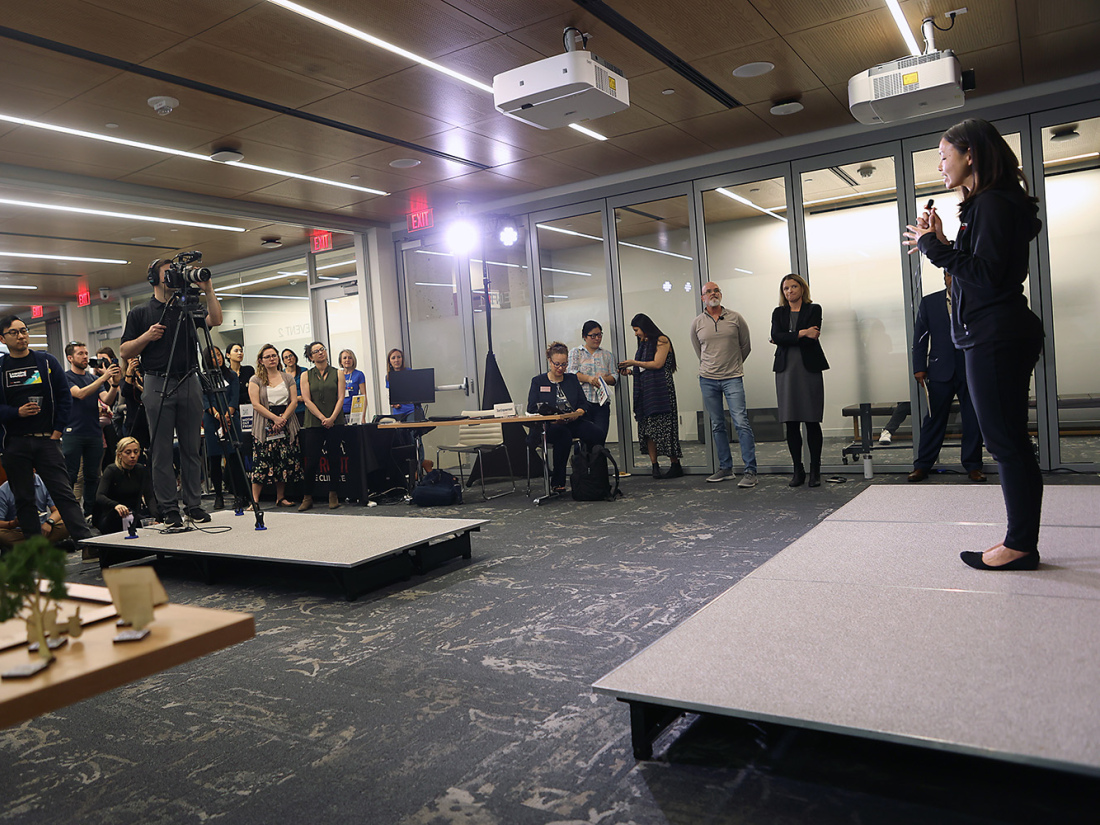
The latest education research, actionable strategies, and innovation from the Harvard Graduate School of Education
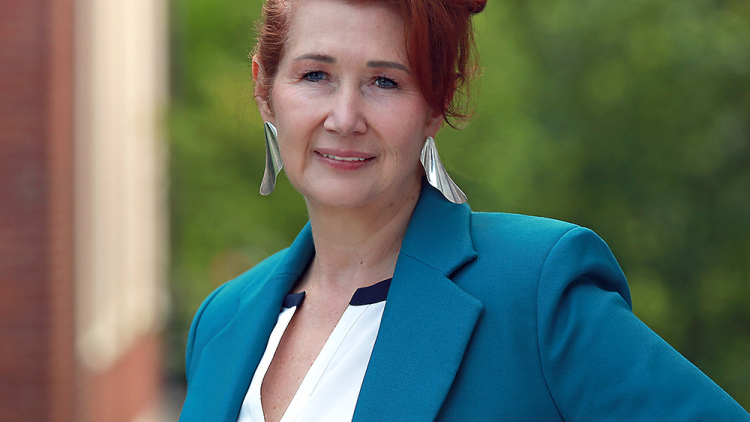
Suárez-Orozco Awarded Guggenheim Fellowship
The director of the Immigration Initiative at Harvard is the lone Guggenheim fellow representing the field of education out of 188 new selections.

Reshaping Teacher Licensure: Lessons from the Pandemic
Olivia Chi, Ed.M.'17, Ph.D.'20, discusses the ongoing efforts to ensure the quality and stability of the teaching workforce

Creating Space for Community
With the QT Library, Carina Traub, Ed.M.'21, has built an inclusive environment using the transformative power of literature to foster understanding and community

How to Survive Financial Aid Delays and Avoid Summer Melt
A pre-matriculation checklist can help high school seniors persist with their college dreams

‘Unique’ Opportunity Ahead for CEPR
Christina Grant outlines her vision for the Center for Educational Policy Research at Harvard as she joins as its executive director this spring
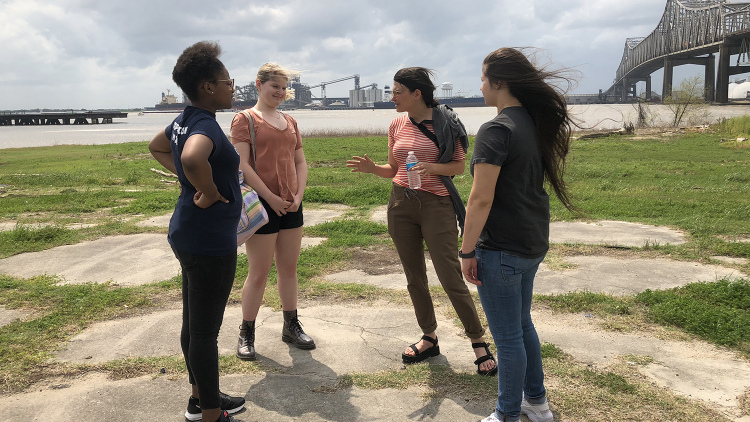
Filmmaking Becomes a Classroom
With "Hollow Tree," HGSE student and film director Kira Akerman makes filmmaking an education journey
Education in Turbulent Times
Responding to current events, mental health, and educating in times of crisis
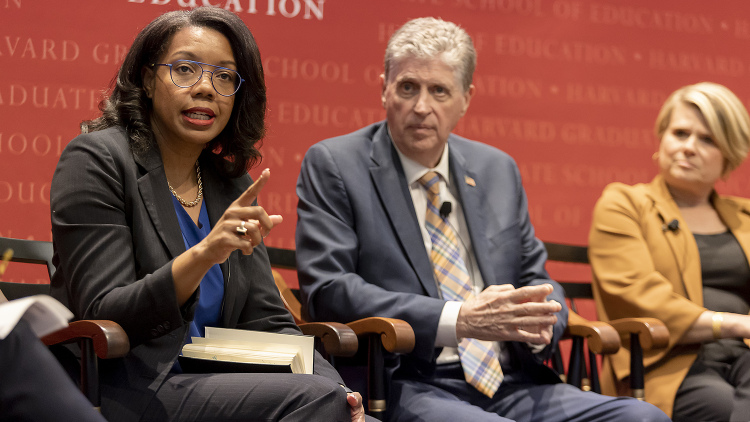
Askwith Education Forum Targets Pandemic Learning Loss
A panel of experts discuss new findings from the Education Recovery Scorecard in an Askwith Education Forum on COVID-era learning loss

Combatting Chronic Absenteeism with Family Engagement
As post-COVID absenteeism rates continue unabated, a look at how strong family-school engagement can help
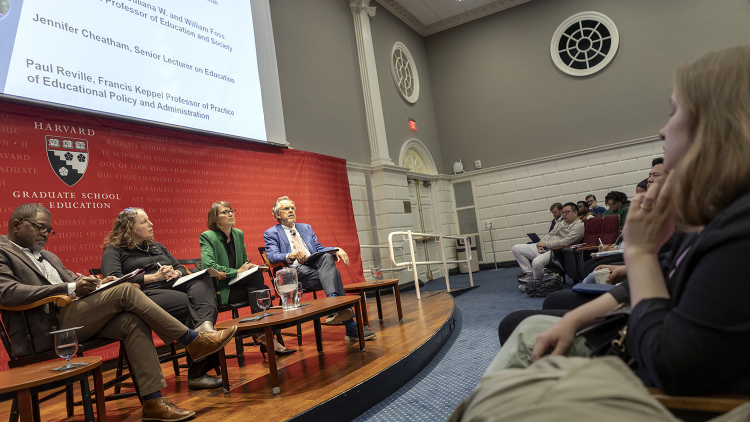
Askwith Education Forum Tackles Polarization in Education
HGSE panel offered advice for educators in divided times

Tackling Unhealed Trauma in Communities and Schools
An exploration of healing-centered engagement, a social-emotional learning approach that promotes self-esteem and offers a holistic view of recovery for young people of color managing trauma while also creating positive conditions for academic achievement.

Childhood Health Amid a Changing Climate the Focus of Askwith Education Forum
Chelsea Clinton, researchers, and climate activists discuss the impact of a warming planet on early development

Despite Progress, Achievement Gaps Persist During Recovery from Pandemic
New research finds achievement gaps in math and reading, exacerbated by the COVID-19 pandemic, remain and have grown in some states, calls for action before federal relief funds run out
In the Media
Commentary, thought leadership, and expertise from HGSE faculty

"The skills required to use evidence well are in short supply, and districts and states vary tremendously in their capacity."
Shaping the Future of Education
From research projects to design labs, discover how HGSE is at the forefront of innovation in education.
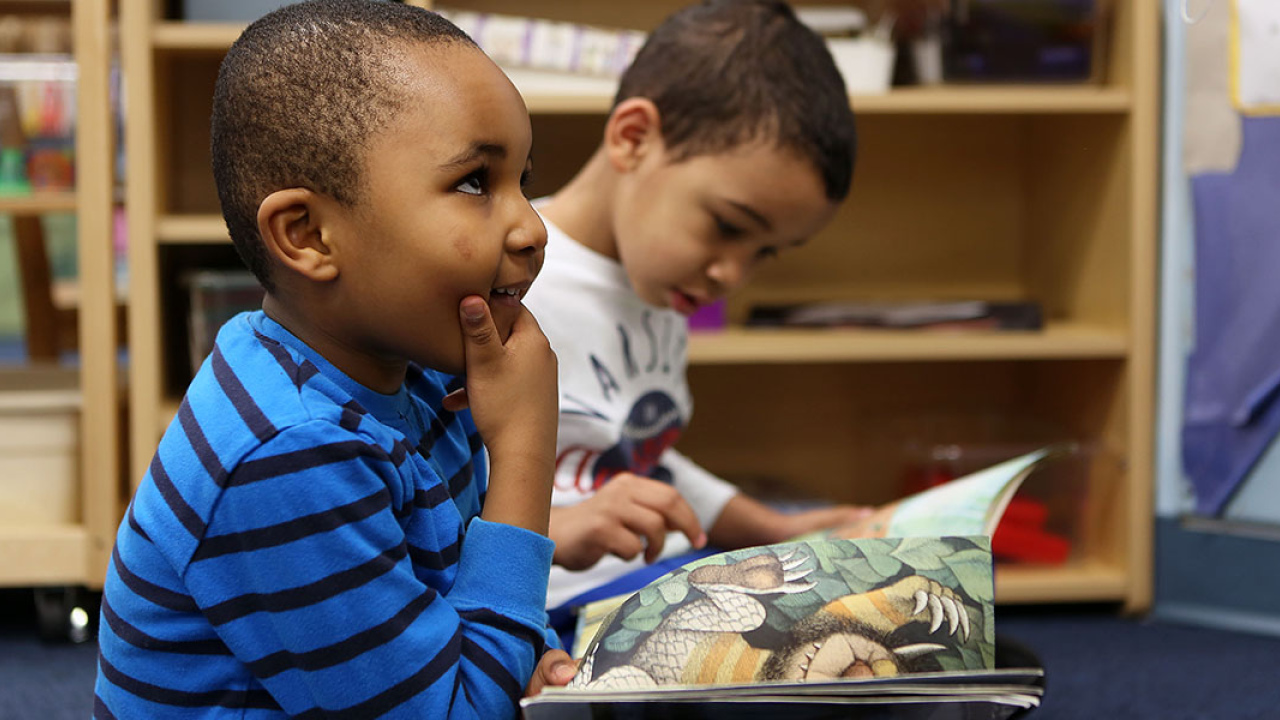
Reach Every Reader
Develops tools to support the vision that all children can develop the skills, knowledge, and interest to become lifelong readers
Public Education Leadership Project
Works to improve leadership competencies of public school administrators through professional development to drive greater educational outcomes
Immigration Initiative at Harvard
Advances interdisciplinary scholarship and hands-on research about immigration policy and immigrant communities
Explore More Topics
HGSE research, coursework, and expertise ranges widely across education topics. Browse the full list of topics or view our in-depth coverage of Climate Change and Education.
- College Access and Success
- Counseling and Mental Health
- Disruption and Crises
- Entrepreneurship
- Evidence-Based Intervention
- Immigration and Refugee Education
- Language and Literacy Development
- Moral, Civic, and Ethical Education
- Social Emotional Learning
- Teachers and Teaching
- Technology and Media
Search for a topic, trending issue, or name
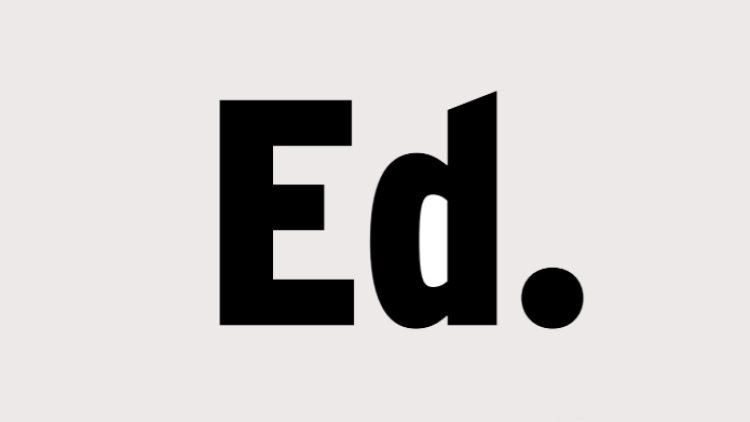

Harvard Ed. Magazine
The award-winning alumni magazine, covering timely education stories that appeal to the Harvard community and the broader world.
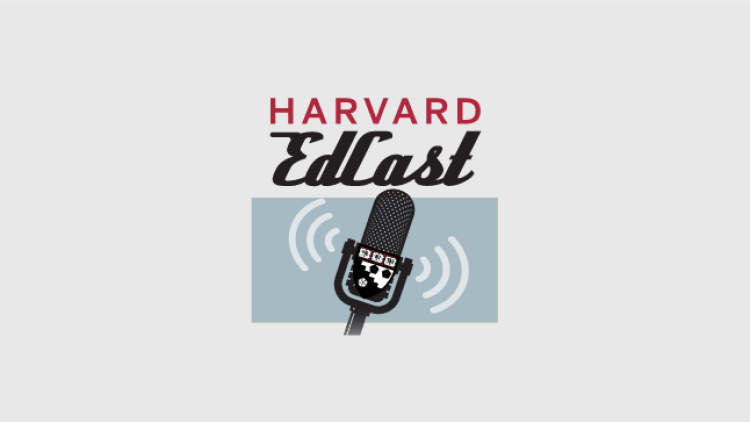
Harvard EdCast
Harvard’s flagship education podcast, acting as a space for education-related discourse with thought leaders in the field of education.

The latest education research, strategies, and perspectives from the Harvard Graduate School of Education
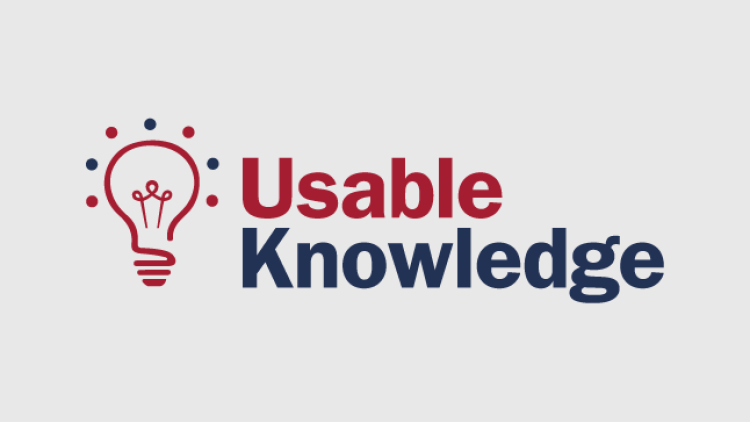
Usable Knowledge
Translating new research into easy-to-use strategies for teachers, parents, K-12 leaders, higher ed professionals, and policymakers.
Global education trends and research to follow in 2022
Subscribe to the center for universal education bulletin, emily gustafsson-wright , emily gustafsson-wright senior fellow - global economy and development , center for universal education @egwbrookings helen shwe hadani , helen shwe hadani former brookings expert @helenshadani kathy hirsh-pasek , kathy hirsh-pasek senior fellow - global economy and development , center for universal education @kathyandro1 maysa jalbout , maysa jalbout nonresident fellow - global economy and development , center for universal education @maysajalbout elizabeth m. king , elizabeth m. king nonresident senior fellow - global economy and development , center for universal education jennifer l. o’donoghue , jennifer l. o’donoghue deputy director - center for universal education , senior fellow - global economy and development @jennodjod brad olsen , brad olsen senior fellow - global economy and development , center for universal education @bradolsen_dc jordan shapiro , jordan shapiro nonresident fellow - global economy and development , center for universal education @jordosh emiliana vegas , and emiliana vegas former co-director - center for universal education , former senior fellow - global economy and development @emivegasv rebecca winthrop rebecca winthrop director - center for universal education , senior fellow - global economy and development @rebeccawinthrop.
January 24, 2022
- 12 min read
As the third calendar year of the pandemic begins, 2022 promises to be an important one—especially for education. Around the world, education systems have had to contend with sporadic closures, inequitable access to education technology and other distance learning tools, and deep challenges in maintaining both students’ and teachers’ physical and emotional health. At the same time, not all of the sudden changes precipitated by the pandemic have been bad—with some promising new innovations, allies, and increased attention on the field of global education emerging over the past three years. The key question is whether 2022 and the years ahead will lead to education transformation or will students, teachers, and families suffer long-lasting setbacks?
In the Center for Universal Education, our scholars take stock of the trends, policies, practices, and research that they’ll be closely keeping an eye on this year and likely in the many to come.

More than ever, in 2022 it will be critical to focus on strengthening the fabric of our global education system in order to achieve positive outcomes—particularly through an increased focus on data-informed decisionmaking. We have seen a renewed focus on different forms of data that are critical to enhanced education outcomes, such as real-time performance data, which allow teachers and other decisionmakers to course-adjust to the needs of learners to better support their educational journeys. Additionally, high-quality program cost data are needed for decisionmakers to plan, budget, and choose the most cost-effective interventions.
One way we are seeing these areas strengthened is through innovative financing for education, such as impact bonds , which require data to operate at full potential. This year, pooled funding through outcomes funds—a scaled version of impact bonds—should make a particularly big splash. The Education Outcomes Fund organization is slated to launch programs in Ghana and Sierra Leone, and we also expect to see the launch of country-specific outcomes funds for education such as OFFER (Outcome Fund For Education Results) in Colombia, the Back-to-School Outcomes Fund in India, and another fund in Chile. At the Center for Universal Education, we will be following these innovations closely and look forward to the insights that they will bring to the education sector.

As we look ahead to 2022, one continued challenge for many families is navigating the uncharted territory of supporting children’s learning with a growing number of school closures . But while the pandemic forced an abrupt slowdown in modern life, it also provided an opportunity to reexamine how we can prioritize learning and healthy development both in and out of school. Moreover, the cascading effects of the pandemic are disproportionally affecting families living in communities challenged by decades of discrimination and disinvestment—and are very likely to widen already existing educational inequities in worrisome ways.
One innovative approach to providing enriching learning opportunities beyond school walls that address the inequities in our current systems is Playful Learning Landscapes (PLL) —installations and programming that promote children and families’ learning through play in the public realm. A current focus for PLL at Brookings is measuring the impact of these spaces to show that PLL works and to garner greater investment in them. To that end, Brookings and its partners developed a framework and an initial set of indicators from both the learning science and placemaking perspectives to help assess the positive effects of PLL on learning outcomes , as well as its potential to enhance social interaction and public life in revitalized spaces. The framework will continue to evolve as we learn from communities that are testing the expansion and adaptation of PLL—this important work is just beginning.

The pandemic highlighted several trends in education that promise to be the focus of future policy and practice in 2022 and beyond: the importance of skills that supplement the learning of content, systemic inequities in education systems, and the role of digital technology in the education of the future. It has become increasingly clear that the memorization of content alone will not prepare children for the jobs and society of the future. As noted in a Brookings report “ A new path for education reform, ” in an automated world, manufacturing jobs and even preliminary medical diagnoses or legal contracts can be performed by computers and robots. Students who can work collaboratively—with strong communication skills, critical thinking, and creative innovation—will be highly valued. Mission statements from around the globe are starting to promote a “whole child” approach to education that will encourage the learning of a breadth of skills better aligning the education sector with needs from the business sector.
The past year also demonstrated weaknesses and inequalities inherent in remote learning that I’ll be closely tracking in the years to come. In fact, the Centers for Disease Control and Prevention suggested that virtual learning presents risks to social-emotional learning . Further, research suggests that academic progress during the pandemic slowed such that students demonstrated only 35 to 50 percent of the gains they normally achieve in mathematics and 60 to 68 percent in reading. The losses are not experienced uniformly , with children from underresourced environments falling behind their more resourced peers.
The failure of remote learning also raises questions about the place of digital learning in the classroom. Learning will become more and more hybrid over time, and keeping an eye on advances in technology—especially regarding augmented reality and the metaverse—will be particularly important, as both have real consequences for the classrooms.

In 2022, I’ll be focusing on one group of children in particular–refugees–who are among those children who have historically had the least access to preprimary education. The pandemic has affected them disproportionally , as it pushed them and their families into poverty and deprived them from most forms of education during the school closures.
While much more investment in early childhood education research and evaluation is needed to improve evidence and channel scarce resources effectively, there are a few important efforts to watch. A report commissioned by Theirworld last year provided an overview of the sector and focused on a critical gap and opportunity to address the inequity of access to early childhood education in refugee settings by better supporting teachers and community workers. This year, Theirworld and partners will pursue two of the report’s recommendations–making the science of early childhood brain development widely accessible in refugee communities and building the evidence base on what works in supporting early childhood education teachers and the young refugee children they teach.
The report was informed by existing initiatives including Ahlan Simsim, which in 2017 received the largest known grant to early education in a humanitarian context. While the evaluation of Ahlan Simsim will not be complete until two more years, the Global Ties for Children research center, Sesame Workshop, and the International Rescue Committee will share critical insights into their learning to date in a forthcoming episode of the podcast the Impact Room .

This coming year I’ll be focused on how education systems can prepare for future disruptions, whatever the cause, with more deliberateness. The past two years of the COVID pandemic have seen education systems throughout the globe struggle to find ways to continue schooling. Additionally, there have been other public health crises, natural disasters such as earthquakes, floods, and severe storms, and wars and terrorism in different parts of the world that have gravely tested school systems’ ability to minimize the cost of catastrophes on students and teachers. Finding safer temporary learning places outside the school and using technologies such as radio, TV broadcasts, and online learning tools have helped, but quick fixes with little preparation are not effective approaches for sustaining and advancing learning gains.
In the age of broadcast and digital technologies, there are many more ways to meet the challenges of future emergency situations, but life- and education-saving solutions must be part of the way school systems operate—built into their structures, their staffing, their budgets, and their curricula. By preparing for the emergencies that are likely to happen, we can persevere to reach learning goals for all children.

By the close of 2021, a number of studies began to document the impact of COVID-19 on girls’ educational trajectories across the Global South. These studies point to promising trends –lower than expected dropout rates and reenrollment rates similar to (if not greater than) those of boys–while still highlighting the particular challenges faced by adolescent girls and girls living in poverty , conflict, and crisis .
In 2022, it will be critical to continue to generate more nuanced evidence—carefully considering questions such as “for which girls,” “where,” “when,” and “why.” And then we must put this knowledge to use to protect and promote girls’ and young women’s rights not just to education, but to participate and thrive in the world around them. Ensuring that marginalized girls and young women become transformative agents in improving their lives and livelihoods—as well as those of their families and communities—requires us to develop new strategies for learning and acting together.
At the Center for Universal Education, this means strengthening our work with local leaders in girls’ education: promoting gender-transformative research through the Echidna Global Scholars Program ; expanding the collective impact of our 33 Echidna alumni; and co-constructing a learning and action community to explore together how to improve beliefs, practices, programs, and policies so that marginalized adolescent girls’ can develop and exercise agency in pursuing their own pathways.

Going into year three of COVID-19, in 2022 I’m interested to see whether countries will transform their education systems or largely leave them the way they are. Will leaders of education systems tinker around the edges of change but mostly attempt a return to a prepandemic “normal,” or will they take advantage of this global rupture in the status quo to replace antiquated educational institutions and approaches with significant structural improvement?
In relation to this, one topic I’ll be watching in particular is how countries treat their teachers. How will policymakers, the media, parent councils, and others frame teachers’ work in 2022? In which locations will teachers be diminished versus where will they be defended as invaluable assets? How will countries learn from implications of out-of-school children (including social isolation and child care needs)? Will teachers remain appreciated in their communities but treated poorly in the material and political conditions of their work? Or will countries hold them dear—demanding accountability while supporting and rewarding them for quality work?

I’m interested in learning more about how pandemic lockdowns have impacted students. So far, we’ve only gotten very general data dealing with questions that are, in my opinion, too simple to be worthwhile. It’s all been about good and bad, positive and negative, learning loss and achievement. But I’ll be watching for more nuanced studies, which ask about specific ways increased time away from school has impacted social-emotional development. How do those results differ between gender, race, socioeconomic status, and geographic location? I suspect we’re going to learn some things about the relationship between home environment and school environment that will challenge a lot of our taken-for-granted assumptions.

In 2022, I’ll be tracking emerging evidence on the impact of the COVID-19 school closures on children and youth. Several researchers, including my co-authors and me , have provided estimates of the school closures’ impact on student learning losses, unemployment, future earnings, and productivity globally. But only recently are researchers analyzing actual evidence of learning losses , and an early systematic review finds that “Although robust and empirical research on COVID-19-related student learning loss is limited, learning loss itself may not be.”
Likewise, there is little rigorous reviews of remote learning tools’ and platforms’ impact on student learning during the school closures. After the pandemic, it is almost certain that remote and hybrid learning will continue—at a minimum occasionally and often periodically—in primary, secondary, and post-secondary education. It is urgent that we build the evidence base to help education decisionmakers and practitioners provide effective, tailored learning experiences for all students.
Finally, a key issue for education is how to redesign curricula so that this generation (and future generations) of students gain a key set of skills and competencies required for technologically-advancing labor markets and societies. While foundational literacy and numeracy skills continue to be essential for learning, a strong foundational knowledge of science, technology, engineering, and mathematics is ever more important in the 21st century, and I look forward to contributing research this year to help make the case for curricula redesign efforts.

I will be interested to see how parent-teacher relationships progress after the pandemic has (hopefully) faded into the background. COVID-19 has had an inescapable impact on the way we deliver education globally, but none more so than on how education leaders and teachers interact with students and their families.
For the past three years, I have been studying family-school collaboration. Together with my colleagues and partners, we have surveyed nearly 25,000 parents and 6,000 teachers in 10 countries around the world and found that the vast majority of teachers, parents, and caregivers want to work together more closely. Quality family-school collaboration has the potential to significantly improve educational outcomes, spur important discussions on the overall purpose of school, and smooth the path for schools and families to navigate change together. From community schools in New Mexico to text message updates from teachers in India , new innovations are popping up every day—in every corner of the world. I’m excited to see what the future holds for family-school collaboration!
Education Technology Global Education
Global Economy and Development
Center for Universal Education
Modupe (Mo) Olateju, Grace Cannon
April 15, 2024
Brad Olsen, John McIntosh
April 3, 2024
Darcy Hutchins, Emily Markovich Morris, Laura Nora, Carolina Campos, Adelaida Gómez Vergara, Nancy G. Gordon, Esmeralda Macana, Karen Robertson
March 28, 2024
12 Emerging Education Trends (2024-2027)

You may also like:
- Key Business Trends
- Fast-Growing Edtech Startups
- Workplace Trends to Watch
The education world is changing faster than ever.
Thanks in large part to improving technology and new research-led learning approaches, the education space was seeing a rapid shift towards high-tech approaches.
Here is a list of the top 12 trends to watch in the education space.
1. Neuroeducation Makes Inroads
The emerging field of educational neuroscience is shedding light on what works best when it comes to learning new concepts and skills.
And the field is quickly discovering that many mainstream education practices aren’t supported by research.
For example, these common teaching methods have all been called into question lately:
- In-person lectures
- One-size-fits-all lessons
- Memorization-based testing
- Unguided homework
While new approaches have been introduced to deal with timeless challenges like maintaining students’ attention . And encouraging critical thinking.

Neuroeducation is a subfield where teaching approaches are backed by the principles of neuroscience.
And as you can see below, interest has shown strong long-term growth.
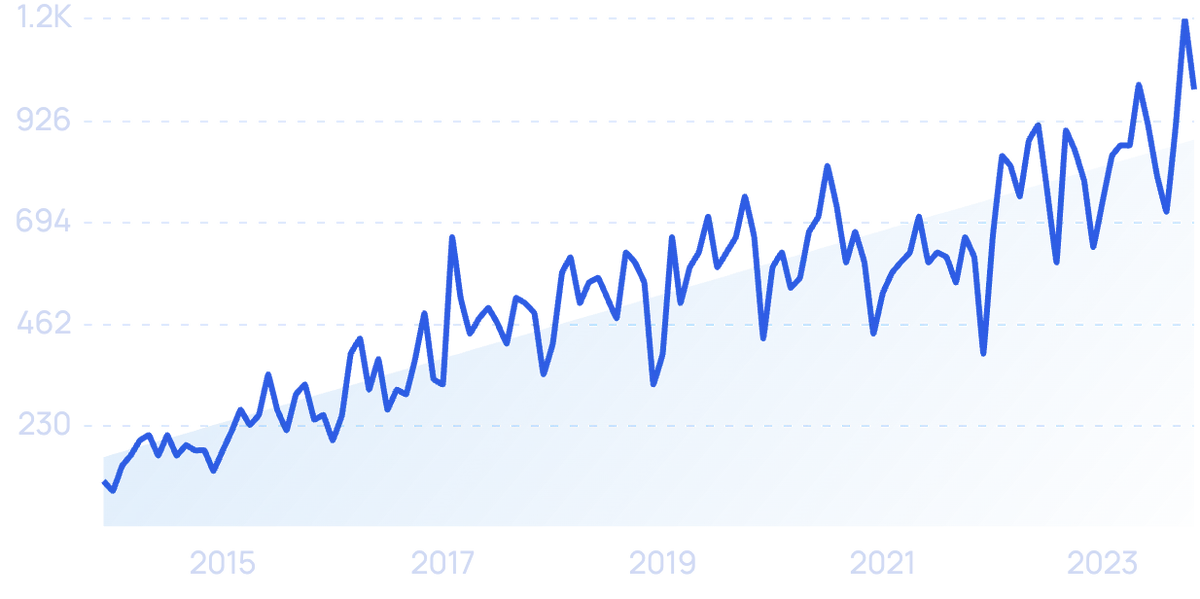
One of the pillars of this field is personalizing the learning process for each student.
Either by teaching in small groups. Or by using artificial intelligence to cater lessons to each student's learning needs.
2. Microlearning Gains Traction
It’s no secret that humans have an inherent limit to how much information they can retain from a single learning session.
Especially when the subject matter is not covered again later.
But traditional education tends to overload students with long lectures…and expect them to remember everything they just learned.
(Or to study it on their own, which is a skill many students don't have .)
Enter: the emerging microlearning trend.
Microlearning is a form of spaced repetition learning, in which lessons are broken up into bite-sized chunks and repeated over time.
This is said to help new concepts and skills sink in for the long term.
According to microlearning proponents, short, spaced bursts of learning can significantly boost retention .
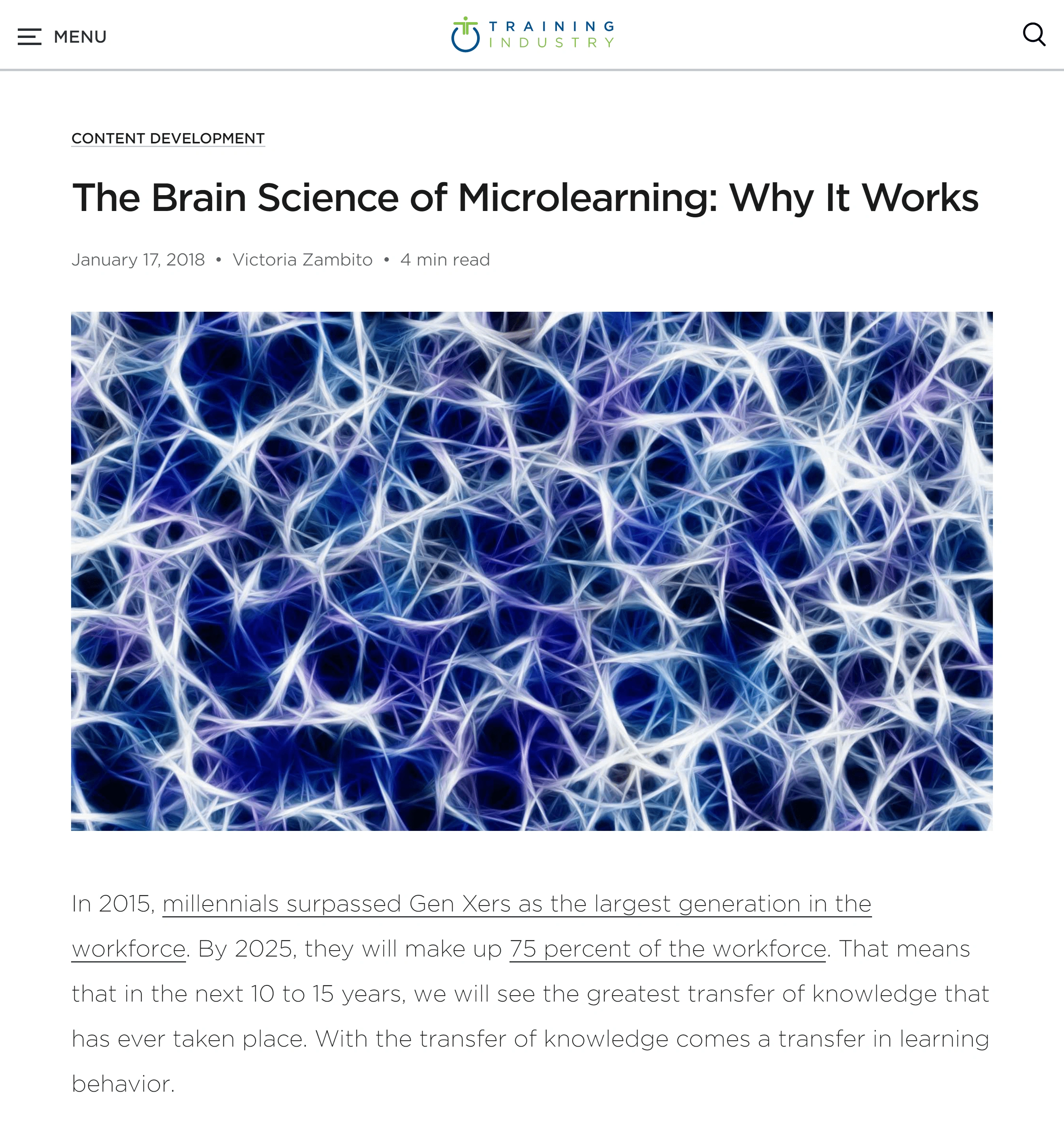
That’s probably why searches for "microlearning" have increased over the past five years.
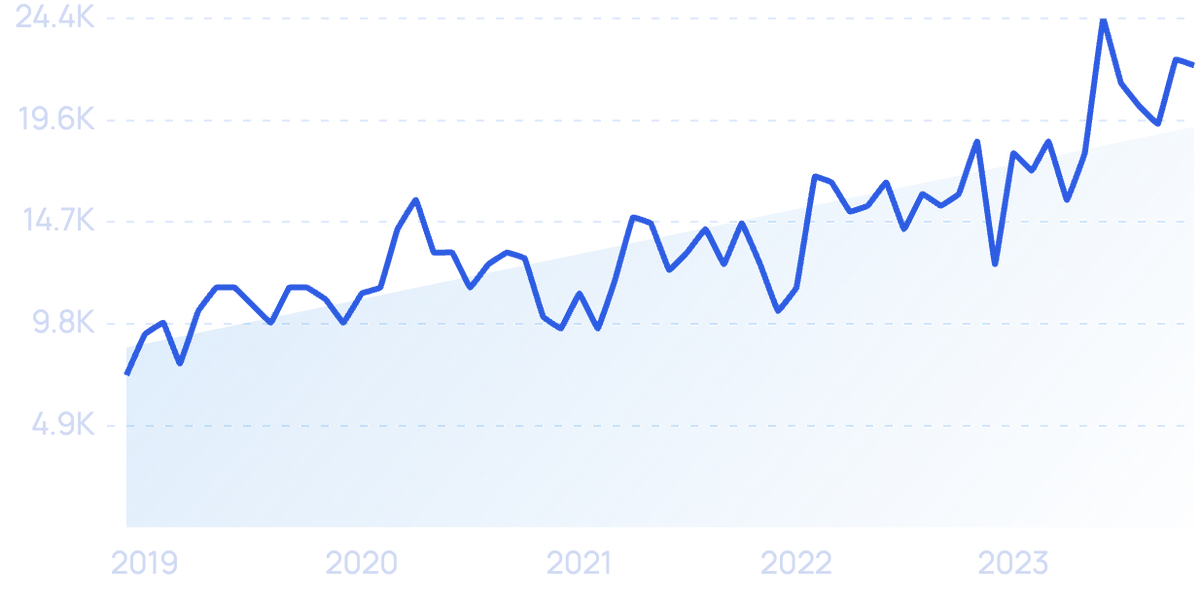
3. Online Learning Gains Ground
According to Research and Markets, the online education landscape is set to become a $319 billion industry by 2025.
The three major benefits of online learning compared to offline are: cost, convenience, and scale.
And scale - the ability of one incredible educator to reach an unlimited number of students - has massive potential for raising the quality of education as well.
But as often happens in the education space, cost may end up being the deciding factor.
It’s significantly cheaper to take an online course than it is to enroll in a traditional four-year college.
Also, satisfaction rates for people that take online courses are high.
In fact, BestColleges.com’s Online Education Trends Report states that 94% of students who take online courses are satisfied with the experience.
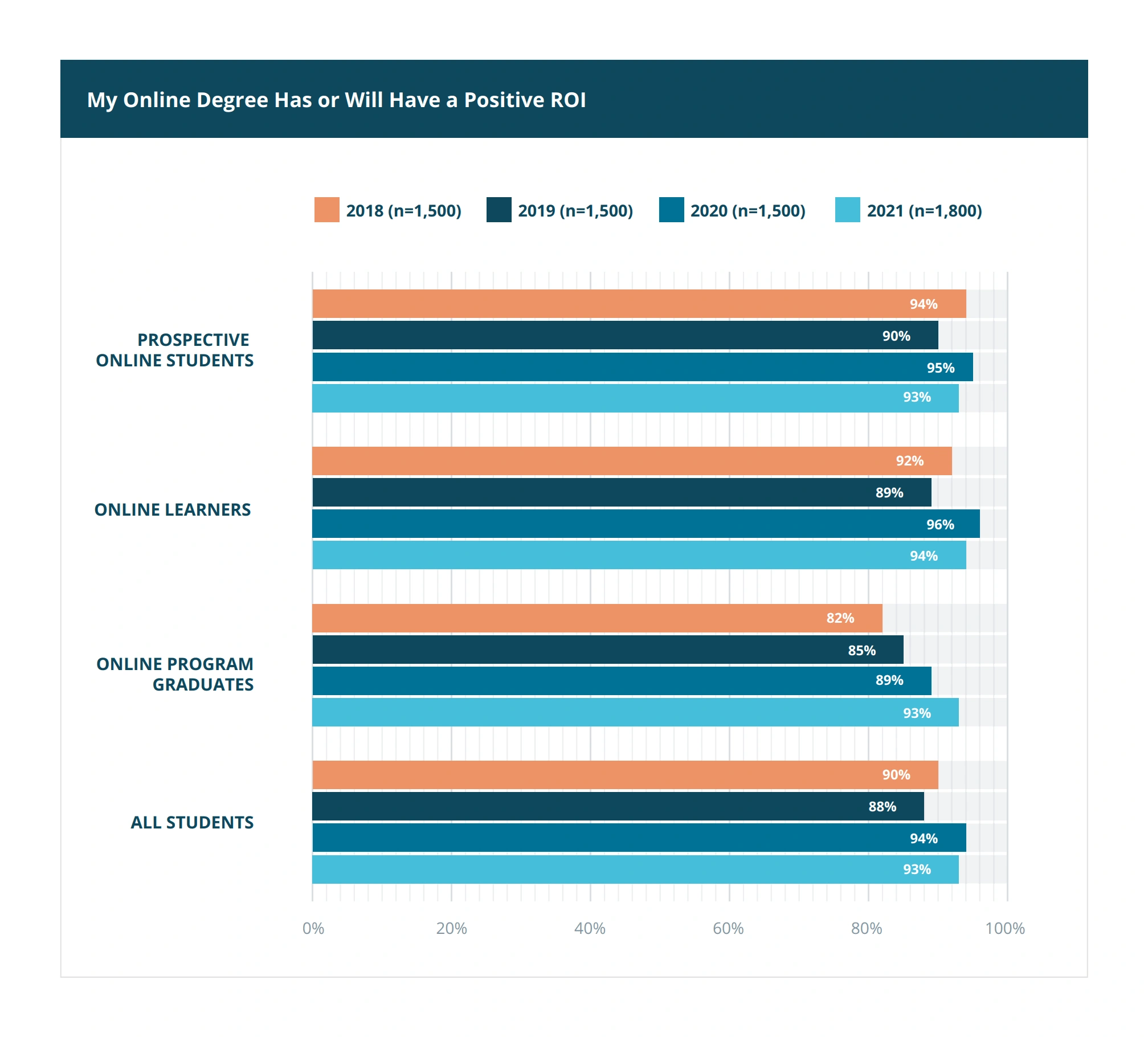
This is why the "classroom" of the 21st century may be 100% online (via virtual reality or augmented reality).
Or a form of blended learning that's primarily done online.
One clear example of the online learning trend is the online course platform Udemy .

Udemy is an online platform geared toward professionals who want to improve their skills.
It hosts thousands of courses across hundreds of different topics.
And as a business, it was last valued at over $2 billion .
Its growth has been meteoric.
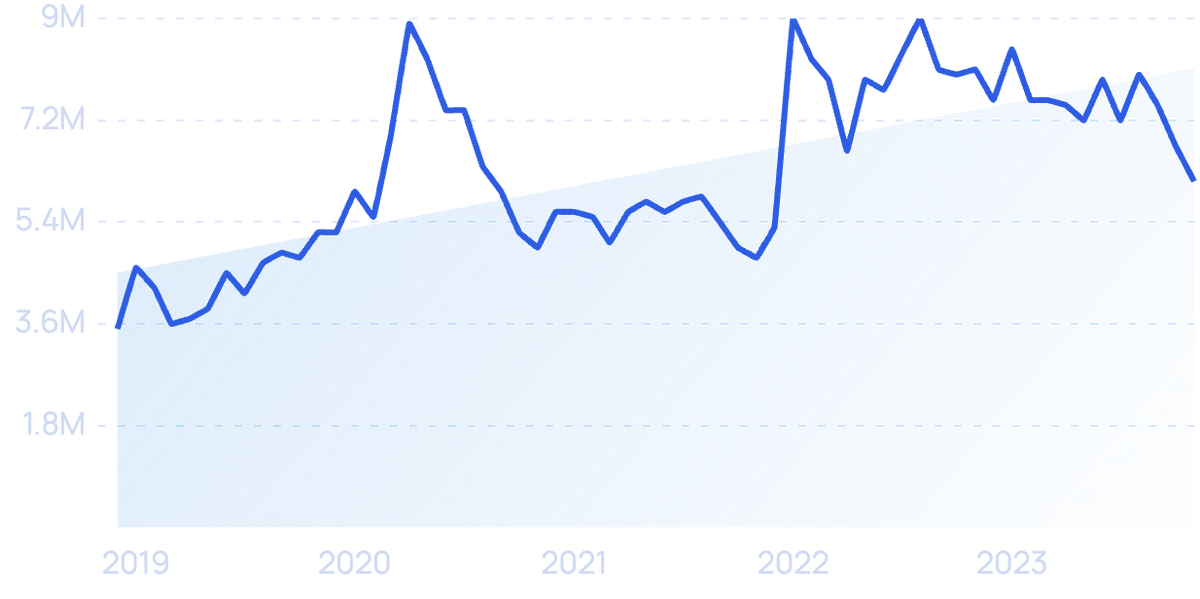
More and more traditional accredited universities are offering online curricula as well.
MIT was a trailblazer here, offering pre-recorded world-class courses online for free with the MITx program (launched in 2011).
But lots of other colleges have now entered the online education space, including offering fully online bachelor’s degrees .
Still, more universities started offering live online courses as an emergency measure during the coronavirus crisis.
It’s only natural that a good portion of them will continue to offer the same in the future as well.
And because some of the most popular tools being used to conduct live online courses weren’t specifically designed for education - for example, Zoom - you can bet that there will be many more purpose-built tools available to educators soon.
In fact, there are dozens of edtech startups aiming to fill this gap in the market.
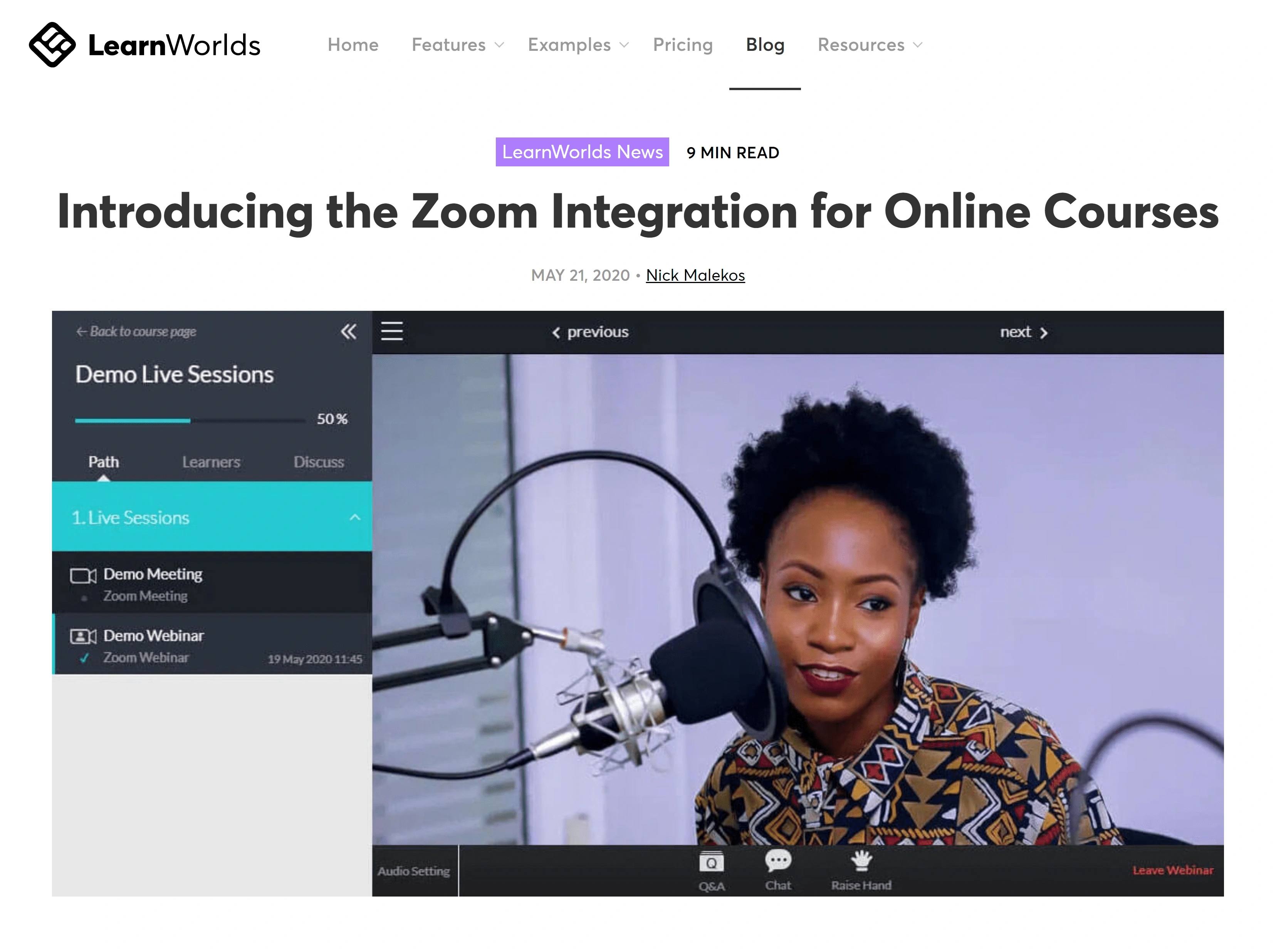
4. Instructors with Star Power
Yes, Udemy is a top player in the online education space.
But there’s another platform that’s growing quickly: MasterClass .
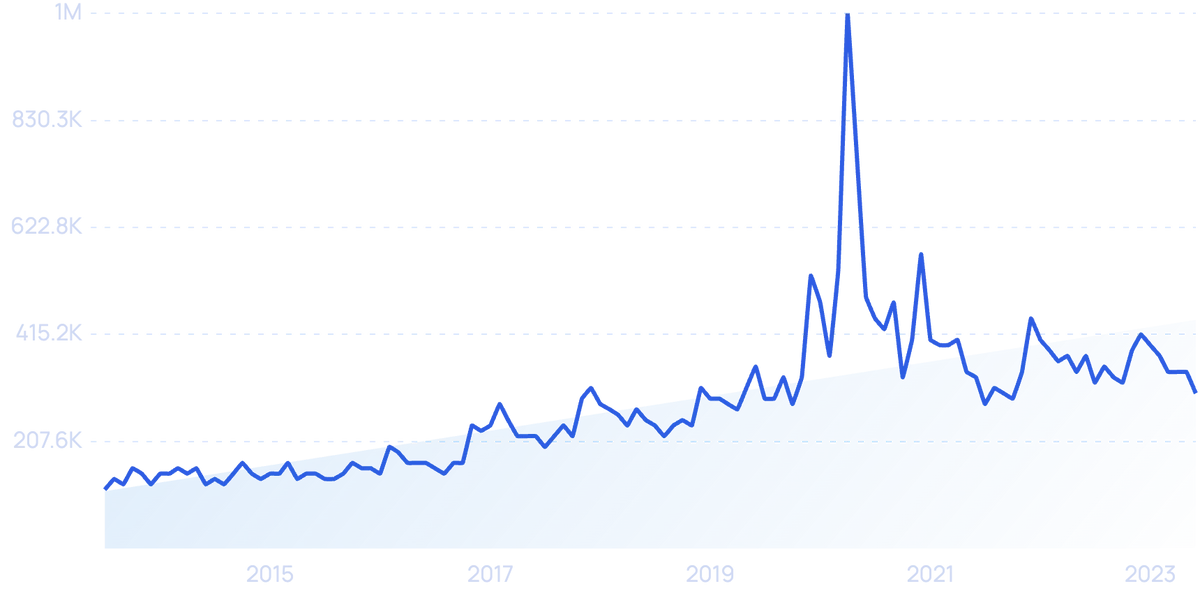
MasterClass has taken a unique spin on online training. Instead of hiring professional teachers (like college professors), their courses are taught by practitioners in the field (often celebrities).
For example, you can learn about filmmaking from Martin Scorsese.
Or business from former Disney CEO Bob Iger.

This unconventional approach has paid off big time for MasterClass. They raised $225 million on a $2.75 billion valuation. With MasterClass seeing unprecedented success, expect to see more education platforms tap into big-name instructors for their courses in the coming years.
5. Independent Entrepreneurs Launch More Online Courses
Udemy made it so anyone with a camera could launch their own online course.
Just one problem: Udemy keeps a hefty cut of the revenue.
So many course creators and “infopreneurs” are now choosing to sell courses from their own websites, cutting out the middleman.
Until recently, this could be a real challenge.
Between creating a course members’ area on your website to setting up payment processing and video hosting, a lot of administration time and technical skills were required to offer a course by yourself.
But a number of new players in the "learning management system" (LMS) space have made launching a course a lot easier.
For example, Thinkific .
Thinkific is an all-in-one tool for online course creation, promotion and hosting.

Like other learning management systems, Thinkific has made it super easy for entrepreneurs, bloggers, and YouTubers to host and manage courses on their own sites.
And to keep the vast majority of revenue for themselves.
It's been exploding in popularity:
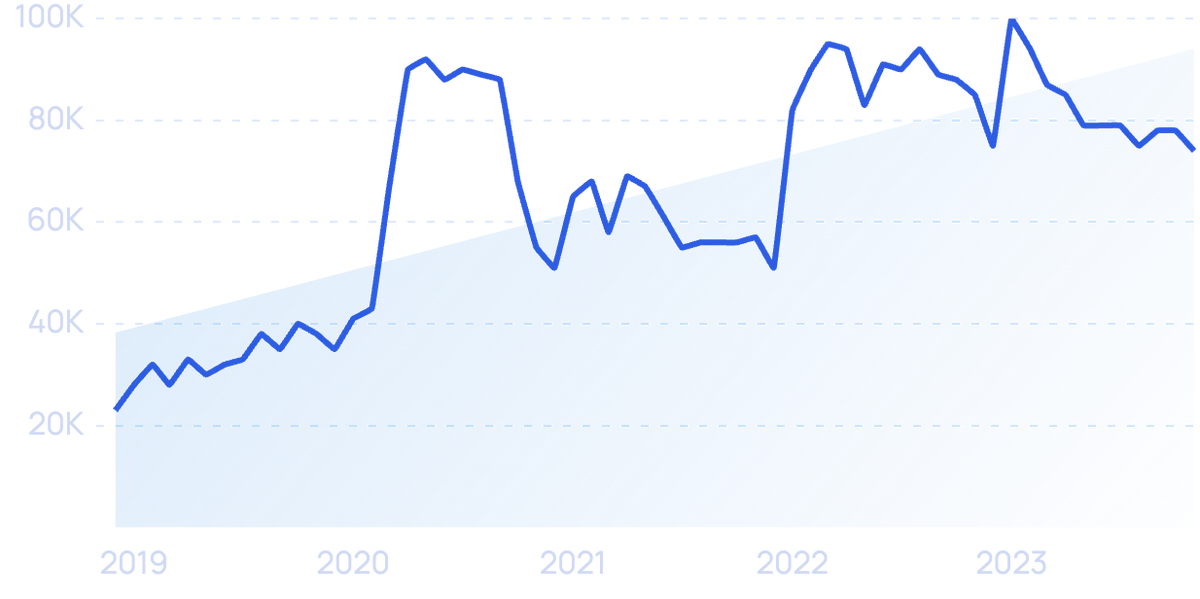
Teachable is another education technology company in this space.
Similar to Thinkific, Teachable offers software and cloud hosting for course creation and management, as well as payment processing.
In fact, Teachable boasts that course creators on its platform have earned over $500 million .
If that's the case, maybe the teachers of the future won't be so underpaid.

6. Niche Education Platforms Take Off
General platforms like Udemy and MasterClass are great if you want to learn how to write a screenplay or cook a great meal.
But they’re lacking when it comes to advanced courses that professionals in technical fields need to advance their careers.
This is why niche platforms for specific groups are starting to pop up.
These platforms provide the kind of deep, advanced training that isn’t broadly available elsewhere.
For example, Cybrary provides courses for people in IT.
They even design their courses around tests that IT professionals need to pass in order to get important certifications.
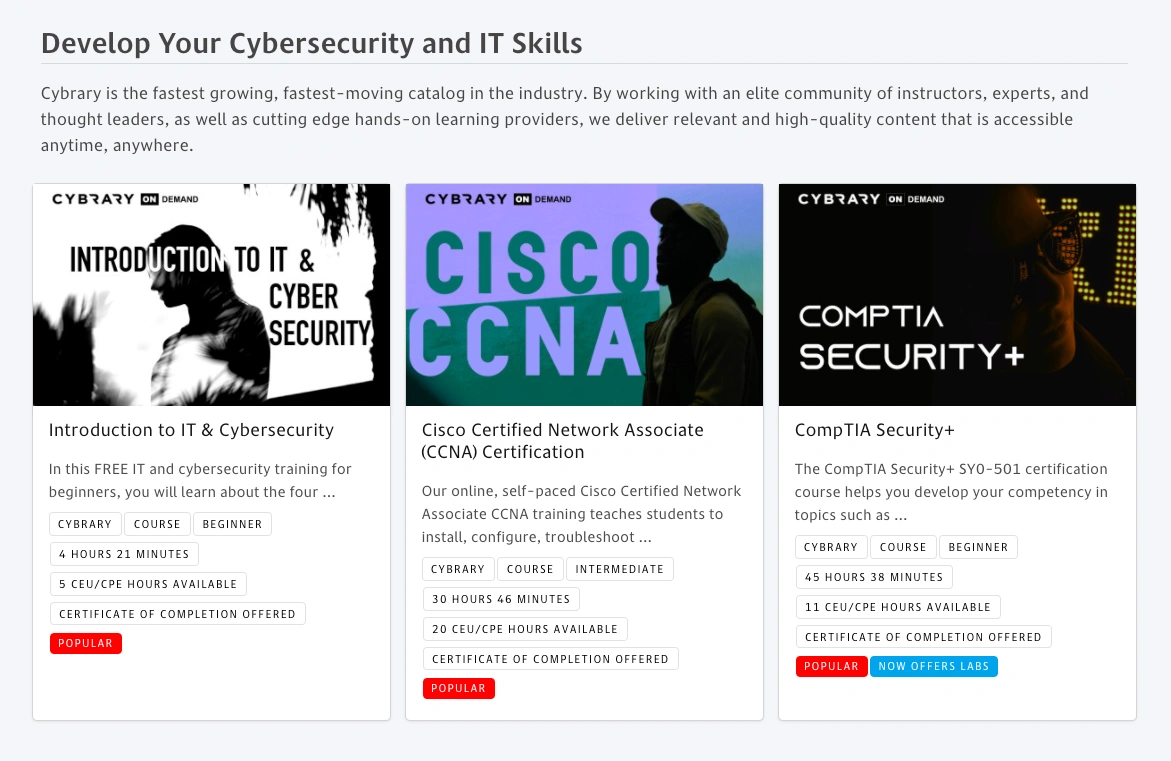
Another example of a technically-minded niche education is Hack The Box .
This online school offers training solutions for cybersecurity professionals (and students who want to enter the field).
It also uses gamification techniques to run in-depth competitions - complete with a scoring system and global leaderboard.
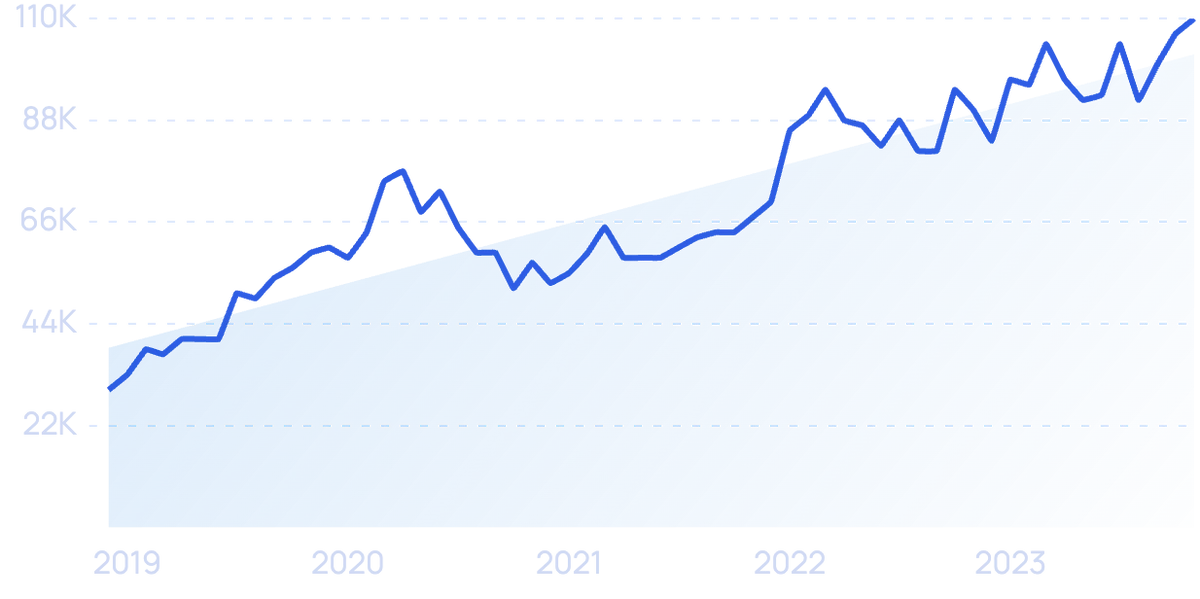
7. New Startups Offer More Homeschooling Options
About 3.4% of school-aged children in the US are homeschooled each year.
Lately, a variety of education startups have entered the homeschooling space.
One example is Outschool .
Started by former employees of Google, Square, and Airbnb, this edtech startup matches students with teachers online for a live small-group, virtual learning experience.
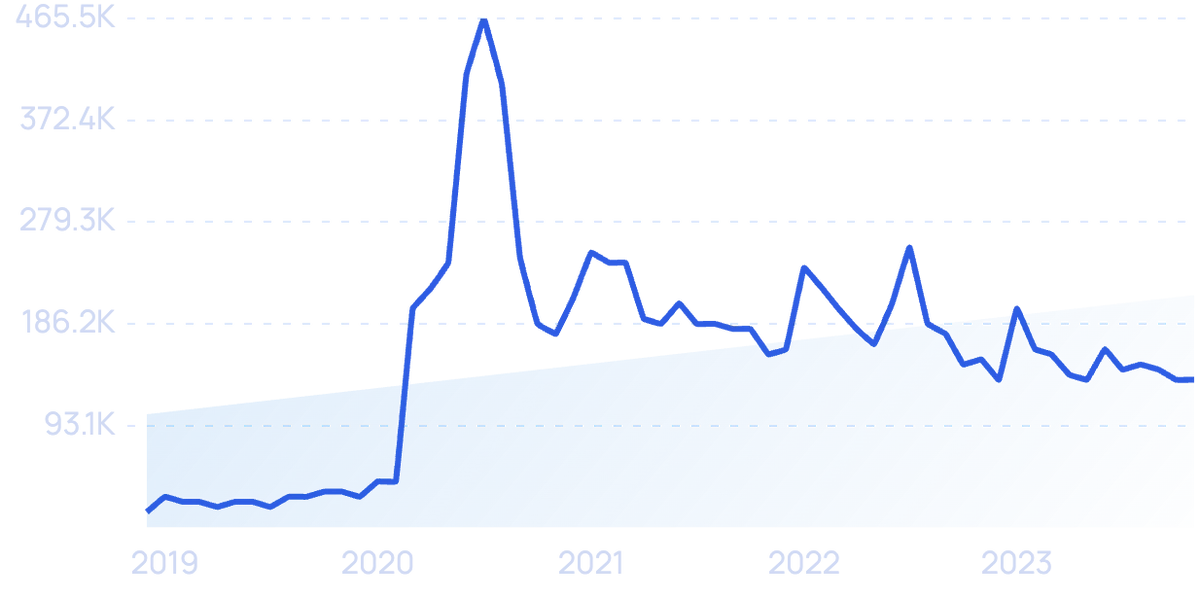
Another example is Prenda .
Prenda's approach is different.
Rather than being online, Prenda's focus is "microschools": small groups of students who meet in person, outside of a traditional learning environment.
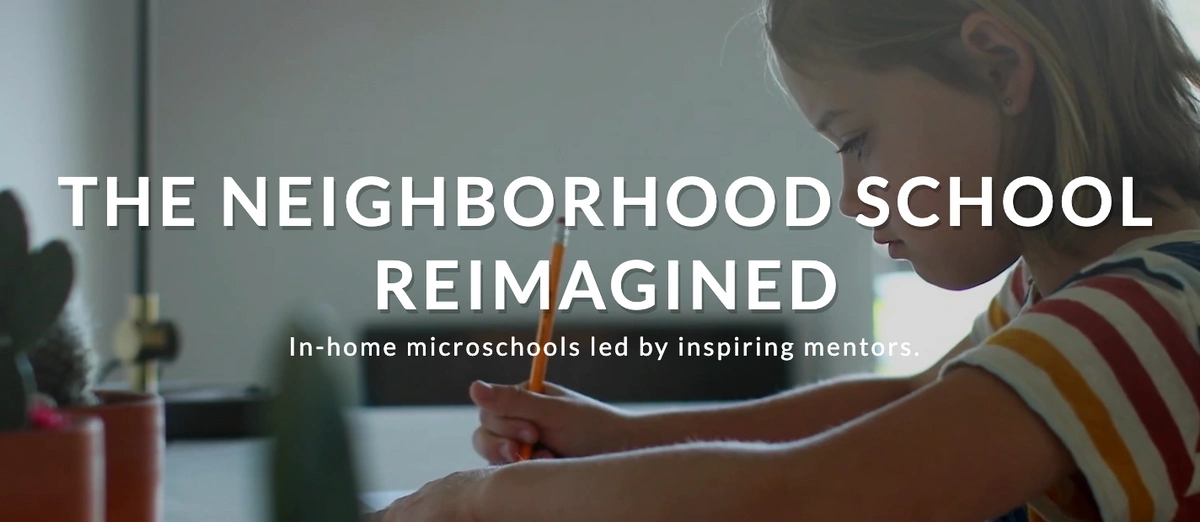
8. Inequality in Education Expands
Unfortunately, the past few years have made education equality worse in several ways.
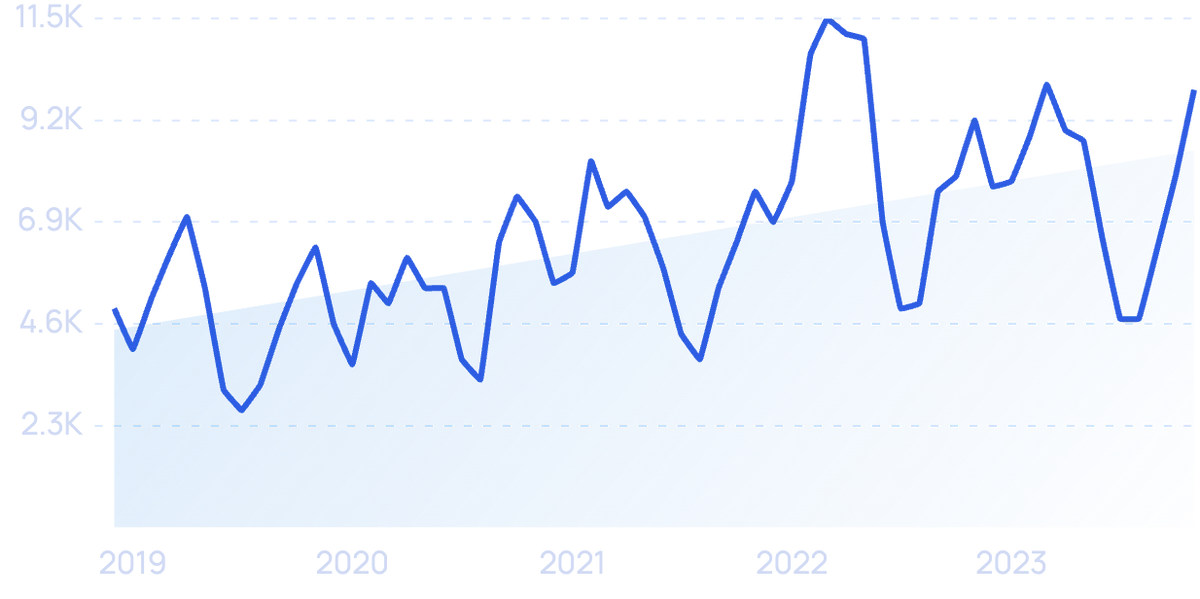
Funding is one of the main sources of inequality.
Between 2000 and 2015, the funding gap between the top 1% of school districts and an average-spending district in the 50th percentile widened by 32%.
The pandemic worsened income-related disparities.
The National Student Clearinghouse reports that, in the fall of 2020, the college enrollment rate for low-income students fell by 30% . That’s compared to just 17% of their peers in higher-income schools.
Their data also shows that students from higher-income schools were nearly 3x more likely to complete college in six years as compared to kids from high-poverty schools.
McKinsey reports that the pandemic has also broadened racial inequities in education.
While students in majority-White schools are catching up to pre-pandemic levels of achievement in reading and math, students in majority-Black schools are still way behind.
For example, students in majority-Black schools are 12 months behind kids in majority-White schools in math.
McKinsey cautioned that current trends point toward these students being a full grade level behind their peers.
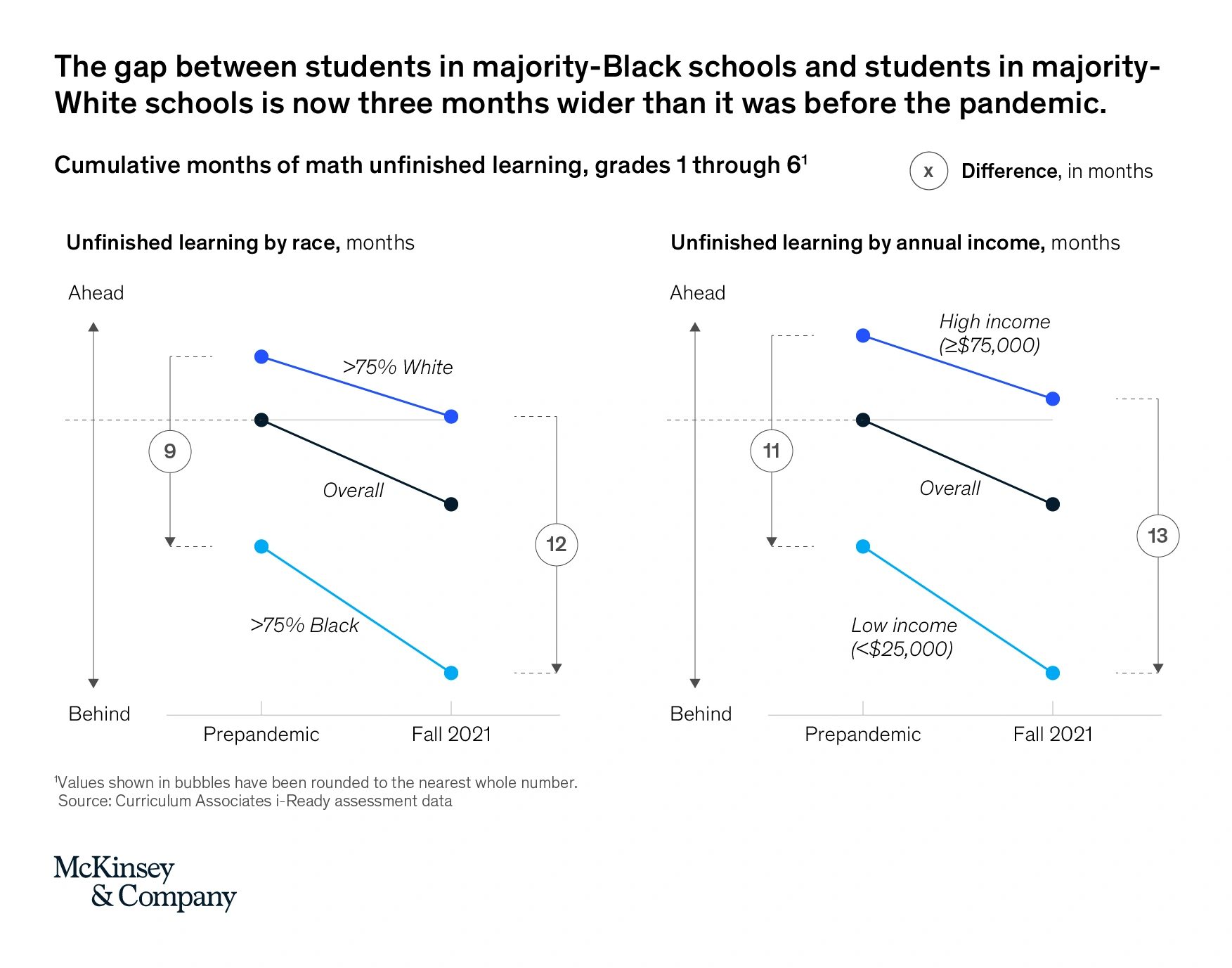
Part of that pandemic-related achievement gap was due to a lack of access to in-person learning and the digital technology needed for at-home learning.
In January 2021, more than half of all Black, Hispanic, and Asian fourth graders were learning in a fully remote environment; only 25% of White students were in that situation.
Add that to the fact that Black and Hispanic households were 1.3x as likely as White families to have limited access to computers and the internet, and the learning disparities become very clear.
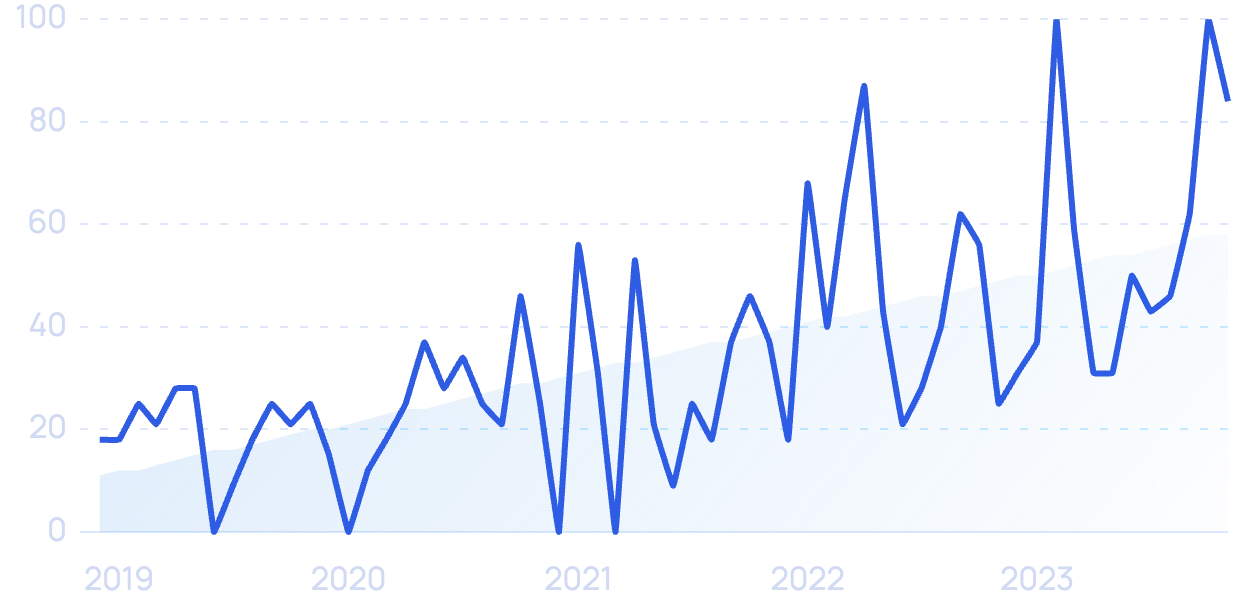
In the face of inequality, some education and community leaders support doing away with property tax funding. Tying school funding to the local real estate market is a root cause of iniquity, they argue.
Data from 2018-19 shows that approximately 45% of school funding came from local governments and that 36% of that was funded by property taxes.
Data from St. Louis shows that majority-White school districts receive $1,698 more per year per student than majority-Black districts.
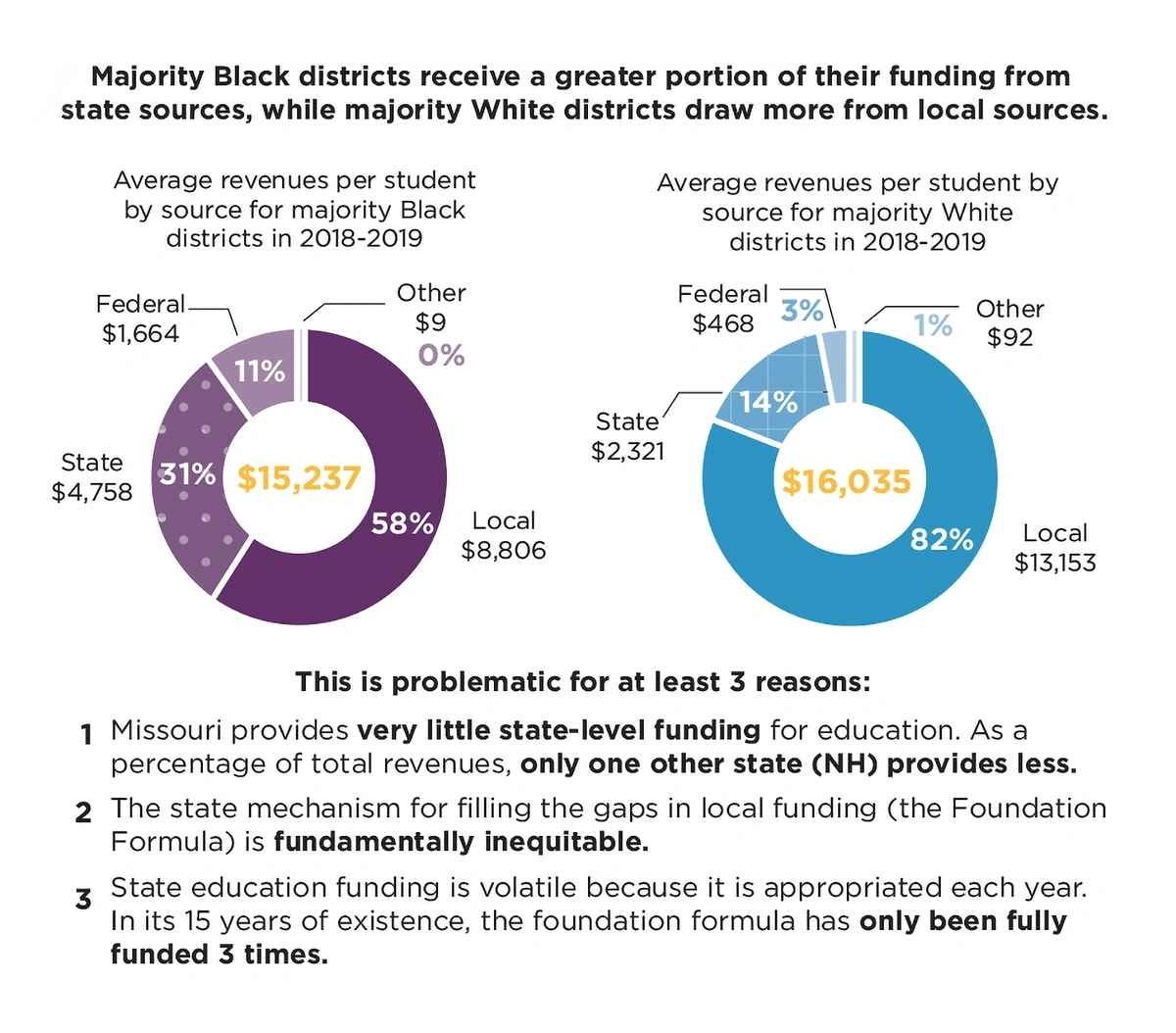
Lawsuits in New Hampshire have also challenged this funding model.
9. Higher Education Adopts Extended Reality
Extended reality (XR), which includes technology such as augmented reality (AR), virtual reality (VR), and mixed reality (MR), is transforming the education landscape by providing innovative ways to learn.
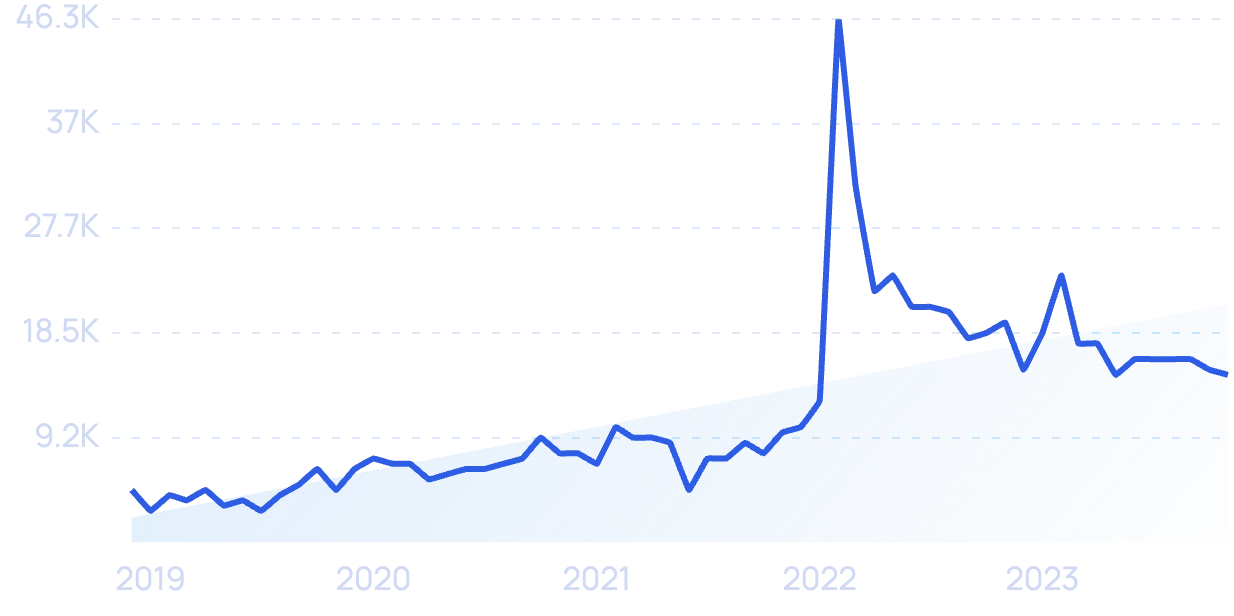
Overall, the XR market is predicted to grow at a CAGR of nearly 35% through 2028, according to data from Mordor Intelligence. A generous portion of that growth will come from the education sector.
A 2021 survey from EDUCAUSE reported that nearly 40% of higher education institutions have adopted XR for at least a few projects and 12% are using XR across multiple departments.
An overwhelming majority of respondents (90%) said their adoption of XR will somewhat or significantly increase in the next five years.
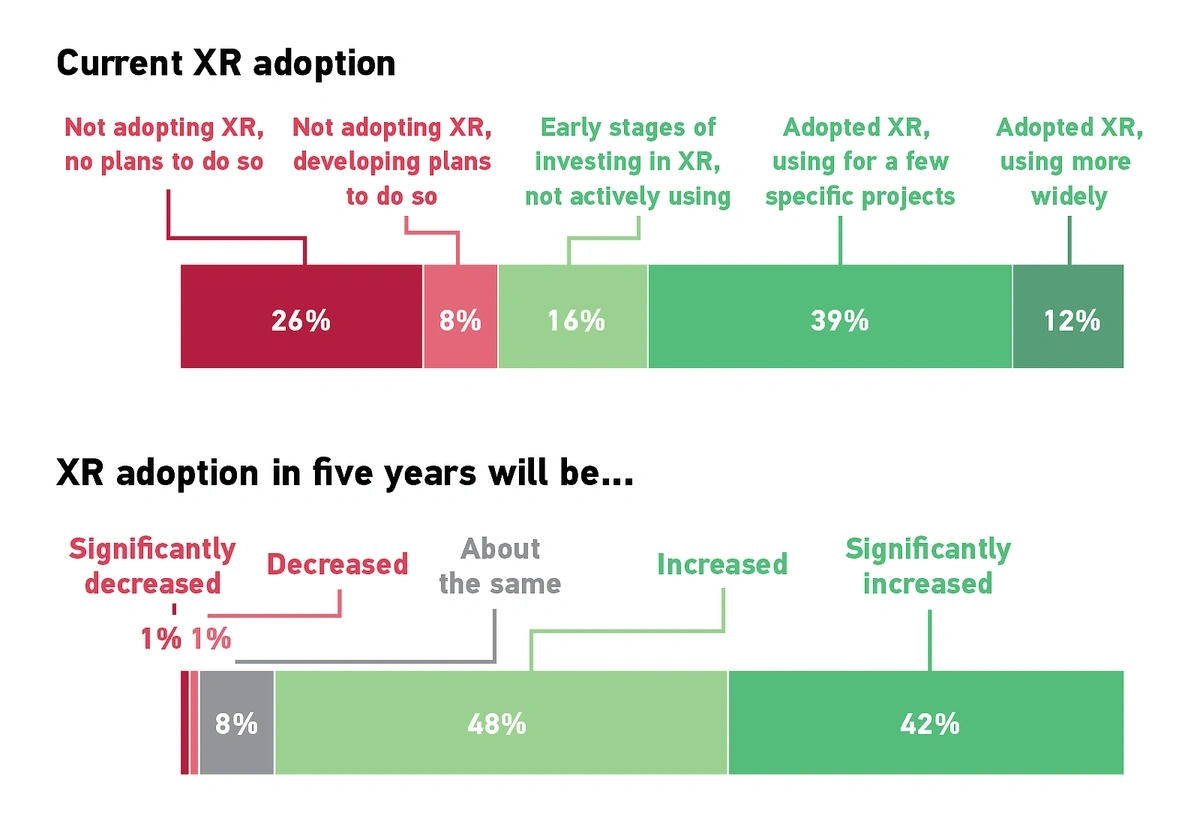
A number of colleges and universities are already using XR to facilitate learning.
At Colorado State University, medical school students use VR to dissect human cadavers.
Nearly 90% of the students who have used this technology say VR has helped them to understand spatial relationships, which is a crucial skill for potential physicians.

In 2019, The University of Michigan announced its “ XR Initiative ,” a plan to fund new projects and leverage technology in education.
In their latest announcement, the university said they have plans to partner with Coursera in launching 10 new XR courses in 2023 .
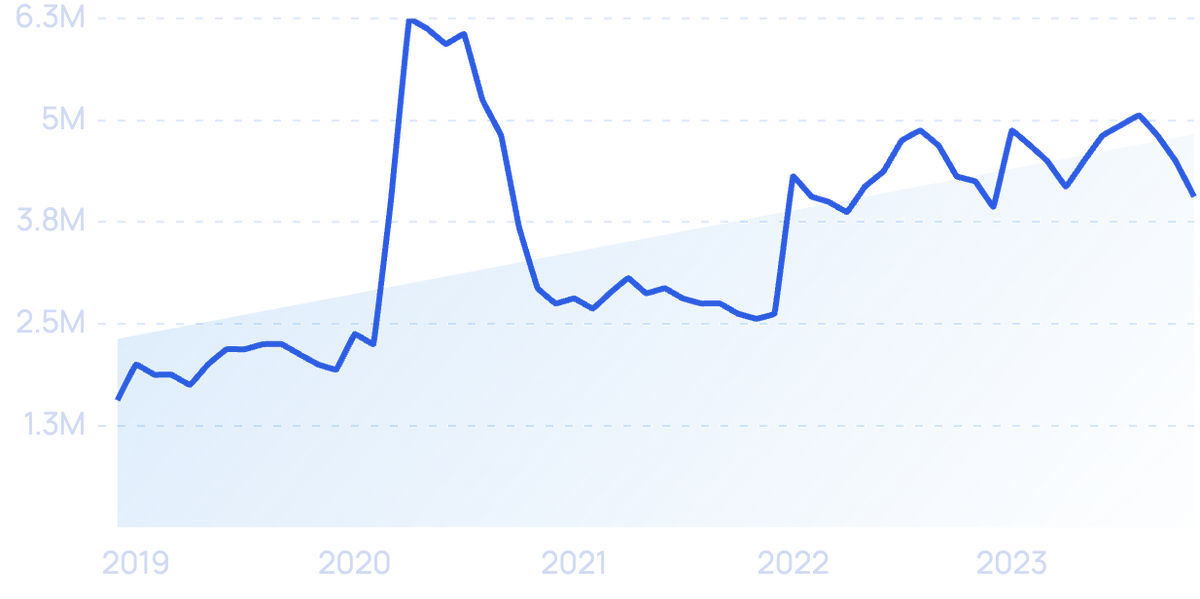
The courses will cover human skills, future thinking, and specialized content for growing industries all aimed at bringing online learning to the next level, according to the university.
10. A Renewed Emphasis on Soft Skills
More than 90% of HR professionals agree that soft skills are very important to the future of recruiting, according to a report from LinkedIn.
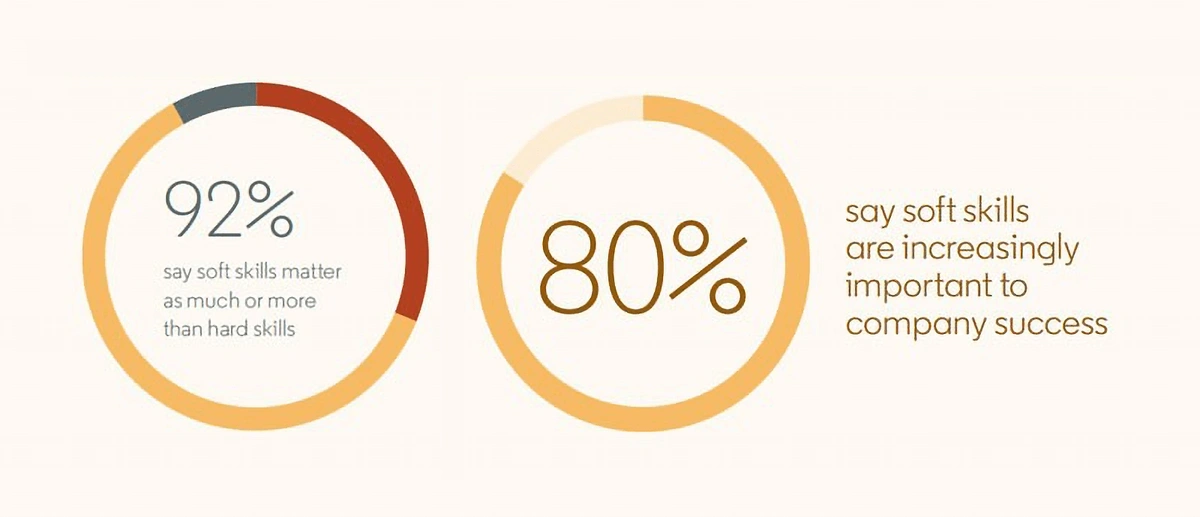
In fact, the importance of soft skills ranked higher than work flexibility, anti-harassment, and pay transparency.
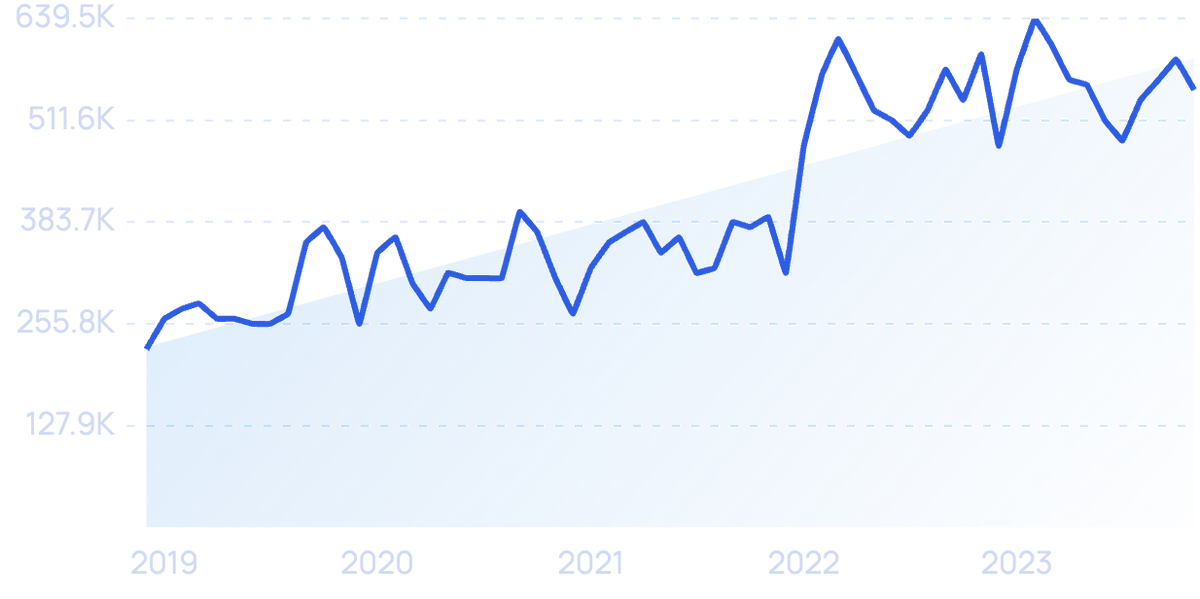
Monster’s 2022 Future of Work Global Survey identified the most important soft skills as teamwork, communication, and problem-solving. However, businesses report that the top two soft-skill gaps they’re seeing are in teamwork and communication.
This disconnect is leading many educational institutions and employers to place a renewed emphasis on soft-skills training.
In fact, a study of more than 150k students in Chicago public high schools found that building social-emotional qualities , such as how to resolve conflict and how to stay motivated to work hard, achieved better results for students than schools that focused solely on test scores.
In another example, some schools have suggested modifying traditional grading so that soft skills like communication, determination, and participation would be taken into account instead of just skill mastery.
When it comes to employees, companies are looking for innovative ways to close the soft skills gap.
Virtual reality (VR) is one way they’re doing it.
H&R Block recently started using VR training to teach their new employees the soft skills they need in order to handle angry customers.
More than two-thirds of the employees enjoyed this learning as compared to traditional methods and the company saw a 50% reduction in dissatisfied customers.
Murison is an industry-leading platform that’s enabling companies to create these VR training opportunities.

Their platform blends AI and live human interaction to create authentic training simulations specifically aimed at improving employees’ soft skills related to sales, customer service, DEI topics, and leadership.
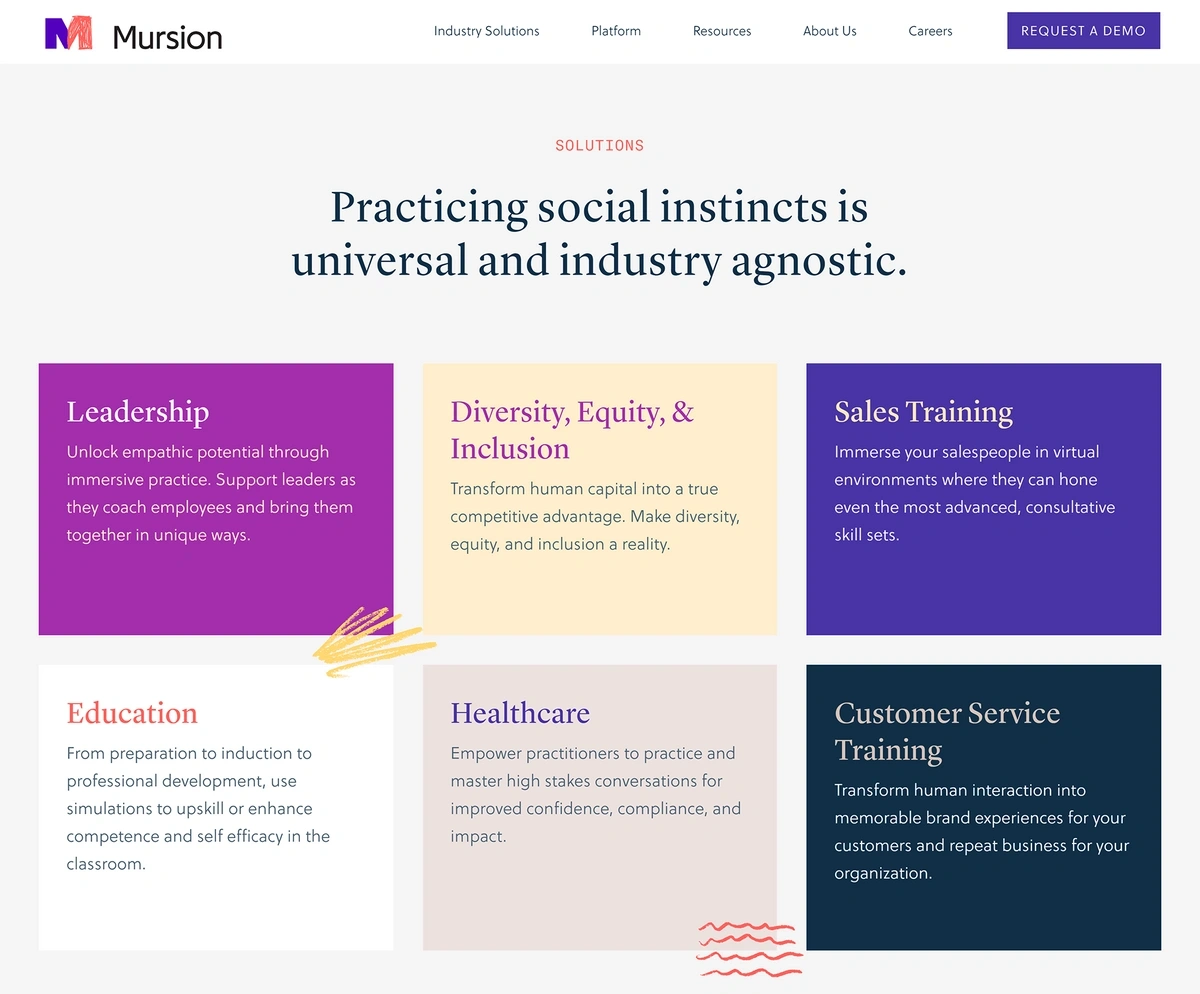
The company was named to the GSV EdTech 150 in 2022 and ranked 306th in the Financial Times’ Americas’ Fastest Growing Companies list for 2021.
11. Educators Considering Alternative Assessments
While some educational professionals have always doubted schools’ reliance on testing , the pandemic made many more question the validity and usefulness of summative assessments.
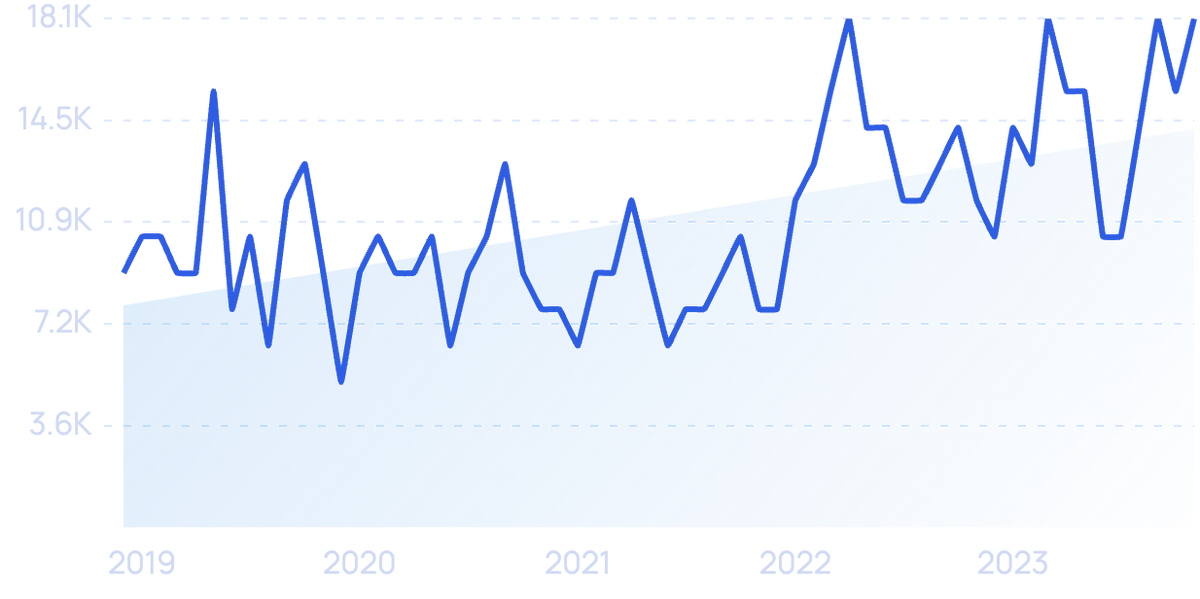
The 2021 State of Teaching and Learning survey from Instructure showed that fewer than 30% of parents and teachers felt that high-stakes testing was an important measurement of students’ learning.
The survey showed that 50% of administrators and 58% of teachers feel this way of testing is outdated and needs overhauling.
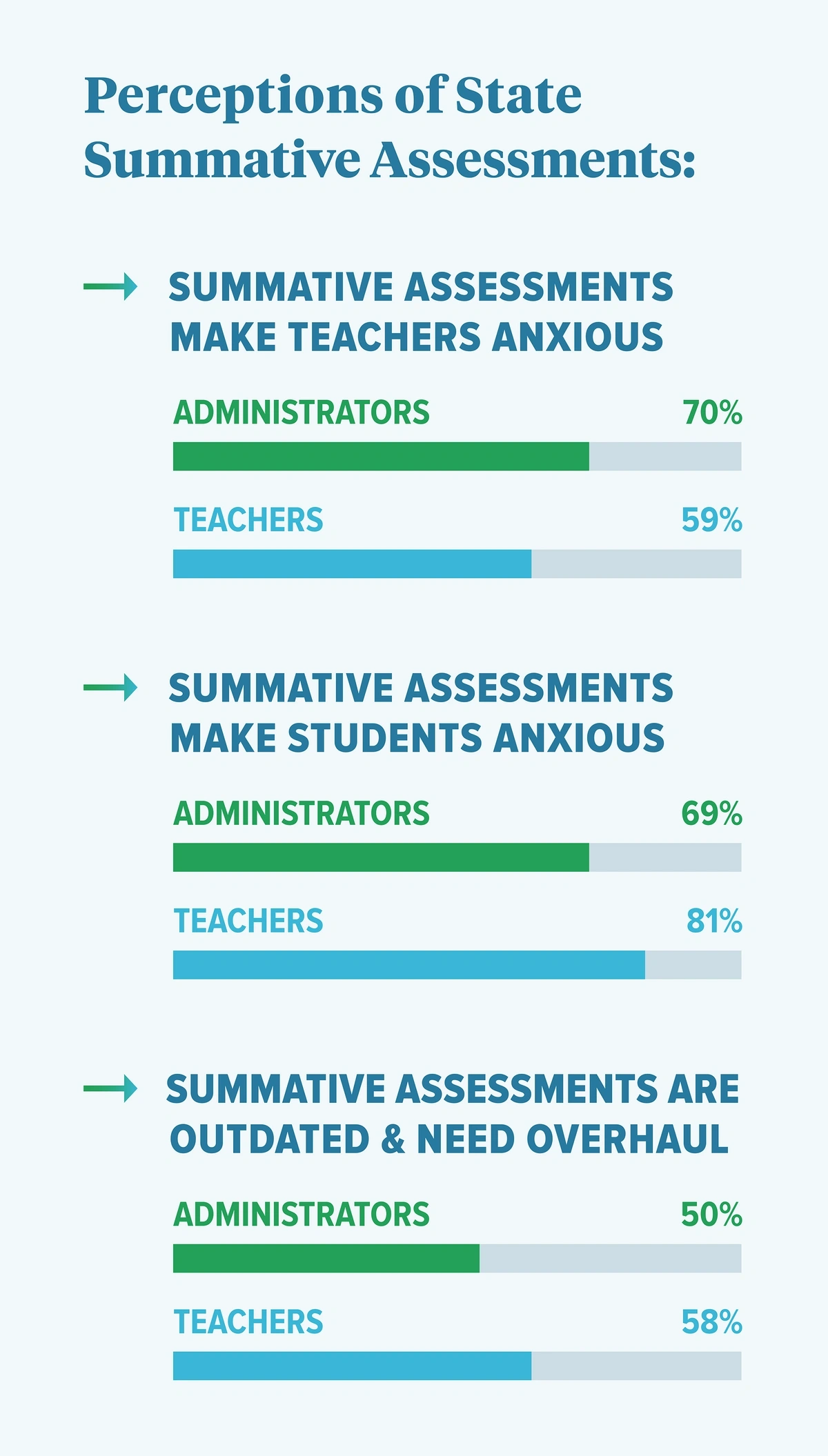
One reason for this is called Campbell’s Law . It’s the general idea that once schools tie test scores to a teacher’s pay, the teacher begins teaching to the test rather than making sure children get a well-rounded education.
Another reason for the distrust of traditional high-stakes assessments is that many believe they are classist and racist.
Several analyses have found that students from higher-income households perform better on standardized tests like the SAT and ACT.
Some accuse the test questions themselves of being skewed toward upper-class and White students.
These assessments are also proving to be an unreliable predictor of future success.
A study published in Educational Researcher showed that students’ GPA was a 5x stronger predictor of college graduation than their ACT scores.
Spurred on by complications associated with the pandemic, a few institutions removed their SAT/ACT requirements for admissions.
At Harvard, standardized tests are optional through 2026. The University of Wisconsin, Stanford University, and Miami University in Ohio—just to name a few—have adopted similar policies.
If institutions are no longer going to rely on standardized testing, what will they do instead?
The Mastery Transcript is one option.
Like the name suggests, it’s a transcript that records a student’s mastery of subjects and topics. There aren’t any traditional letter grades and it’s not a one-time view of what the student knows and is able to do.
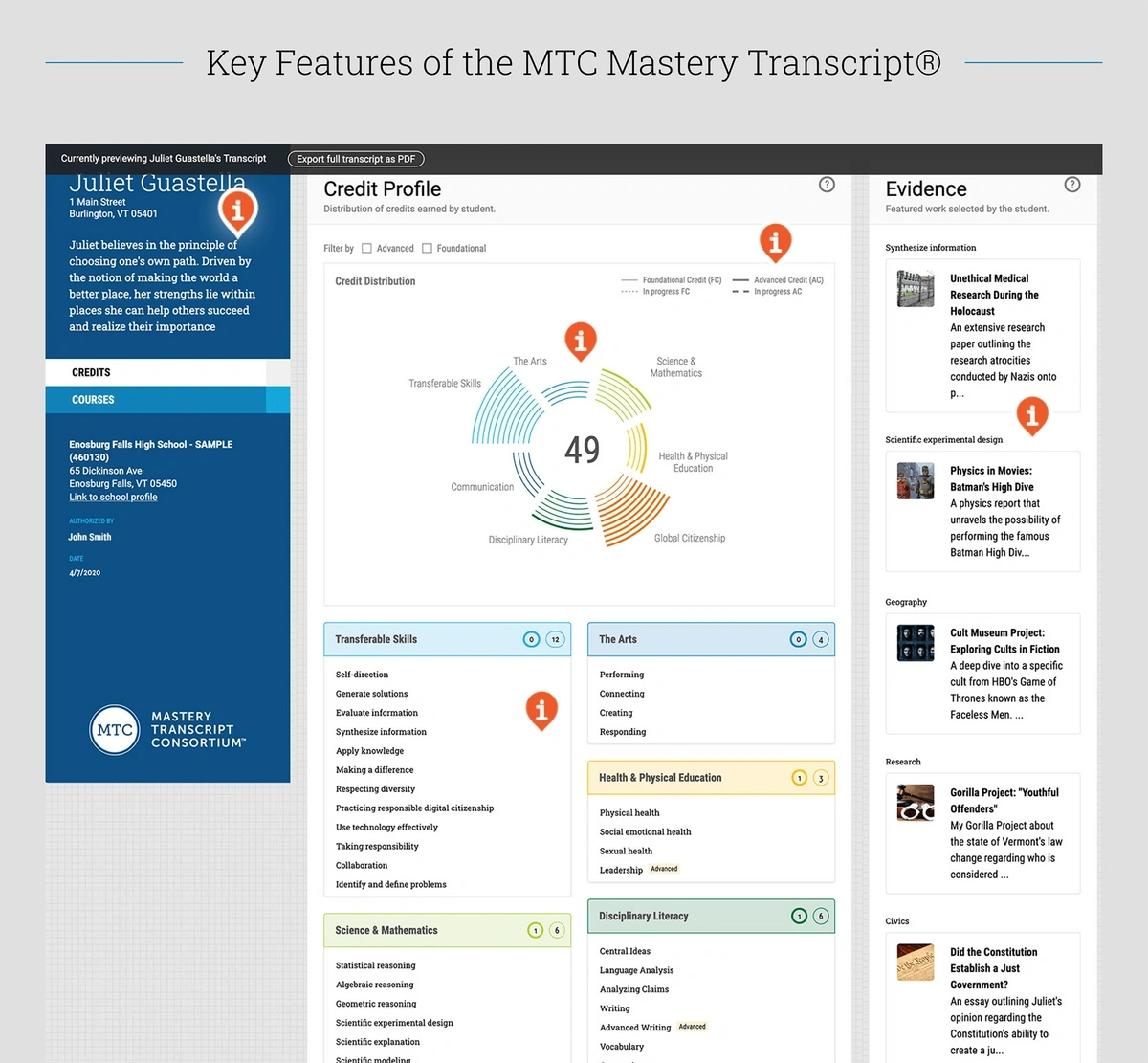
Students earn “mastery credits” and the transcript serves as an evolving sample of their work. Evidence and abilities from inside and outside the classroom is included.
This transcript is currently accepted by 250 colleges in the United States.
As for testing elementary students , public schools in New Mexico tried a variety of strategies in 2022.
The New Mexico Measures of Student Success and Achievement debuted this year with shorter tests and questions that were deemed culturally appropriate for children in New Mexico.
There were also short-cycle tests. These were assessments at the beginning, middle, and end of the year.
12. Teacher Shortage Worsens
Rand Corporation’s 2021 State of the US Teacher Survey found that 23% of teachers said they were likely to leave their current job at the end of the school year.
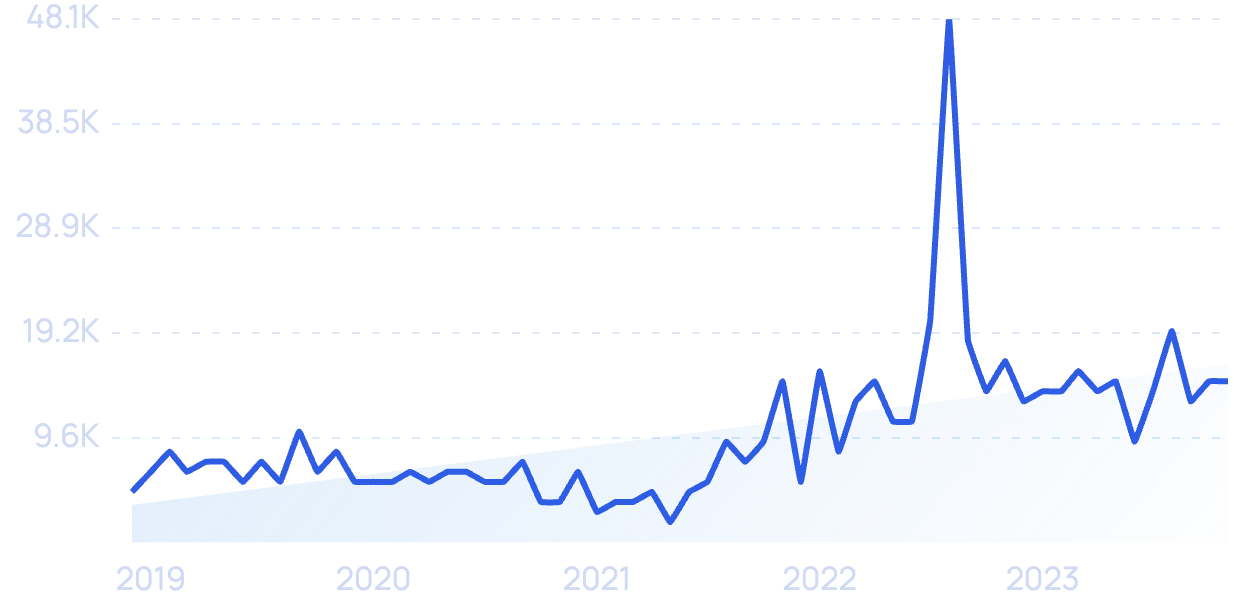
Research from EdWeek shows that 54% of teachers say they’re somewhat or very likely to leave their jobs within the next two years.
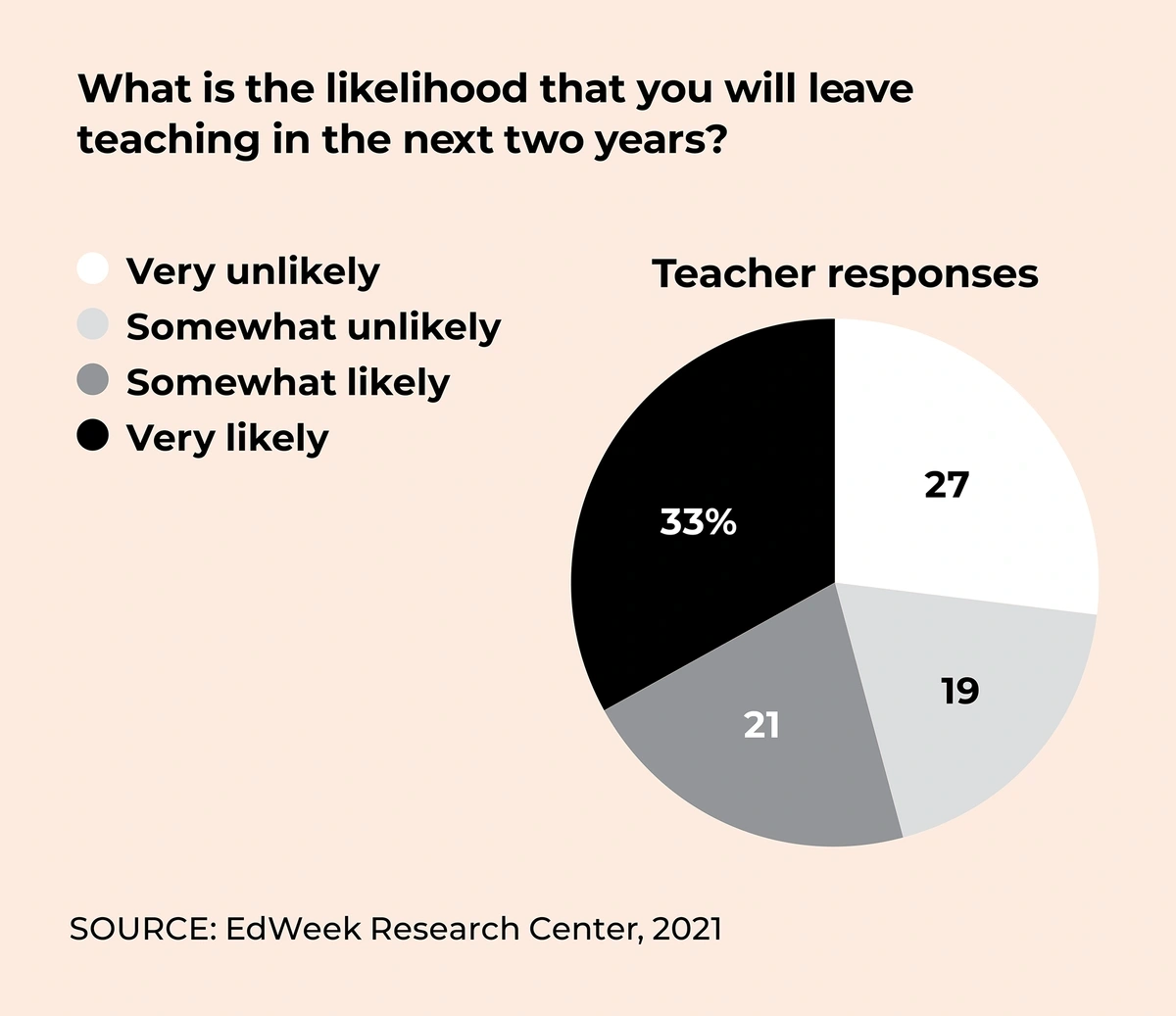
In a normal year, about 8% of teachers leave the profession.
Teacher shortages are already being felt across the country.
The US Department of Education reports that nearly every state suffers from a shortage of special education teachers. In addition, 44 states have math teacher shortages and 42 states have science teacher shortages.
Aside from the pandemic, a lack of pay is one of the top reasons why teachers leave their jobs.
In 2019, teachers were paid approximately 19% less when compared to other college-educated workers who had similar education and experience.
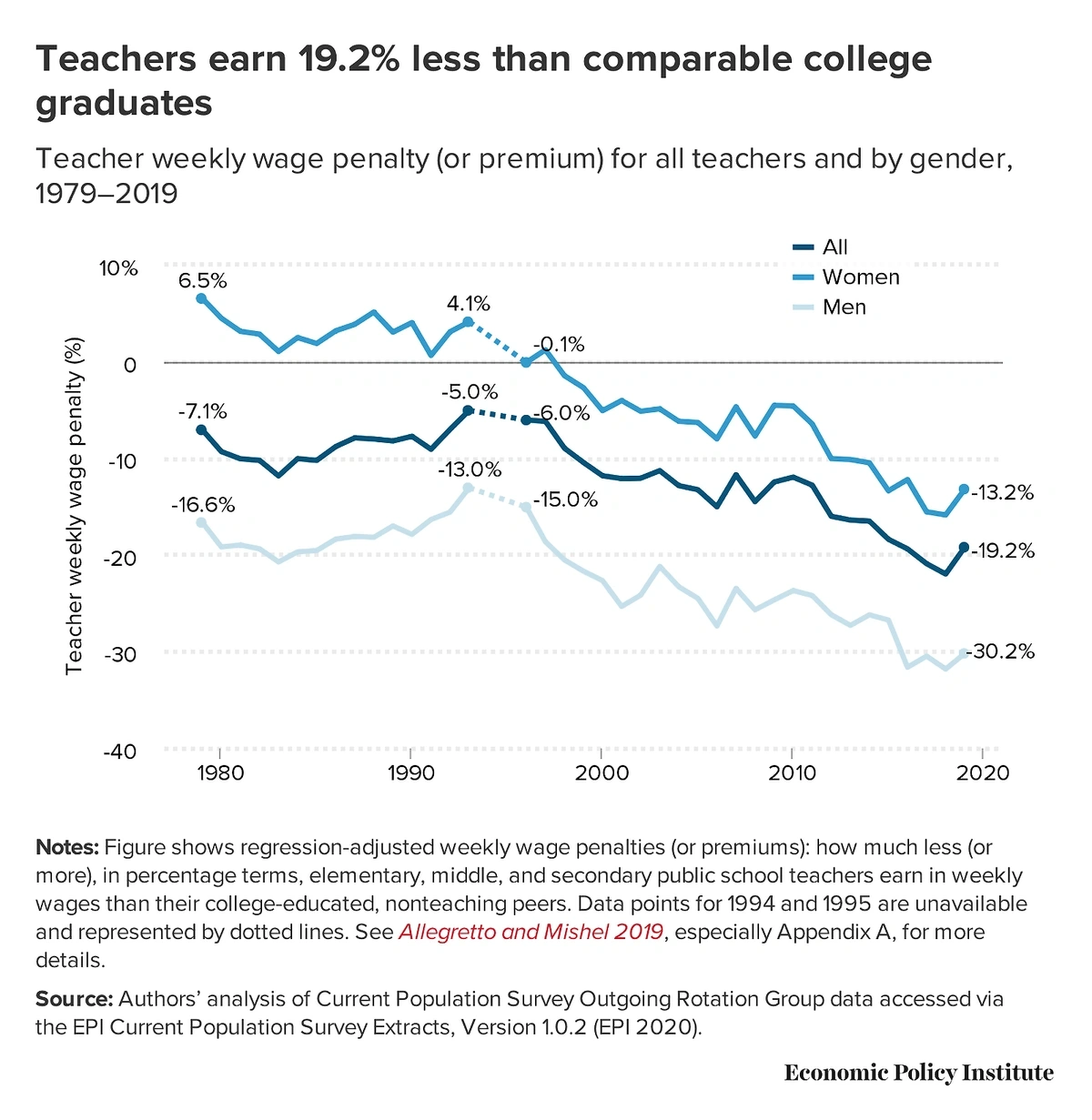
The average hourly wage for a substitute teacher was $18.47 in 2021.
Several states are working to raise teacher salaries in order to entice new teachers to join the field and keep seasoned professionals from retiring early.
In 2021, teacher pay in Alabama outpaced inflation for the first time in more than a decade. The state’s teacher pay now ranks 21st highest in the nation.
New Mexico, a state that is short 1,000 teaching staff members, enacted legislation in early 2022 that will increase teacher salaries by at least $10k.
Many other states are looking to ease their standards for teachers in order to attract professionals from different industries.
For example, the Florida legislature recently passed a bill that allows military members, even those without bachelor’s degrees, to teach in a classroom for up to five years.
Missouri, which ranks 50th in the nation in teacher pay, recently announced that the state’s Department of Elementary and Secondary Education will license teachers who score below a passing grade as long as they’ve maintained a 3.0 GPA in college and completed student teaching.
Some education professionals warn against strategies like these.
Randi Weingarten, the president of the American Federation of Teachers, said, “It’s very dangerous. It’s a good and dangerous example of the disrespect for knowledge in this country”.
That wraps up our list of the top education trends to watch in 2024-2027.
It's exciting to see where the education space is headed.
While some approaches may remain constant, new technology is expanding educational abilities without increasing costs.
At the same time, new science-based approaches to teaching are improving the learning experience for students of all ages.
Find Thousands of Trending Topics With Our Platform

An official website of the United States government
The .gov means it’s official. Federal government websites often end in .gov or .mil. Before sharing sensitive information, make sure you’re on a federal government site.
The site is secure. The https:// ensures that you are connecting to the official website and that any information you provide is encrypted and transmitted securely.
- Publications
- Account settings
Preview improvements coming to the PMC website in October 2024. Learn More or Try it out now .
- Advanced Search
- Journal List
- Springer Nature - PMC COVID-19 Collection

Current Trends (and Missing Links) in Educational Technology Research and Practice
Royce kimmons.
Brigham Young University, Provo, UT USA
It has historically been difficult to find reliable, up-to-date information about educational technology trends, such as what researchers are studying and what tools practitioners are using, thereby making it difficult for researchers and practitioners to synergize their efforts in meaningful, socially-responsive ways. In this editorial, I analyze titles and abstracts of 7708 research articles from prominent journals over the past 5 years to identify common topics—such as “online,” “mobile,” and “learning analytics.” I also extract links from 51,496 K-12 school and 1317 university websites in the U.S. to identify common tools that they are linking to—such as Facebook, Twitter, Google Docs, and YouTube. I propose that these sorts of metrics provide a baseline understanding for other researchers and practitioners to draw upon when situating their work and that they can also give us insights into areas that merit greater attention for addressing real-world problems.
It is often difficult for educational technology professionals to find reliable data on current trends in the field. This can make it challenging for stakeholders, as (a) policymakers struggle to know what technologies are being used and researched, (b) practitioners struggle to know how they should adapt to changing needs and possibilities, and (c) researchers struggle to understand diffusion patterns of promising tools and how to use them to address meaningful problems.
In addition to this difficulty, in our field we often seem to struggle to understand and articulate how our work is valuable to society, lacking the ability to solve many real problems in real settings. For instance, though the COVID-19 pandemic recently influenced rapid shifts to remote and online learning—something that educational technology professionals are technically well-equipped to support—very real emergent concerns over equity, digital inclusion, privacy, and accessibility for students of all ages reveal that we as a field could be providing better leadership in the human aspect of learning—the “educational” aspect of “educational technology” (Goldstein 2020 ; Veletsianos and Kimmons 2020 ).
Many researchers have argued for decades that our field should be more situated and socially aware (Reeves et al. 2005 ), explaining that “there is a clear need for [us] ... to take stock of who we are, what it is we do, and how and why we do it,” paying greater attention “to how digital technologies are actually being used—for better and worse—in ‘real-world’ educational settings” (Selwyn 2010 , pp. 65–66). Yet, digital divides persist in evolving forms (Dolan 2016 ), research and practice are often misaligned (Amiel and Reeves 2008 ), and even seemingly fundamental ethical and social considerations often remain conspicuously ignored (like addressing issues of discriminatory design [Benjamin 2019 ] or making school websites universally accessible for students [Kimmons and Smith 2019 ]).
In a recent study of 3 years of articles from a prominent educational technology journal, Mason ( 2018 ) found that “in a substantial portion of the discourse, there is a deep metaphor of technology as the agent or driver of social progress underlying the thinking of many authors” (p. 550), often implying that “technologies have their own autonomy and agency” (p. 545). Yet, technologies rather seem to merely exacerbate many of the deep problems we face as groups, because “the societies in which technologies are introduced are not neutral, [and] if a society or school is racist, sexist, or ableist, supposedly neutral technologies can amplify those bigotries” (Krutka et al. 2020 , p. 112).
To be clear, there are leaders in the field who have sought to address these important issues for decades (e.g., Dickson-Deane et al. 2018 ; Marri 2005 ; Mehta and Aguilera 2020 ; Selwyn 2004 ; Sulecio de Alvarez and Dickson-Deane 2018 ; Tawfik et al. 2016 ; Tufekci 2014 ; Watters 2019 ), but our overall tone can remain highly technocentric and technophilic rather than learner-centric and humanizing, wherein “the nearly constant emergence of new technologies has only created the new problem of learning to use those [specific] technologies effectively [to] support learning” (Spector 2020 , p. 834). Yet, as Spector ( 2020 ) recently argued: “We can do better as educators and educational technology researchers. We can forego the impulse to use a technology just because it is new … [and] focus on helping students learn—all students … not just the gifted or those we like or who like us or who are like us” (p. 835).
In this brief editorial, I will share some high-level results of two analyses—trending research topics among prominent educational technology research journals for the past 5 years and trending links from K-12 school and university websites in the U.S. in 2019—to show what is currently happening in educational technology, where there might be potential disconnects between research and practice, and how we might realign our emphases to better address pertinent real-world problems. These analyses rely wholly upon public data sources available through the internet (Kimmons and Veletsianos 2018 ), and though not exhaustive or representative of all contexts, they should at least provide some useful lenses for discerning what is happening (and perhaps what is missing) in educational technology.
Trending Research Topics
To understand the topics educational technology researchers have been studying over the past 5 years, I used the Elsevier Scopus ( n.d. ) API to collect all articles from the most-highly-cited journals in the field of educational technology as identified by Google Scholar ( n.d. ), which included TechTrends , Computers & Education , Educational Technology Research & Development , and 13 others. This produced 7708 articles with titles and abstracts. I then parsed each title and abstract into a list of keywords, removing stopwords (e.g., “a,” “and,” “the”), reducing words to their stems (e.g., “reading” and “reads” to “read”, “games” and “game-based” to “game”), and grouping words as positional pairs (e.g., “learning” and “environment” together for “learning environment”). Titles produced over 8500 unique keywords (e.g., “flipped,” “classroom”), while abstracts produced nearly 30,000. Reading top keywords and pairs for the current year, I excluded those that dealt with general aspects of the field (e.g., “technology,” “learning”), research methods (e.g., “case study”), participants (e.g., “teachers”), grade levels, and so forth, allowing the analysis to focus on those that dealt with specific areas of study, topics, or technologies. Top results for article titles in the current year are provided in Table Table1, 1 , and results from abstracts are provided in Table Table2. 2 . In each table, raw numbers of articles that included the keyword or pair are provided from 5 years ago, while subsequent years are represented as percentage increases or decreases from each previous year to show relative adjustments over time.
Trending technologies from school website links
Trending technologies from college and university website links
a This dataset was collected from homepages provided from a previous dataset of college and university Twitter accounts (Kimmons et al. 2017 ), so links to Twitter would be represented at close to 100% and absolute percentages may not be representative of institutional websites broadly
Trending topics from research article titles as ranked by 2019 prevalence
Trending topics from research article abstracts as ranked by 2019 prevalence
We see from these title results that the modality “online” (e.g., “online learning,” “online teaching”) has clearly been the most-researched topic over the past 5 years, followed by the modality “mobile,” and accompanied by related modalities of “e-learning,” “blended,” and “distance.” The most-researched subject areas in this time period included “language” (including “EFL”), “science,” “writing,” “reading,” and “mathematics.” The most-researched applications of technologies or approaches have included “games,” “flipped,” “learning environment,” “video,” “MOOCs, “media,” “virtual reality,” and “augmented reality,” with “data” and “learning analytics” also making the list.
When analyzing abstracts, only keyword pairs were considered, given the greater variability and volume of common words extracted from the lengthier artifacts (e.g., “student,” “education”), and keyword pairs representing generalities, research methods, participants, etc. were excluded to focus on areas of study, topics, and technologies. Again, modalities were highly represented (e.g., “online learning,” “online course,” “mobile learning,” “flipped classroom”) along with “language learning” and “foreign language” as the dominant subject areas and “social network,” “learning analytics,” and “social media” as the dominant technologies or applications.
Taken together, these title and abstract results suggest that researchers over the past 5 years (a) have focused heavily on studying learning environments as modalities (e.g., online, mobile, flipped), (b) have done so with the purpose of achieving learning goals related to language learning, science, writing, reading, and mathematics, and (c) have used various technologies toward these ends, with learning analytics, virtual reality, augmented reality, and social media being some of the most prominent (Figs (Figs1 1 & 2 .).

Trending keyword pairs from research article abstracts as ranked by 2019 prevalence
Trending Technologies from Institutional Websites
As another data source, I also parsed links from 51,496 U.S. K-12 school websites and 1317 U.S. college or university websites to attempt to determine what tools these institutions were linking to (and by extension using) with their students and communities. Because the number of unique links exhibited highly positive skew (with many sites providing very few external links), I excluded all sites below the median number of unique external links (median = 16 for K-12 schools). This resulted in the analysis of 954 K external links from K-12 sites, representing 25,889 websites, and 82 K external links from college and university sites, representing 10,682 websites.
Results indicated that the top sites that K-12 schools linked to included social media sites (e.g., Facebook, Twitter, Instagram, LinkedIn), media sharing sites (e.g., YouTube, Vimeo), a host of different Google tools (Docs, Sites, Drive, Translate, Mail), and various other tools that are designed to support school business management and communication processes (e.g., SchoolMessenger, My School Bucks, PeachJar). These results mimicked other studies on school websites, which have generally shown that schools link to free, generic, non-pedagogical tools, like YouTube, much more than fee-based or education-specific tools, like SchoolTube (Kimmons 2015 ; Kimmons et al. 2019 ). College and university websites exhibited similar prioritization of links to social media, email, and image and video sharing services, coupled with a few types of services unique to that market (e.g., virtual campus tours).
Trends and Missing Links
Though web scraping of school websites is by no means a complete measure of school use and cannot capture most pedagogical and classroom uses, differences between what is being researched and what is being used by educational institutions to communicate and share with their communities should at least make us wonder whether trending research topics actually focus on what is happening in and is useful for our institutions. Google Docs/Drive, for instance, was only mentioned in 18 abstracts (0.2%), although it was represented on 25.9% of school websites, and Facebook and Twitter were mentioned in 132 (1.7%) and 61 (0.8%) abstracts while being represented on 56.7% and 55.3% of school websites (and most college and university websites). Research emphasis on social media overall decreased in 2017 and 2018 with a modest upturn in 2019, only exhibiting half the article count of “virtual reality,” one-third that of “MOOCs,” and one-fourth that of “flipped,” and though Google Docs and other tools might be studied in articles related to collaborative writing, peer feedback, or flipped classrooms, omission of these technologies from article abstracts should at least give us pause. Does this discrepancy reveal that research is not as needed on these topics? Or that current research focuses on issues related to learning vs. specific tools? Or that a gap exists between research and practice, with researchers and journal reviewers exhibiting a technophilic flow toward the newest technologies (rather than those that are being used by institutions to solve pressing problems)?
To further explore this, we might also consider what keywords are missing from educational technology abstracts. Notably, keywords that deal with broader social issues (even those specific to educational technology) are generally missing over the past 5 years. The keyword “accessibility” was only included in 80 abstracts (1%); only 59 (0.8%) mentioned “women;” only 50 (0.6%) mentioned “privacy;” only 33 (0.4%) mentioned a “digital divide;” only 32 (0.4%) mentioned “justice;” only 27 (0.4%) mentioned “equity” or “equitable;” only 13 (0.2%) mentioned “poverty” or “impoverish;” only 9 (0.1%) mentioned “universal design;” only 8 (0.1%) mentioned “feminism” or “feminist;” only 7 (0.1%) mentioned “racial;” and only 1 mentioned “racism” or “racist,” with only about 3% of articles mentioning any of these words. As a specific example, only 8 (2.2%) of the 368 articles studying “online learning” in the past 5 years mentioned the word “accessibility” or “accessible” in their abstracts, and none mentioned privacy, which seems like a major problem. If we are studying “how to make online learning work” but not “how to make it work for all students ” or “how to protect our students while they are learning online,” then are our attentions where they should be?
Such missing links and lack of emphasis on social issues, especially in cases that should be of paramount interest to educational technology (like digital divides, accessibility, and privacy), suggests that the field may be struggling to orient its work toward solving relevant real-world problems, and researchers should consider how their efforts can more meaningfully inform socially-responsible policy and practice. Some specialized research areas and methods show focus and promise in this regard, such as “open education” or “open educational resources,” which was represented in 1.6% of abstracts, and “design research” or “design-based research,” which was represented in 1% of abstracts, but such tokens seem a pittance when compared to pressing social needs of the day.
As another promising example, in a recent special issue of TechTrends , guest editors Dickson-Deane et al. ( 2018 ) argued that “we cannot accurately understand how best to attend to issues of learning and technology without acknowledging that culture permeates all environments in which learning takes place, and every technology created and implemented reflects and is imbued with aspects of the culture(s) of its creator” (p. 310). Over the past 5 years, 6.9% of abstracts in these journals have mentioned a variant of the word “culture” (such as “sociocultural”), which, though small, suggests some growing interest and recognition of the topic’s importance to the field.
As we continue moving forward together, it is my hope to continue this editorial each March for documenting ongoing trends of educational technology as well as our growth and development as a field for the previous year. Using public data sources like these as an ongoing litmus test can potentially help us to bridge the research-practice divide and to better align research activities with emergent needs. In future versions, I plan to also include analyses of social media data and other sources to show these trends through more lenses that also account for what practitioners are sharing, what they are finding to be of value, and what problems they believe to be important. Hopefully, as we continue in this exciting and important work, we can refine these data collection processes and also refine our efforts as educational researchers and practitioners to allow for closer alignment between our research and practice efforts while also striving for greater harmony between our professional efforts and the creation of a better, more equitable world.
Publisher’s Note
Springer Nature remains neutral with regard to jurisdictional claims in published maps and institutional affiliations.
- Amiel T, Reeves TC. Design-based research and educational technology: Rethinking technology and the research agenda. Journal of Educational Technology & Society. 2008; 11 (4):29–40. [ Google Scholar ]
- Benjamin R. Race after technology: Abolitionist tools for the new Jim code. Cambridge, UK: Polity; 2019. [ Google Scholar ]
- Dickson-Deane C, Bradshaw AC, Asino TI. Recognizing the inseparability of culture, learning, and technology. TechTrends. 2018; 62 :310–311. [ Google Scholar ]
- Dolan JE. Splicing the divide: A review of research on the evolving digital divide among K–12 students. Journal of Research on Technology in Education. 2016; 48 (1):16–37. [ Google Scholar ]
- Elsevier Scopus. (n.d.). Elsevier Scopus APIs. Elsevier Developers . Retrieved from https://dev.elsevier.com/sc_apis.html
- Goldstein, D. (2020). Research shows students falling months behind during virus disruptions. The New York Times. Retrieved from https://www.nytimes.com/2020/06/05/us/coronavirus-education-lost-learning.html
- Google Scholar. (n.d.). Educational technology Google Scholar metrics. Google Scholar . Retrieved from https://scholar.google.com/citations?view_op=top_venues&vq=soc_educationaltechnology
- Kimmons R. Open online system adoption in K-12 as a democratizing factor. Open Learning: The Journal of Open, Distance and e-Learning. 2015; 30 (2):138–151. doi: 10.1080/02680513.2015.1077109. [ CrossRef ] [ Google Scholar ]
- Kimmons, R., Hunsaker, E., Jones, J. E., & Stauffer, M. (2019). The nationwide landscape of K-12 school websites in the United States: Systems, services, intended audiences, and adoption patterns. The International Review of Research in Open and Distributed Learning, 20 (3). 10.19173/irrodl.v20i4.3794.
- Kimmons, R., & Smith, J. (2019). Accessibility in mind? A nationwide study of K-12 websites in the U.S. First Monday, 24 (2). 10.5210/fm.v24i2.9183.
- Kimmons R, Veletsianos G. Public internet data mining methods in instructional design, educational technology, and online learning research. TechTrends. 2018; 62 (5):492–500. doi: 10.1007/s11528-018-0307-4. [ CrossRef ] [ Google Scholar ]
- Kimmons R, Veletsianos G, Woodward S. Institutional uses of Twitter in U.S. higher education. Innovative Higher Education. 2017; 42 (2):97–111. doi: 10.1007/s10755-016-9375-6. [ CrossRef ] [ Google Scholar ]
- Krutka DG, Heath MK, Mason LE. Editorial: Technology won’t save us – A call for technoskepticism in social studies. Contemporary Issues in Technology and Teacher Education. 2020; 20 (1):108–120. [ Google Scholar ]
- Marri A. Educational technology as a tool for multicultural democratic education: The case of one US history teacher in an underresourced high school. Contemporary Issues in Technology and Teacher Education. 2005; 4 (4):395–409. [ Google Scholar ]
- Mason L. A critical metaphor analysis of educational technology research in the social studies. Contemporary Issues in Technology and Teacher Education. 2018; 18 (3):538–555. [ Google Scholar ]
- Mehta R, Aguilera E. A critical approach to humanizing pedagogies in online teaching and learning. The International Journal of Information and Learning Technology. 2020; 37 (3):109–120. [ Google Scholar ]
- Reeves TC, Herrington J, Oliver R. Design research: A socially responsible approach to instructional technology research in higher education. Journal of Computing in Higher Education. 2005; 16 (2):96. [ Google Scholar ]
- Selwyn N. Reconsidering political and popular understandings of the digital divide. New Media & Society. 2004; 6 (3):341–362. [ Google Scholar ]
- Selwyn N. Looking beyond learning: Notes towards the critical study of educational technology. Journal of Computer Assisted Learning. 2010; 26 (1):65–73. [ Google Scholar ]
- Spector JM. Remarks on progress in educational technology. Educational Technology Research and Development. 2020; 68 :833–836. [ Google Scholar ]
- Sulecio de Alvarez M, Dickson-Deane C. Avoiding educational technology pitfalls for inclusion and equity. TechTrends. 2018; 62 :345–353. [ Google Scholar ]
- Tawfik AA, Reeves TD, Stich A. Intended and unintended consequences of educational technology on social inequality. TechTrends. 2016; 60 :598–605. [ Google Scholar ]
- Tufekci, Z. (2014). Engineering the public: Big data, surveillance and computational politics. First Monday, 19 (7).
- Veletsianos, G., & Kimmons, R. (2020). What (some) students are saying about the switch to remote teaching and learning. EDUCAUSE Review .
- Watters, A. (2019). The stories we were told about education technology (2019). Hack Education. Retrieved from http://hackeducation.com/2019/12/23/top-ed-tech-stories
- 2023 AERA in the News
- 2022 AERA in the News
- 2021 AERA In the News
- 2020 AERA In the News
- 2019 AERA In the News
- 2018 AERA In the News
- 2017 AERA In the News
- 2016 AERA In the News
- 2015 AERA In the News
- 2014 AERA In the News
- 2013 AERA In the News
- AERA Speaking Out on Major Issues
- 2023 AERA News Releases
- 2022 AERA News Releases
- 2021 AERA News Releases
- 2020 AERA News Releases
- 2019 AERA News Releases
- 2018 AERA News Releases
- 2017 AERA News Releases
- 2016 AERA News Releases
- 2015 AERA News Releases
- 2014 AERA News Releases
- 2013 AERA News Releases
- 2012 AERA News Releases
- 2011 News Releases
- 2010 News Releases
- 2009 News Releases
- 2008 News Releases
- 2007 News Releases
- 2006 News Releases
- 2005 News Releases
- 2004 News Releases
- AERA Research Archive
- Trending Topic Research Files
- Communication Resources for Researchers
- AERA Highlights Archival Issues
- AERA Video Gallery

Share
Trends and Topics in Educational Technology, 2023 Edition
- Column: Guest Editors’ Notes
- Published: 05 April 2023
- Volume 67 , pages 583–591, ( 2023 )
Cite this article
- Bohdana Allman 1 ,
- Royce Kimmons 1 ,
- Joshua Rosenberg 2 &
- Monalisa Dash 3
5588 Accesses
4 Citations
11 Altmetric
Explore all metrics
Avoid common mistakes on your manuscript.
Introduction
In this editorial, we present trends and popular topics in educational technology for the year 2022. We used a similar public internet data mining approach (Kimmons & Veletsianos, 2018 ) to previous years (Kimmons, 2020 ; Kimmons et al., 2021 ; Kimmons & Rosenberg, 2022 ), extracting and analyzing data from three large data sources: the Scopus research article database, the Twitter #EdTech affinity group, and K-12 school and district Facebook pages. This year, we also added information related to Open Educational Resources (OER), specifically data from an edtech-focused open publishing platform, EdTech Books. Our analysis provides a snapshot of educational technology trends in 2022 from four different perspectives, affording insights into what is of interest in the field as institutions, educators, learners, and researchers adjust to the post-pandemic ‘normal’ and adopt educational technologies, resources, and practices at a more mature level.
What Were Trending Topics in EdTech Journals in 2022?
Research topics in the field of educational technology in 2022 were, with a few exceptions, noticeably consistent with those of previous years (see Table 1 ; Kimmons et al., 2021 ; Kimmons & Rosenberg, 2022 ). We compiled the titles of 2699 articles from top educational technology journals ( n = 16) identified by Google Scholar and retrieved their abstracts from Scopus. Following this, we looked at the number of times each keyword and bigram (two-word phrase) appeared in the titles and abstracts of the papers to see which words were most frequently referenced. Generic word stems like “learn,” “student,” “education,” and “teach,” modalities like “online” and “digital,” and methods-related terms like “study” and “review” were the most frequently occurring words in titles. Analysis of bigrams showed recurring references to (a) educational settings, like “higher education,” (b) specific modalities like “online learning,” “virtual reality,” and “augmented reality,” and (c) methods, like “systematic review,” “meta-analysis,” and “case study.” Moreover, references to “COVID-19” understandably dropped from 2021 to 2022, while references to “online learning” continued to grow. This may imply that interest in online learning has continued and even grown beyond the pandemic. Appearance of “during+COVID” in the top 15 bigrams in EdTech article titles in 2022 suggested that researchers and practitioners were still reporting on educational practices during the pandemic.
To aid in making sense of the results, we further manually categorized keywords and bigrams into the four information types suggested by the data (contexts, methods, modalities, and topics). Context included terms related to the research settings. Methods included terms referring to research methods in the article. Modalities included terms referring to the technical modality featured in the study. Topics included terms referring to the intervention, objective, or theoretical goal of the study. The most common keywords and bigrams for each type may be found in Table 2 . Contextual bigrams like “higher education” (3.9%) and “COVID-19” (3.6%) were among the most popular bigrams used in educational technology journal article titles in 2022. When we looked specifically at the educational level, we found that references to “higher+education” (3.9%) continued to be considerably higher than to “K-12” (1.2%). The abstract analysis of context bigrams paralleled the title bigram analysis.
A closer analysis of methods mentioned in the titles suggested that the terms “systematic review” (3.1%), “case study” (2.2%), and “meta-analysis” (2%) remained the top three methods mentioned in the journal article titles, just like in previous years., followed by “literature review” (1.5%) and “systematic literature” (1.1%; see Table 2 for details). Rather than assuming that these methods were more prevalent, we recognized that researchers commonly mention these particular methods in their titles, whereas other methods are generally mentioned only in the abstract or in the body of an article. Bigram analyses of abstracts confirmed this notion, suggesting a broader coverage of distinct research approaches, such as “mixed method,” “quasi-experimental,” “randomly assigned,” “pre-post,” “systematic review,” and “meta-analysis.” Amongst the methods, bigrams “mixed method” and “quasi-experimental” occupied the leading position in journal abstracts, each carrying an equal percentage of 4.6%, whereas “systematic review” and “meta-analysis” scored 2.3% and 1.8%, respectively. These results suggested that in 2022 EdTech articles with primary data sources were published more frequently than articles using secondary data sources, although secondary data methods were more frequently mentioned in the article titles. Moreover, quantitative components (e.g., “test,” “experiment,” and “survey”) were found more frequently than qualitative components (e.g., “interview” and “qualitative”) in the 2022 EdTech journal article abstracts. Finally, several specific methods that frequently appeared in the article abstracts included “structure equation,” “thematic analysis,” “equation modeling,” “network analysis,” “data mining,” and “cluster analysis.”
When we looked at modality types, we saw that, similarly to 2021, “online learning” (3.5%) and “virtual reality” (2.7%) were the most referenced modalities mentioned in EdTech journal titles (Table 2 ). In abstracts, the occurrence of “virtual reality,” “online learning,” and “online courses” were far more common than “emergency remote” learning, clearly indicating a post-pandemic adoption of online technologies and an end of pandemic-related emergency remote learning research. Finally, the analysis of topics revealed that “computational thinking” (2.8%) and “learning environments” (2.8%) were the most-referenced bigrams in journal titles (Table 2 ). In the abstracts, the keyword “science” was used 33.9% and “language” 14.6% implying research focus in these content areas. Another noteworthy trend in the topic analysis of article abstracts was the popularity of terms related to Open Educational Resources (OER), specifically, the frequent use of terms such as “creative commons” and “cc license.”
What Were the Trending #EdTech Topics and Tools on Twitter in 2022?
We also continued to analyze trending #EdTech topics on Twitter (cf., Kimmons et al., 2021 ; Kimmons & Rosenberg, 2022 ). In 2022, #EdTech continued to be popular, and its analysis provided a window into relevant conversations, resources, and ideas that researchers and practitioners shared. We collected all English-language original tweets using the hashtag #EdTech for 2022. This included 478,269 original tweets (ignoring retweets) posted by 35,789 authors, which was 39,856 average monthly tweets. This indicated a 10.43% growth in #edtech original tweets (45,191) and average tweets (3766) from 2021, whereas the number of authors declined by 12.21% (4978; cf. Table 3 ).
The increase in total tweets indicated continuous popularity of the #edtech affinity space in general. The growth in tweets despite declining authorship suggested that the loyal authors increased their activity. Decreases in authorship could be connected to the general Twitter struggle to keep its most active users (Dang, 2022 ), but it could also be connected to uncertainties brought on by changes in Twitter ownership. Some users might have become more hesitant tweeters, fearing and anticipating changes in the platform’s nature and culture. Others may have abandoned the platform completely for more deeply-rooted reasons (Sweney, 2022 ). In the future, changes in Twitter ownership may even impact this report. Shifts in the platform’s business model may make data collection less feasible and analyzed information may become less useful.
We also looked at the most popular #EdTech co-occurring hashtags in two categories: audience and topics (see Table 4 ). #edchat remained the most popular co-occurring hashtag in the audience category. Other top hashtags from 2021 representing audience, such as #edutwitter, #teachers, #edtechchat, #students, #highered, and #k12, remained in the top 10 but slightly changed ranking. Interestingly, many top co-occurring hashtags (#edchat, #highered, #k12, #school, #highereducation) experienced at least a 15% reduction in the number of tweets and at least a 20% decrease in authorship. Another noteworthy trend is the appearance of more specialized, audience-related hashtags, such as #homeschool, #homeschooling, #suptchat, and #iste, in the top 50. Such differentiation in hashtag usage may reflect evolving users’ needs and desires (Kimmons & Veletsianos, 2016 ; Veletsianos, 2017 ).
The most popular topic by number of tweets in 2022 was #byjus, a hashtag associated with an educational technology company from India. In spite of its popularity (108,794 or 22.75% of all #edtech tweets), the low diversity score (0.62%) indicated that this hashtag was used by relatively few accounts at high frequencies, likely a result of focused marketing campaigns. This points to the fact that the Twitter space, and #edtech space in particular, can be unduly influenced by corporate influences and marketing. To keep these outliers from our dataset, we determined popularity first through sorting by number of users, then we sorted the top 200 by number of tweets.
We saw similar trends in co-occurring topics. The top ten topics slightly changed order but remained popular overall. The top two hashtags, #education and #learning, remained top ranking, but both experienced a significant loss of total tweets and number of authors. Other top hashtags, such as #technology, #stem, #teaching, and #innovation, had both fewer tweets and fewer authors. The exception was #ai, which had 2908 (25.7%) more tweets despite 484 (22.9%) fewer authors. This may not be a surprising trend as #ai has been gaining popularity in recent years. Other hashtags, such as #artificialintelligence, #machinelearning, #ML, and #mlearning, also appeared in the list. We can probably anticipate a sharp rise in this subgroup’s activity, including #chatGTP and related hashtags, in the #EdTech space in 2023.
As with the audience co-occurring hashtags, there was a clear pattern of emerging specialized topic-related hashtags that modified previously popular ones. For example, the popular term #stem evolved to include #steam, #stemeducation, #stemed, and #womeninstem appearing in the top 100. This differentiation and increased related hashtag usage could be one reason for decreased tweet count for top hashtags in 2022: greater specialization yields lower numbers in the general tags. Users gravitated to related, more specialized hashtags to create more focused dialogic spaces. Additionally, looking at the overall trends in both the audience and topic co-occurring hashtags, we noticed that diversity (#dei, #inclusion, #diversity, #quality, #equity), women (#womenintech, #womeninstem, #womenempowerment), and English language learning (#esl, #tefl, #efl, #elt, #tesol) became increasingly important in the #EdTech space. This specific type of differentiation may reflect the rising importance of these issues to the audience.
Another important trend in the #EdTech space this year was related to COVID-19 hashtags. In 2020, the most popular co-occurring hashtags after #education and #edchat were #remotelearning, #onlinelearning, #elearning, and #distancelearning, making up 11.47% (15,114 tweets by 4600 authors). These hashtags remained very popular in 2021, and together with #virtuallearning, #blendedlearning, #onlineeducation, and #digitallearning made up 16.10% (69,737 tweets by 10,611 authors) of #EdTech, while dropping to a mere 9% (43,034 tweets by 5910 authors) in 2022 (see Fig. 1 ). Clearly, conversations on Twitter paralleled a shift in perspective as we transitioned from the pandemic years. Of note, #elearning and #onlinelearning remained relatively popular (31,029 tweets or 72.1% of the 2022 subset). These two hashtags are more general and may represent the post-pandemic transition into accepting online learning environments and digital courseware (Seaman & Seaman, 2022a ). On the other hand, #remotelearning and #distancelearning, hashtags closely tied to COVID-19 emergency learning, significantly decreased in usage (76.6% and 69.2%, respectively) in 2022.
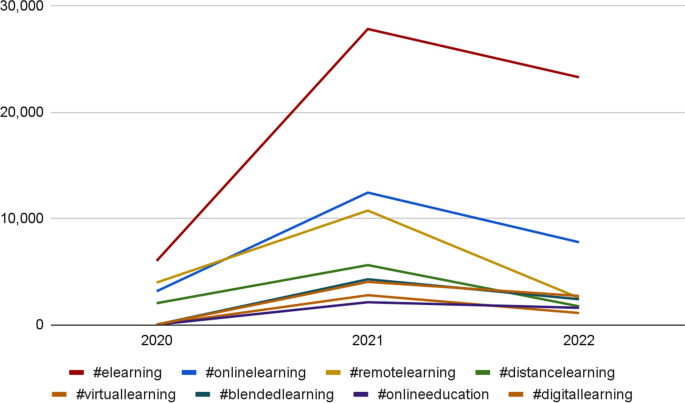
COVID-19 Related Tweets in the #EdTech Affinity Space
Our #EdTech tweet analysis also examined attached external links. We found that 454,258 (95.0%) tweets included either an external link or an embedded media item (e.g., an image). Similarly, as in the past, prominent external links included news sites ( edsurge.com , edtechmagazine.com , eschoolnews.com ), specifically those connected to India ( timesofindia.indiatimes.com , financialexpress.com , and indiaeducationadiary.com ). Multimedia resources ( youtube.com ), file-sharing platforms ( drive.google.com ), and other social media ( linkedin.com ) links were also among the most common external links. Noteworthy among the top shared external links is the increased popularity of links to learning resource sites, such as oodlu.org , shakeuplearning.com , ilearn2.co.uk , and freetech4teachers.com .
What Were Trending Topics among School and School District Facebook Groups in 2022?
To understand which technologies were shared on school and district Facebook pages, we examined the domain names for all the hyperlinks posted by 16,309 publicly accessible pages. To carry out this analysis, we searched the homepages of all of the schools and school districts in the U.S. for links to Facebook pages. We then uploaded the links to Facebook pages we found to the CrowdTangle platform Footnote 1 to access publicly available posts for 2020–2022 and identified the domains of websites linked within schools’ and districts’ posts; more information on the data collection approach is provided in Rosenberg et al. ( 2022 ). The ten most-shared domains broken down by year (2020, 2021, and 2022) are presented in Table 5 . The n represents the number of schools or districts sharing one or more links to these domains, and the percentage is the proportion of pages sharing one or more links that year. Thus, 9705 is the frequency with which links to YouTube were shared in 2020, and the percentage indicates that 60% of schools and districts with publicly accessible Facebook pages posted one or more links to YouTube over the year.
Looking across the years, we found that domains shared were largely consistent, with Google services—YouTube, Google Docs, and Google Drive—being the most shared in 2020, 2021, and 2022. We note that a greater proportion of districts shared links to YouTube in 2020 than in 2021 and 2022, possibly due to fewer activities being recorded and shared during the months following the beginning of the COVID-19 pandemic, specifically, late 2019 and early 2020. After Google services, links to Zoom were commonly shared the fourth-most across all three years, though the number of districts sharing Zoom links decreased from 26% in 2020 and 21% in 2021 to 11% in 2022—like fewer links to YouTube, a suggestion that districts were carrying out fewer activities remotely. Links to the CDC were the eighth-most shared in 2020, but such links were not in the top ten in 2021 and 2022. Apart from these, the domains shared were similar in makeup and frequency across years, showing the importance of tools for carrying out digital work and productivity as well as tools to facilitate event sign-ups (SignUpGenius), school-parent communication (Smore), and book and sports ticket sales (Scholastic and GoFan).
What Were Trends in EdTech Open Educational Resources (OER) in 2022?
In addition to Scopus and social media trends, we also examined an EdTech-focused Open Educational Resource (OER) platform EdTech Books ( https://edtechbooks.org ). OER are “teaching, learning, and research materials that reside in the public domain or have been released under an open license that permits their free use and re-purposing by others” (Creative Commons, 2020 ). OER can take various forms and sizes, including textbooks, lessons, courses, learning activities, assessments, technologies, syllabi, images, presentations, videos, and graphics. Being ‘open’ means that OER are freely accessible to anyone with internet access and can be retained, reused, redistributed, revised, and remixed as needed (Wiley, n.d. ), providing significant opportunities for improving “the quality and affordability of education for learners everywhere” (Wiley & Hilton, 2018 , p. 144). Research has repeatedly shown that OER quality is comparable to commercial resources (Clinton & Khan, 2019 ; Kimmons, 2015 ), and their adoption does not negatively impact student learning (Hilton, 2016 ; Hilton, 2019 ) while saving students money (Clinton, 2018 ; Hilton, 2016 ; Ikahihifo et al., 2017 ) and providing a variety of other benefits (Kimmons, 2016 ).
Though a shift to OER over the years has been slower than many would like (Seaman & Seaman, 2022b ), and research on adoption patterns is problematized by an absence of central controlling agencies and systems, the field of educational technology may be somewhat ahead of the curve when compared to many other fields (cf., Rosenberg, 2023 ). The emergence of OER platforms like EdTech Books, Pressbooks, and LibreTexts supports this notion. For this year’s OER analysis, we selected EdTech Books as the authors are most familiar with this platform and have ready access to data. We believe that as an EdTech-focused platform, EdTech Books analytics may provide valuable insights into user behavior and how OER are developed, adopted, and used in our field.
In 2022, ETB provided free OER to more than 1.4 million users worldwide. A perusal of the most popular books or journal issues (Table 6 ), chapters (Table 7 ), and search terms revealed that readers seemed to be drawn to these resources when they were seeking information on broad theoretical aspects of educational technology (e.g., cognitivism, constructivism, sociocultural theory), technology-specific guidance (e.g., how to use Blooket, MySQL, or Photopea), or research and evaluation materials (e.g., sampling procedures or survey design), and analysis of end-of-chapter quality assurance ratings (similar to e-commerce five-star reviews) revealed that readers generally found the provided OER to be “High Quality” (3.0 = “Moderate Quality,” 4.0 = “High Quality,” 5.0 = “Very High Quality”).
Some of these works were peer-reviewed, while others were not. Some chapters and books were authored by professional scholars, while others were authored by students as part of open pedagogical learning projects (cf. Casey et al., 2023 ). Notably, some of the most-used and highest-quality OER in EdTech Books were authored by students or were published without peer review. This trend suggests the need to rethink peer reviews as a sole indicator of quality (Woodward et al., 2017 ; Kimmons, 2015 ), potentially including triangulation of data points, such as quality assurance ratings, citations and dissemination rates, times remixed, accessibility, usefulness, and prestige of adopting organizations.
Additionally, one of the stated goals of EdTech Books (and OER more broadly) is to improve access to learning opportunities for people all over the world. Analysis of readers’ country of origin and device type (Fig. 2 ) revealed that EdTech Books resources were heavily used throughout the world and accessed on a variety of devices. The top users of the site were the United States (33.8%), the Philippines (16.6%), and India (6.7%), with each other country accounting for 2.7% or less of total traffic. Moreover, more than one-third of users accessed resources on mobile devices, underscoring the importance of mobile-first design when creating OER because, in many countries, mobile devices with limited internet access are the norm for online-enabled learning.

Most Common Countries and Device Types of ETB Users for 2022
Summary and Discussion
The analysis of 2022 edtech-related data from Scopus, Twitter, Facebook, and EdTech Books provided triangulated snapshots of the state of the educational technology field in 2022. Additionally, comparisons of the 2022 data trends to trends from previous years afforded additional insights into developments, directions, and shifts as the EdTech field responds to past and current events. We observed several noteworthy patterns, such as the general stability of trends in the field, specific post-pandemic shifts, the maturation of specialized topics, and emerging areas of interest. We hope that researchers and practitioners find the overall trends useful and those focusing on specific areas find the more detailed analyses of topics and terms helpful.
First, we found that the overall patterns across the platforms remained similar to previous years. The emphasis remained on “e-learning” and “online learning” in Scopus and on Twitter and Facebook. We continued to see a keen interest in emergent technologies, such as artificial intelligence and virtual/augmented reality, in Scopus data and on Twitter. It is possible that these topics are not as frequently mentioned on school and district Facebook pages because they serve a different communication function than Twitter and Scopus (schools-to-families vs. scholars-to-scholars). Rather than exchanging the latest technology ideas and tips among researchers and practitioners, school and district Facebook pages serve as a day-to-day communication tool and an information hub between schools (teachers and administrators) and families (students and parents). As in previous years, the school and school district Facebook page analysis and the Twitter external link analysis highlighted the continuous predominance of digital services by a single tech company: Google. Indeed, tools such as YouTube, Google Docs, and Google Drive have been widely adopted and have become intrinsic to any technology-related activities.
Second, not surprisingly, the analysis revealed a strong post-pandemic shift across the data on all three platforms: Scopus, Twitter, and Facebook. The Twitter data analysis suggested a sharp decline in COVID-19-related terms usage, including technology terms like “remote teaching.” Facebook data clearly indicated a shift from remote learning (a decline in remote technology use) to in-person activities (an increase in sports and events). Despite this shift, we saw increased references to online and hybrid learning across all three platforms, suggesting more ubiquitous use of these technologies and practices within existing educational systems as a supplement rather than a wholesale replacement (e.g., Seaman & Seaman, 2022a , b ). Additionally, the appearance of “COVID-19,” “online learning,” and “during COVID” bigrams in Scopus data suggested that researchers are still reporting on EdTech activities during the pandemic.
Third, among other trends, Twitter data analysis suggested the maturation and specialization of topics reflective of evolving users’ needs and desires. Many popular hashtags remained at the top in 2022. However, the number of their tweets dropped, and new, yet related hashtags noticeably appeared at the top. For example, #stem evolved to include #steam, #stemeducation, #stemed, and #womeninstem. Such development suggests users’ understanding of hashtag functionality and responsiveness to the dynamic social media landscape. As hashtags become popular and mature, they may lose their differentiating power, and users start coining related hashtags to create more specialized spaces. As a related trend, we saw the emergence of diversity, women, and English language learning hashtags on Twitter this year, possibly suggesting that these issues are becoming increasingly important to the EdTech community.
In response to the commentaries from previous editorials, this year’s analysis indicates that many technology-related changes initiated during the pandemic may influence longer-term shifts, such as the increased interest in and normalization of online and blended learning. In addition, our OER analysis suggests that there is an appetite for resources to support both theoretical and practical work in educational technology and that the quality of resources available to professionals at all levels may be indicated by a variety of emergent methods beyond historic reliance on peer review and expertise (e.g., consider the widespread use and perceived quality of student-generated OER). As educational technology professionals grapple with this new reality in a world that increasingly requires focused guidance for our professionals worldwide, we should continue to move the field in directions that are responsive to the needs of a global educational technology community, in terms of topics, resources, contexts, formats, and accessibility.
https://crowdtangle.com
Casey, C. C., Goodsett, M., Hoover, J. K., Robertson, S., & Whitchurch, M. (2023). Open Pedagogy. EdTechnica: The Open Encyclopedia of Educational Technology . https://edtechbooks.org/encyclopedia/open_pedagogy
Clinton, V. (2018). Savings without sacrifices: A case study of open-source textbook adoption. Open Learning: The Journal of Distance and Open Learning, 33 (3), 177–189.
Article Google Scholar
Clinton, V., & Khan, S. (2019). Efficacy of open textbook adoption on learning performance and course withdrawal rates: A meta-analysis. AERA Open, 5 (3), 1–20. https://doi.org/10.1177/2332858419872212
Creative Commons (2020). Open education. https://creativecommons.org/about/program-areas/education-oer
Dang, S. (2022, October 26). Exclusive: Twitter is losing its most active users, internal documents show. Reuters. https://www.reuters.com/technology/exclusive-where-did-tweeters-go-twitter-is-losing-its-most-active-users-internal-2022-10-25/
Hilton, J. (2016). Open educational resources and college textbook choices: A review of research on efficacy and perceptions. Educational Technology Research and Development, 64 (4), 573–590. https://doi.org/10.1007/s11423-016-9434-9
Hilton, J. (2019). Open educational resources, student efficacy, and user perceptions: A synthesis of research published between 2015-2018. Educational Technology Research and development. https://doi.org/10.1007/s11423-019-09700-4
Ikahihifo, T. K., Spring, K. J., Rosecrans, J., & Watson, J. (2017). Assessing the savings from open educational resources on student academic goals. The International Review of Research in Open and Distance Learning, 18 (7). https://doi.org/10.19173/irrodl.v18i7.2754
Kimmons, R. (2015). OER quality and adaptation in K-12: Comparing teacher evaluations of copyright-restricted, open, and open/adapted textbooks. The International Review of Research in Open and Distributed Learning, 16 (5).
Kimmons, R. (2016). Expansive openness in teacher practice. Teachers College Record, 118 (9).
Kimmons, R. (2020). Current trends (and missing links) in educational technology research and practice. TechTrends, 64 (6), 803–809.
Kimmons, R., & Rosenberg, J. M. (2022). Trends and topics in educational technology, 2022 edition. TechTrends, 66 (2), 134–140.
Kimmons, R., & Veletsianos, G. (2016). Education scholars’ evolving uses of twitter as a conference backchannel and social commentary platform. British Journal of Educational Technology, 47 (3), 445–464. https://doi.org/10.1111/bjet.12428
Kimmons, R., & Veletsianos, G. (2018). Public internet data mining methods in instructional design, educational technology, and online learning research. TechTrends, 62 (5), 492–500. https://doi.org/10.1007/s11528-018-0307-4
Kimmons, R., Rosenberg, J., & Allman, B. (2021). Trends in educational technology: What Facebook, twitter, and Scopus can tell us about current research and practice. TechTrends, 65 , 125–136.
Rosenberg, J. M. (2023). Open and useful? An exploration of the science education resources on OER Commons. Contemporary Issues in Technology and Teacher Education.
Rosenberg, J. M., Borchers, C., Stegenga, S. M., Burchfield, M. A., Anderson, D., & Fischer, C. (2022). How educational institutions reveal students’ personally identifiable information on Facebook. Learning, Media and Technology, 1–17. https://www.tandfonline.com/doi/full/10.1080/17439884.2022.2140672
Seaman, J. E. & Seaman, J. (2022a). Coming back together: Educational resources in U.S. K-12 education, 2022 . https://www.bayviewanalytics.com/reports/k-12_oer_comingbacktogether.pdf
Seaman, J. E. & Seaman, J. (2022b). Turning point for digital curricula: Educational resources in U.S. higher education, 2022. https://www.bayviewanalytics.com/reports/turningpointdigitalcurricula.pdf
Sweney, M. (2022, December 13). Twitter ‘to lose 32m users in two years after Elon Musk takeover.’ The Guardian. https://www.theguardian.com/technology/2022/dec/13/twitter-lose-users-elon-musk-takeover-hate-speech
Veletsianos, G. (2017). Three cases of hashtags used as learning and professional development environments. TechTrends, 61 , 284–292. https://doi.org/10.1007/s11528-016-0143-3
Wiley, D. (n.d.). Defining the “open” in open content and open educational resources. Retrieved from http://opencontent.org/definition/ . Accessed 1 Feb 2023.
Wiley, D., & Hilton, J. L., III. (2018). Defining OER-enabled pedagogy. The International Review of Research in Open and Distributed Learning, 19 (4). https://doi.org/10.19173/irrodl.v19i4.3601
Woodward, S., Lloyd, A., & Kimmons, R. (2017). Student voice in textbook evaluation: Comparing open and restricted textbooks. The International Review of Research in Open and Distributed Learning, 18 (6). https://doi.org/10.19173/irrodl.v18i6.3170
Download references
Author information
Authors and affiliations.
Brigham Young University, Provo, UT, USA
Bohdana Allman & Royce Kimmons
University of Tennessee, Knoxville, TN, USA
Joshua Rosenberg
Brajrajnagar College, Sambalpur University, Burla, India
Monalisa Dash
You can also search for this author in PubMed Google Scholar
Corresponding author
Correspondence to Royce Kimmons .
Additional information
Publisher’s note.
Springer Nature remains neutral with regard to jurisdictional claims in published maps and institutional affiliations.
Rights and permissions
Reprints and permissions
About this article
Allman, B., Kimmons, R., Rosenberg, J. et al. Trends and Topics in Educational Technology, 2023 Edition. TechTrends 67 , 583–591 (2023). https://doi.org/10.1007/s11528-023-00840-2
Download citation
Published : 05 April 2023
Issue Date : May 2023
DOI : https://doi.org/10.1007/s11528-023-00840-2
Share this article
Anyone you share the following link with will be able to read this content:
Sorry, a shareable link is not currently available for this article.
Provided by the Springer Nature SharedIt content-sharing initiative
- Find a journal
- Publish with us
- Track your research
School suspensions and exclusions put vulnerable children at risk
Managing problematic student behaviour is one of the most persistent, challenging, and controversial issues facing schools today. Yet despite best intentions to build a more inclusive and punitive-free education system, school suspensions and expulsions remain.
Now, new research from the University of South Australia shows that exclusionary practices not only fail to identify the deep-rooted causes of challenging student behaviours but exacerbate negative issues rather than resolve them.
Lead researcher, UniSA's Professor Anna Sullivan, says schools face difficult decisions around suspensions and expulsions.
"Suspensions and expulsions have been the mainstay of schools' behaviour management practices for decades, regardless of research finding that they are ineffective for disciplining bad behaviours," Prof Sullivan says.
"In fact, there is a clear relationship between school suspensions and a range of detrimental health outcomes, including alienation from school, involvement with antisocial peers, use of alcohol and smoking, and a lower quality of school life -- and this contributes to a higher risk of dropping out of school and possible illegal behaviour.
"What makes things worse is that vulnerable students have a higher risk of being suspended or expelled, which in many cases exacerbates their circumstances and life chances.
"Boys, Aboriginal students, students from low SES backgrounds, and students with a disability are disproportionately excluded from schools.
"There is a distinct blind spot about how school suspensions and expulsions perpetuate wider social inequalities.
"Schools and policy makers must look beyond challenging behaviours to understand what is contributing to the cause -- rather than treating the effect -- and it's this missing information that's needed to develop new school policies."
Analysing the recently reviewed NSW Student Behaviour Strategy, researchers found that while there was more behaviour support and management, the new iterations still included punitive practices.
"When a student is suspended or expelled from school, we're ultimately removing them from their education and limiting their life outcomes. And knowing that vulnerable groups are more at risk, these exclusion policies are ultimately discriminatory," Prof Sullivan says.
"We also see situations where children with disabilities -- some on prescribed medications -- are being excluded from school on the basis that 'they have problems already'. As a consequence, exclusion appears to be a reasonable solution given schools do not have the time, expertise or resources to manage complex and challenging behavioural needs.
"Adding to such deficit thinking is removing a 'problem child' from the learning environment of others. Instead of helping these students, the policies are exacerbating their struggles.
"What we need is more listening, more empathy to students at risk, and a willingness to challenge the impact of wider social inequalities including poverty, race, housing, and unemployment on the most vulnerable people in society. These things do not operate in isolation; they affect families and children and cannot simply be left at the school gate.
"It's time to look afresh at the complex and challenging circumstances in which many young people find themselves. Only then can we hope to create a more inclusive and fair education system."
Notes to editors:
- Published paper: Down, B., Sullivan, A., Tippett, N., Johnson, B., Manolev, J., & Robinson, J., (2024). What is missing in policy discourses about school exclusions?, Critical Studies in Education , DOI: 10.1080/17508487.2024.2312878
…………………………………………………………………………………………………………………………..
Media contact: Annabel Mansfield M: + 61 479 182 489 E: @unisa.edu.au" title="mailto:[email protected]">[email protected]
Researcher : Prof Anna Sullivan E: @unisa.edu.au" title="mailto:[email protected]">[email protected]
- Educational Psychology
- K-12 Education
- Child Psychology
- Educational Policy
- Poverty and Learning
- STEM Education
- Education and Employment
- Sex education
- Intellectual giftedness
- Social movement
- Early childhood education
- Visual system
- Schizophrenia
Story Source:
Materials provided by University of South Australia . Note: Content may be edited for style and length.
Journal Reference :
- Barry Down, Anna Sullivan, Neil Tippett, Bruce Johnson, Jamie Manolev, Janean Robinson. What is missing in policy discourses about school exclusions? Critical Studies in Education , 2024; 1 DOI: 10.1080/17508487.2024.2312878
Cite This Page :
Explore More
- Quantum Effects in Electron Waves
- Star Trek's Holodeck Recreated Using ChatGPT
- Cloud Engineering to Mitigate Global Warming
- Detecting Delayed Concussion Recovery
- Bonobos: More Aggressive Than Thought
- Brightest Gamma-Ray Burst
- Stellar Winds of Three Sun-Like Stars Detected
- Fences Causing Genetic Problems for Mammals
- Ozone Impact On Fly Species
- Parkinson's: New Theory On Origins and Spread
Trending Topics
Strange & offbeat.
Read our research on: Gun Policy | International Conflict | Election 2024
Regions & Countries
6. teachers’ views on the state of public k-12 education.
Overall, teachers have a negative view of the U.S. K-12 education system – both the path it’s been on in recent years and what its future might hold.
The vast majority of teachers (82%) say that the overall state of public K-12 education has gotten worse in the last five years. Only 5% say it’s gotten better, and 11% say it has gotten neither better nor worse.
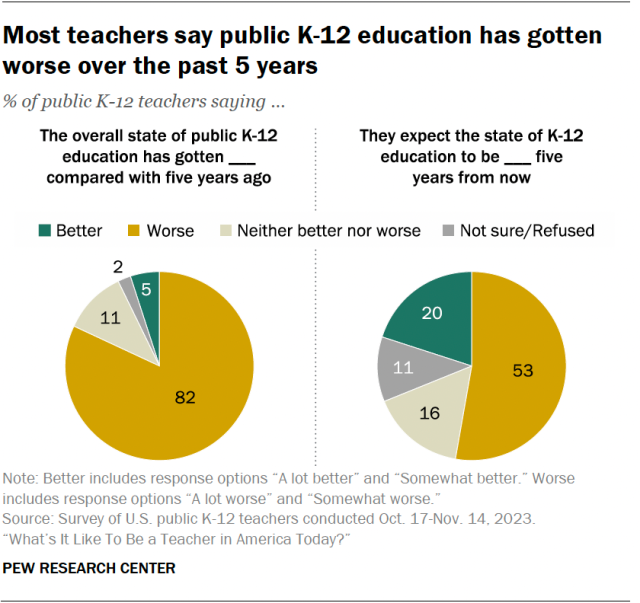
Looking to the future, 53% of teachers expect the state of public K-12 education to be worse five years from now. One-in-five say it will get better, and 16% expect it to be neither better nor worse.
We asked teachers who say the state of public K-12 education is worse now than it was five years ago how much each of the following has contributed:
- The current political climate (60% of teachers say this is a major reason that the state of K-12 education has gotten worse)
- The lasting effects of the COVID-19 pandemic (57%)
- Changes in the availability of funding and resources (46%)
Elementary school teachers are especially likely to point to resource issues – 54% say changes in the availability of funding and resources is a major reason the K-12 education system is worse now. By comparison, 41% of middle school and 39% of high school teachers say the same.
Differences by party
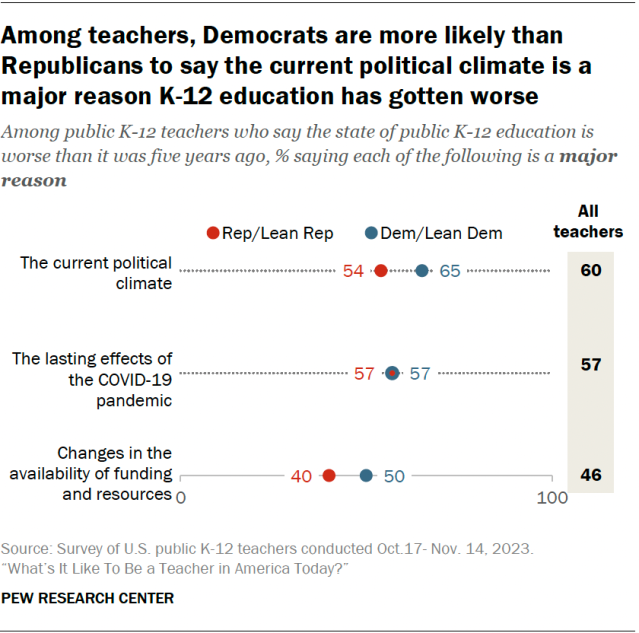
Overall, teachers who are Democrats and Democratic-leaning independents are as likely as Republican and Republican-leaning teachers to say that the state of public K-12 education is worse than it was five years ago.
But Democratic teachers are more likely than Republican teachers to point to the current political climate (65% vs. 54%) and changes in the availability of funding and resources (50% vs. 40%) as major reasons.
Democratic and Republican teachers are equally likely to say that lasting effects of the pandemic are a major reason that the public K-12 education is worse than it was five years ago (57% each).
K-12 education and political parties
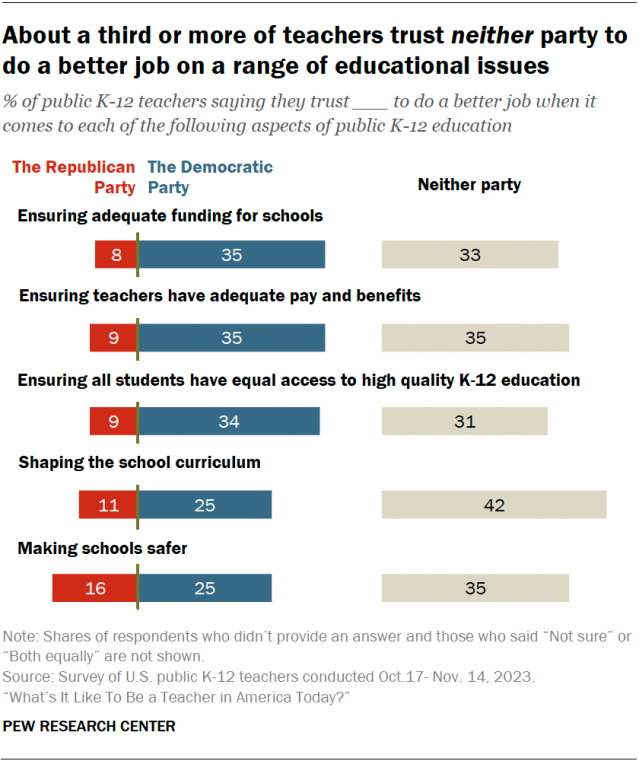
We asked teachers which political party they trust to do a better job on various aspects of public K-12 education.
Across each of the issues we asked about, roughly a third or more of teachers say they don’t trust either party to do a better job. In particular, a sizable share (42%) trust neither party when it comes to shaping the school curriculum.
On balance, more teachers say they trust the Democratic Party to do a better job handling the things we asked about than say they trust the Republican Party.
About a third of teachers say they trust the Democratic Party to do a better job in ensuring adequate funding for schools, adequate pay and benefits for teachers, and equal access to high quality K-12 education for students. Only about one-in-ten teachers say they trust the Republican Party to do a better job in these areas.
A quarter of teachers say they trust the Democratic Party to do a better job in shaping the school curriculum and making schools safer; 11% and 16% of teachers, respectively, say they trust the Republican Party in these areas.
Across all the items we asked about, shares ranging from 15% to 17% say they are not sure which party they trust more, and shares ranging from 4% to 7% say they trust both parties equally.
A majority of public K-12 teachers (58%) identify with or lean toward the Democratic Party. About a third (35%) identify with or lean toward the GOP.
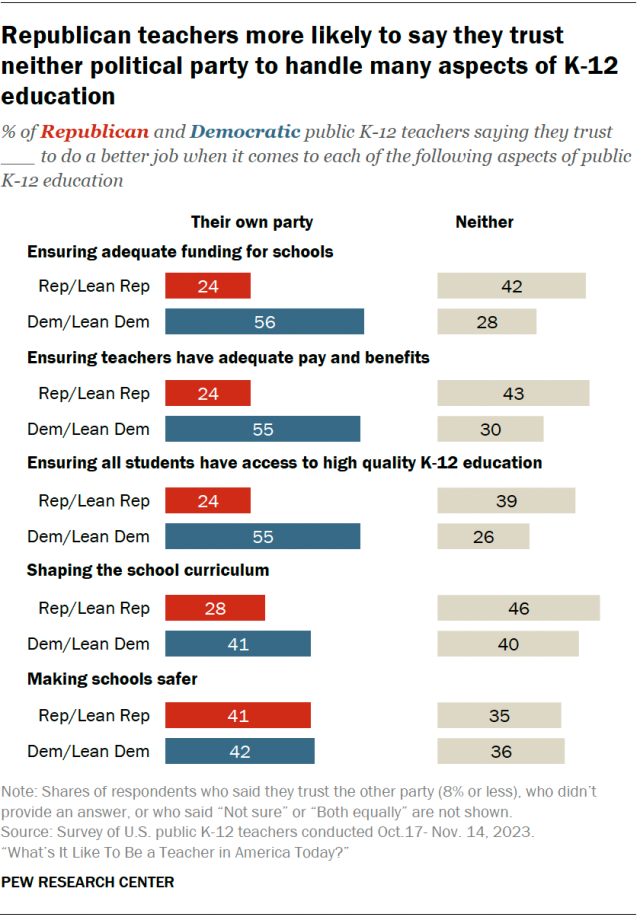
For each aspect of the education system we asked about, both Democratic and Republican teachers are more likely to say they trust their own party to do a better job than to say they trust the other party.
However, across most of these areas, Republican teachers are more likely to say they trust neither party than to say they trust their own party.
For example, about four-in-ten Republican teachers say they trust neither party when it comes to ensuring adequate funding for schools and equal access to high quality K-12 education for students. Only about a quarter of Republican teachers say they trust their own party on these issues.
The noteworthy exception is making schools safer, where similar shares of Republican teachers trust their own party (41%) and neither party (35%) to do a better job.
Social Trends Monthly Newsletter
Sign up to to receive a monthly digest of the Center's latest research on the attitudes and behaviors of Americans in key realms of daily life
Report Materials
Table of contents, ‘back to school’ means anytime from late july to after labor day, depending on where in the u.s. you live, among many u.s. children, reading for fun has become less common, federal data shows, most european students learn english in school, for u.s. teens today, summer means more schooling and less leisure time than in the past, about one-in-six u.s. teachers work second jobs – and not just in the summer, most popular.
About Pew Research Center Pew Research Center is a nonpartisan fact tank that informs the public about the issues, attitudes and trends shaping the world. It conducts public opinion polling, demographic research, media content analysis and other empirical social science research. Pew Research Center does not take policy positions. It is a subsidiary of The Pew Charitable Trusts .
Rick Hess Straight Up
Education policy maven Rick Hess of the American Enterprise Institute think tank offers straight talk on matters of policy, politics, research, and reform. Read more from this blog.
Is Education Research Too Political?

- Share article
On Monday, I talked with departing Institute of Education Sciences Director Mark Schneider, who just wrapped up his six-year term. In our conversation, he argued for newer and better research centers at IES, along with a heightened commitment to producing timely and accessible reports. Well, as anyone who knows Mark well can attest, he almost always has more to say. I thought I’d reach back out and see if he had anything else he wanted to get off his mind. Here is Part Two of our conversation.
Rick: On Monday, you mentioned that Marguerite Roza, Emily Oster, and Sean Reardon are doing good, serious work on education topics and releasing it in a timely fashion. Can you say a bit about what they’re doing right and why NCES isn’t meeting that need?
Mark : As noted on Monday, the most telling example is the collection of school-level finance data. Not only are these data required by law, they are also among the most important pieces of information needed to understand the distribution of resources and to relate detailed expenditure data to school outcomes. But despite years of pressure—from Jim Blew, who headed the policy division of ED during the last few years of the DeVos era, from me, and from many others—NCES has never produced timely district financial data and has yet to produce complete school-by-school financials. District financials are released more than two years after the close of the fiscal year, and school-by-school financial pilot data dating back to FY18 have not yet been released. Looking ahead, NCES has promised to release its first set of complete FY22 school-level financials at the end of 2024—again, over two years after the close of the fiscal year . Assuming NCES meets its promise—a risky bet, given past missed deadlines—this would be “fast” by government standards—but far too slow to meet real-world needs.
Rick : What’s responsible for this?
Mark: Much of the problem is that NCES uses an antiquated approach to data collection, issuing a uniform survey that doesn’t match up to different state systems and then waiting for all submissions before releasing datasets. In contrast, teams from Georgetown, Brown, Stanford, and others grab data directly from the source and then convert them into a more standardized format. Teams then release the state-by-state files as they are available instead of holding it all until the very last state has a clean file. The process is far faster. For instance, Georgetown’s NERD$ site—run by Roza—is posting FY23 school-by-school financial files for some states in as few as six to eight months after the close of the fiscal year. With the quick turnaround, district leaders can, for example, marry the finance data with Stanford’s SEDA performance data and use it to inform decisions during the next budget season.
Rick : OK. So, what’s some of this other work that you flagged?
Mark : Similarly, Emily Oster’s work on school closures during the pandemic was released faster than NCES’s and its coverage was more comprehensive. In part because of NCES’s lagging performance, I was able to get additional money from Congress to set up the School Pulse Survey, which has finally given NCES a tool for gathering close to real-time information about conditions in schools. Fair warning, though: NCES calls it “experimental,” which means they are lying in wait to encumber it with more and more statistical tests that will likely delay the release of the data.
Oster and Sean Reardon have also been far ahead of NCES in gathering and releasing detailed data on student performance. Reardon’s Educational Opportunity Project presents detailed and timely information about COVID-related learning loss and recovery. Oster is also working on releasing more detailed and extensive data on student assessment from all states. To this point, they have released data through 2023. In contrast, NCES’s EdFacts promised the 2022 data in December 2023, but it’s not been released yet. Here’s an additional wrinkle: Oster did her work with one salaried employee and a team of undergrads. EdFacts costs around $13 million per year.
Rick : I’ve been struck that, during Secretary Cardona’s tenure, political appointees have gotten far more involved in the release of NAEP results and used the releases to promote administration talking points more than they have in past administrations. How concerned should we be about IES getting caught up in our partisan divides?
Mark: I was both lucky and happy to serve during both the Trump and Biden administrations. Although appointed by Trump, I have found that most of my dealings with senior leaders appointed by Biden have been quite good. But will that political distance and professionalism hold in a second administration of either major candidate? The signs are not good. For instance, IES has an advisory board called the National Board of Education Sciences, or NBES. When the Obama administration was on its way out the door, it tried to fill NBES with their appointees. However, the commissions were never fully executed, and the Trump administration refused to honor the unfinished appointments. Both administrations were within their legal rights to take these actions—but we will still need to see what political ramifications follow.
When I assumed the IES director’s role about halfway through the Trump administration, there were few people on the board, all holdovers from the Obama administration. It was very hard to get the White House to pay attention to the open seats, and I was only able to get three people, all high quality, appointed to the board. At the end of 2020, on his way out the door, Trump appointed a whole bunch of people to the board, many of whose qualifications raised eyebrows. When Biden took office, those commissions had not been finalized, leaving the board consisting of the three people I was able to get appointed. One morning, each of them received an email saying that they had to resign by the end of the day or be fired. The administration then appointed 14 people to the 15-person board. I fear that if the Republicans win the presidency this fall, they will fire the board and replace it with people more to their liking, making what should be a nonpartisan science board highly politicized. I can’t help but wonder if that will lead to the politicization of the director’s tenure.
Rick: Looking outside of IES, it certainly feels to me like the professional education research organizations have become increasingly ideological over the years. Is that a valid criticism? If so, what might help?
Mark: I agree. In 1996, mathematics professor Alan Sokal published the paper “ Transgressing the Boundaries: Towards a Transformative Hermeneutics of Quantum Gravity ” as a hoax to show the shallowness of postmodern critical theory. When he wrote it, I’m sure he was hoping to put an end to that line of work. But, as James Meigs notes in a 2021 Commentary piece: “Sokal meant his essay as a parodic warning. Twenty-five years later, it appears that the Sokal Hoax was actually an instruction manual.” Rick, as you recall, for years, as the AERA annual conference approached, you would go through the program and identify what you considered the most bizarre takes on education. I’m not sure that you could do this today, since you’d have to publish just about the entire program.
Rick: Oh, man, that takes me back. Yeah, I eventually gave that up. I’d hoped that shame could help discourage some of the sillier stuff, but it felt, like you note, that the silly stuff won out. Why is that?
Mark: Education research is highly ideologically driven. If DEI has affected more established and rigorous sciences, which it has, then what can we expect from a far weaker scientific field such as ours? As Meigs noted about Sokal’s paper turning into an instruction manual, I guess your lists could be viewed as a guide to the future work in education.
Rick: Here’s a final question. If you could leave your successor at IES with one piece of advice, what would it be?
Mark: My daughter told me that she learned this parable while in business school.
A new executive is meeting with the executive she is replacing and asks for advice. The outgoing exec says, “I left three envelopes in the desk drawer. Open them sequentially as crises emerge.”
Sure enough, at the inevitable first crisis, the new exec opened the first envelop, which read: “Blame your predecessor.” At the second crisis, the exec opened the second envelop, which read: “Apologize and swear to do better.” Then the third crisis showed up, and the third envelop read: “Write three letters.”
When I pass the baton, I hope that I have gotten IES a little further down the track than people expected. But the race is long, there’s a lot of work left unfinished, and the demand for accountability and innovation won’t go away any time soon.
Oh, and finally, the next director should pray that we don’t have another pandemic. While there are many reasons we should hope never to see a pandemic again, from a narrow perspective, COVID punched a two-year hole in my tenure, limiting what I was able to accomplish.
The opinions expressed in Rick Hess Straight Up are strictly those of the author(s) and do not reflect the opinions or endorsement of Editorial Projects in Education, or any of its publications.
Sign Up for EdWeek Update
Edweek top school jobs.

Sign Up & Sign In


COMMENTS
The impact of poverty on education. The use of student data to inform instruction. The role of parental involvement in education. The effects of mindfulness practices in the classroom. The use of technology in the classroom. The role of critical thinking in education.
10. An Authoritative Study of Two High-Impact Learning Strategies. Spacing and retrieval practices are two of the most effective ways to drive long-term retention, confirms an authoritative 2022 review spanning hundreds of studies on the topic—and students should know how and why the strategies are effective. In the review, researchers ...
Find the best education research topics for your thesis, dissertation, or paper. Explore topics on school, online, and Ph.D. education, as well as topics related to Covid-19, homework, and learning. See examples of research questions, titles, and methods for each topic.
The 10 Most Significant Education Studies of 2023. Following our annual tussle with hundreds of studies of merit, we've pared them down to 10 you shouldn't miss—from what AI can (and can't) do to the neuroscience of brain synchrony. For those of us hoping for a quiet, back-to-normal kind of year, the research coming out of 2023 might ...
3. The Surprising Power of Pretesting. Asking students to take a practice test before they've even encountered the material may seem like a waste of time—after all, they'd just be guessing. But new research concludes that the approach, called pretesting, is actually more effective than other typical study strategies.
HGSE research, coursework, and expertise ranges widely across education topics. Browse the full list of topics or view our in-depth coverage of Climate Change and Education. From world-class research to innovative ideas, our community of students, faculty, and alumni is transforming education today.
In the Center for Universal Education, our scholars take stock of the trends, policies, practices, and research that they'll be closely keeping an eye on this year and likely in the many to come ...
October 2021. Each year, for the past four years, Education Week has produced a special report on big ideas in K-12 education. The reports focus on important and timely issues that schools have ...
That is true across all subjects, including education. For this article, we decided to explore the 20 most accessed dissertation titles from ProQuest Dissertations & Theses Global (PQDT Global). Preview the list below. Our reasoning was two-fold: First, dissertations research topics tend to reflect original and cutting-edge thinking in their field.
Empowering Individuals: Promoting Health Literacy through Curriculum and Science Communication. A multidisciplinary journal that explores research-based approaches to education for human development. It focuses on the global challenges and opportunities education faces, ultimately aiming to i...
This editorial continues our annual effort to identify and catalog trends and popular topics in the field of educational technology. Continuing our approach from previous years (Kimmons, 2020; Kimmons et al., 2021), we use public internet data mining methods (Kimmons & Veletsianos, 2018) to extract and analyze data from three large data sources: the Scopus research article database, the ...
The education world is changing faster than ever. Thanks in large part to improving technology and new research-led learning approaches, the education space was seeing a rapid shift towards high-tech approaches. Here is a list of the top 12 trends to watch in the education space. 1. Neuroeducation Makes Inroads.
Trending Topic Research Files. Anti-racist education ensures that every student receives an education that is truthful and free from bias in a supportive setting. Bullying presents one of the greatest health risks to children, youth, and young adults in U.S. society today. School safety, including the prevention is bullying, is a top national ...
What Were Trending Topics in EdTech Journals in 2022? Research topics in the field of educational technology in 2022 were, with a few exceptions, noticeably consistent with those of previous years (see Table 1; Kimmons et al., 2021; Kimmons & Rosenberg, 2022).We compiled the titles of 2699 articles from top educational technology journals (n = 16) identified by Google Scholar and retrieved ...
Here is a list of topics for your inspiration: Impact of Online Learning on Student Engagement and Academic Performance. Effectiveness of Project-Based Learning in Promoting Critical Thinking Skills. Socioeconomic Status and Access to Quality Education. Virtual and Augmented Reality in Enhancing the Learning Experience.
current trends in education: A review of research topics in the Problems of Education in the 21st Century journal. Problems of Education in the 21 st Century , 81 (2), 258-268.
Education research is the intersection of multiple different disciplines, and includes a large group of researchers and academic journals. ... Last, we identify the development trends of core topics in the education field. Our main contribution is the quantitative methodological design for examining the hot topics and evolution of education ...
Trending Research Topics. To understand the topics educational technology researchers have been studying over the past 5 years, I used the Elsevier Scopus API to collect all articles from the most-highly-cited journals in the field of educational technology as identified by Google Scholar (), which included TechTrends, Computers & Education, Educational Technology Research & Development, and ...
Abstract: This research aims to identify the trends in the field of science education, during the last decade. Generally, these trends are compatible with the developments in the field of science education, which mostly emphasize teaching practices and methods. Similar projects have been carried out during previous decades, focusing on research ...
STEM. Trending Topic Research File. Science, Technology Engineering, and Mathematics (STEM) is one of the most talked about topics in education, emphasizing research, problem solving, critical thinking, and creativity. The following compendium of open-access articles are inclusive of all substantive AERA journal content regarding STEM published ...
5 Data Points To Identify The Most Popular Trends In Education. 1. Popular search engine data (e.g., Google, Bing, etc.) [objective] 2. TeachThought search data [objective] 3. Traffic and search trends within and across popular education websites [objective] 4. Social media metrics [objective]
In this editorial, we present trends and popular topics in educational technology for the year 2022. We used a similar public internet data mining approach (Kimmons & Veletsianos, 2018) to previous years (Kimmons, 2020; Kimmons et al., 2021; Kimmons & Rosenberg, 2022), extracting and analyzing data from three large data sources: the Scopus research article database, the Twitter #EdTech ...
review of the current trends in ECE and identified 10 approaches which reflect areas where ongoing research and practitioner -oriented resources indicate promising outcomes for young children. These approaches are summarized as follows; also included are resources which help to orient the reader to their metho dologies.
Managing problematic student behavior is one of the most persistent, challenging, and controversial issues facing schools today. Yet despite best intentions to build a more inclusive and punitive ...
Overall, teachers have a negative view of the U.S. K-12 education system - both the path it's been on in recent years and what its future might hold. The vast majority of teachers (82%) say that the overall state of public K-12 education has gotten worse in the last five years. Only 5% say it's gotten better, and 11% say it has gotten ...
To this point, they have released data through 2023. In contrast, NCES's EdFacts promised the 2022 data in December 2023, but it's not been released yet. Here's an additional wrinkle: Oster ...